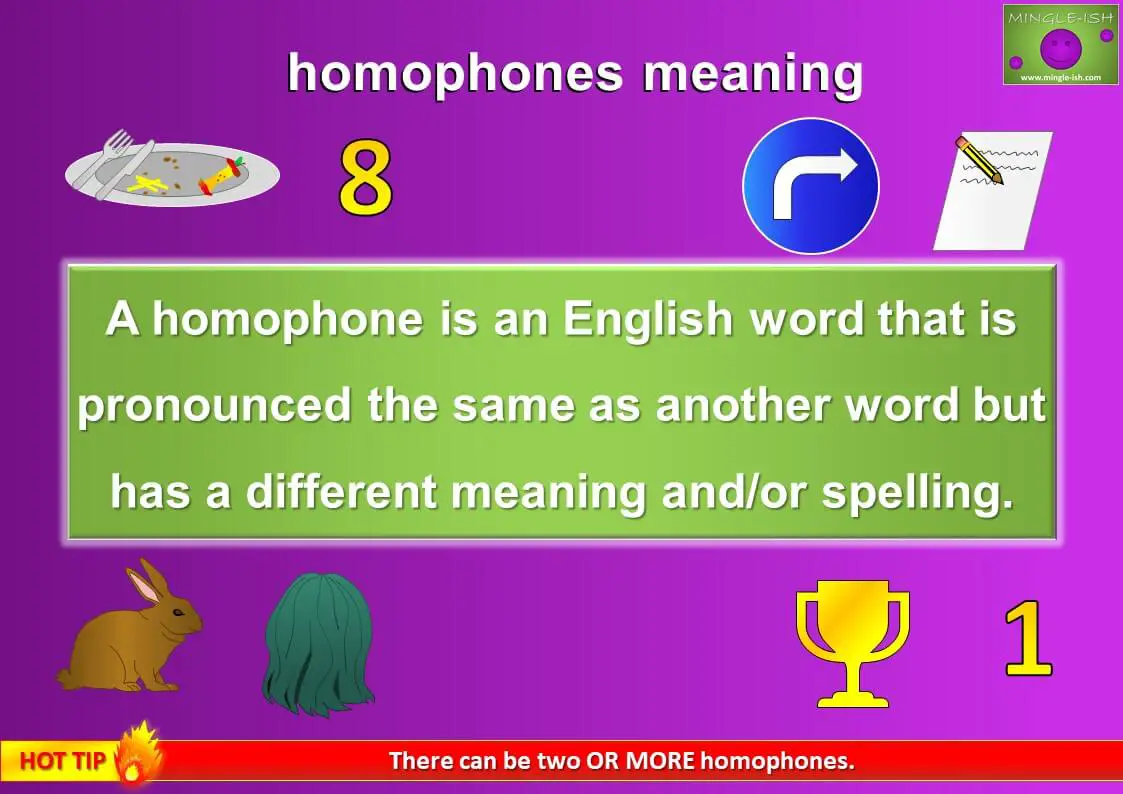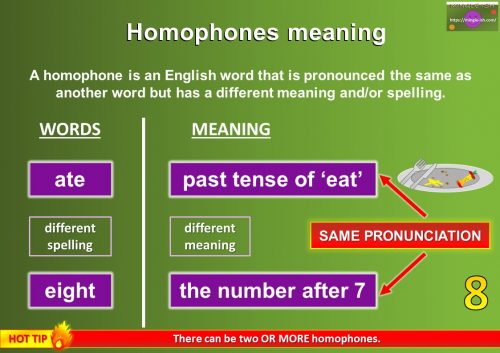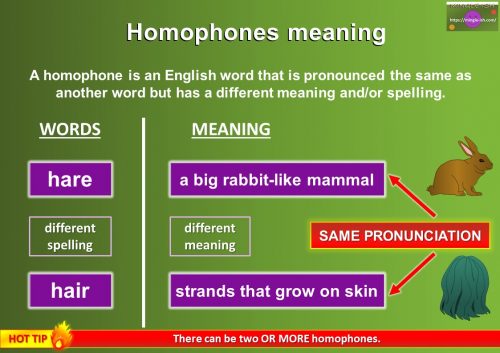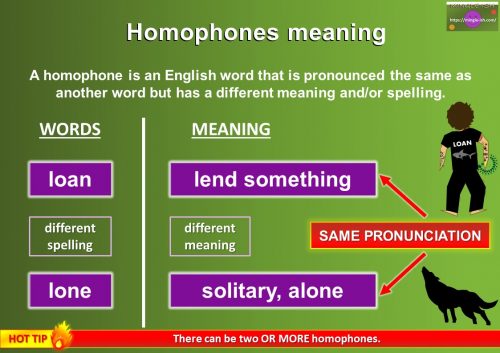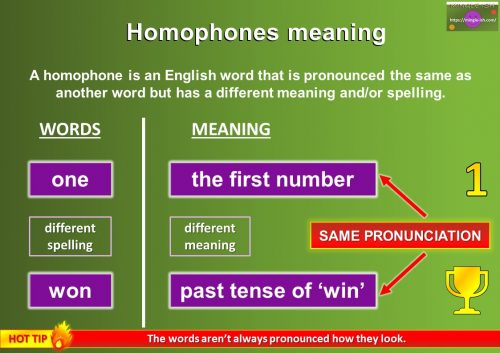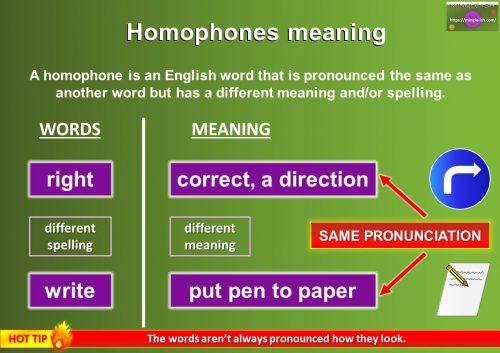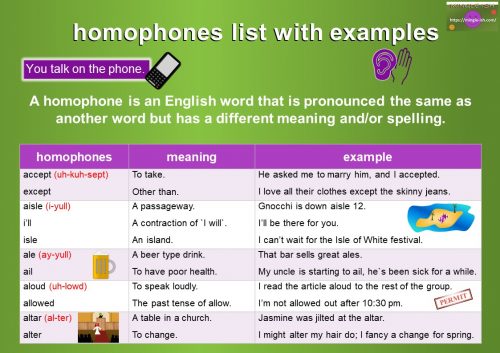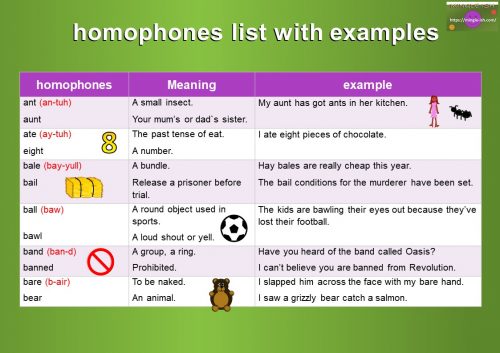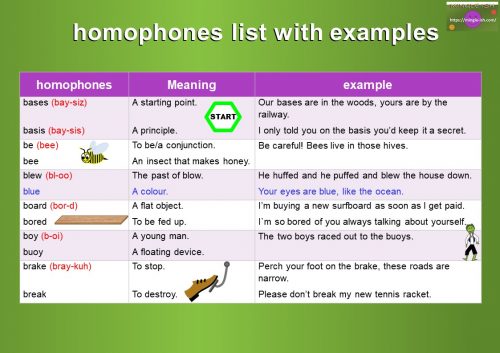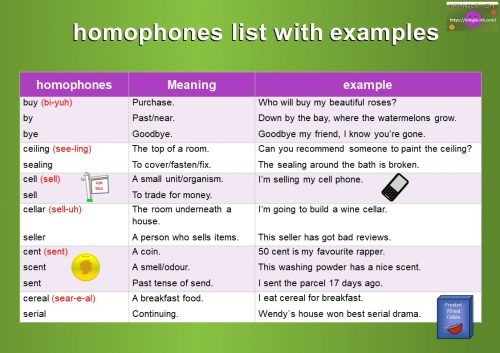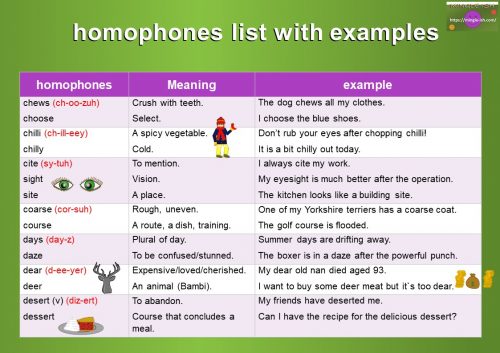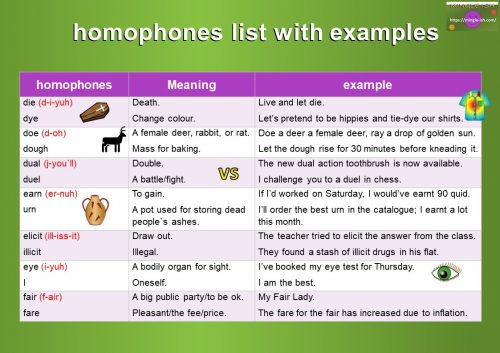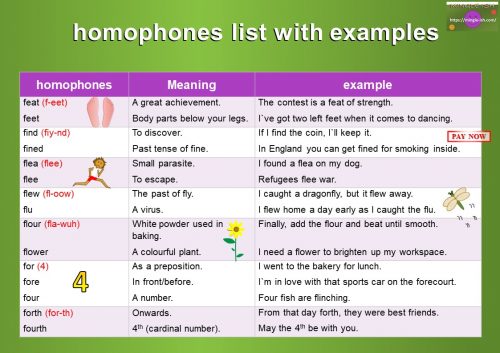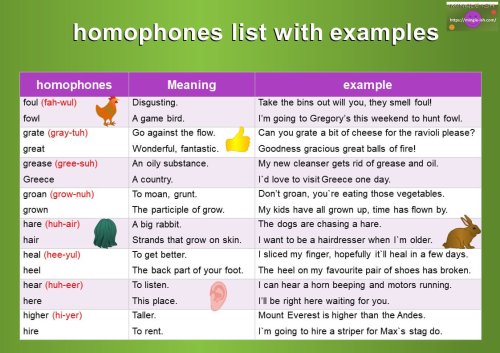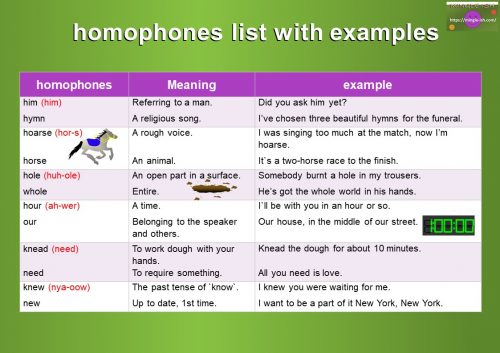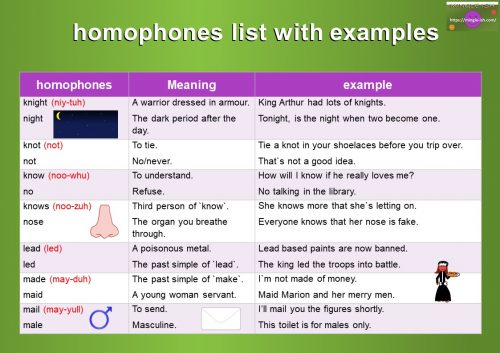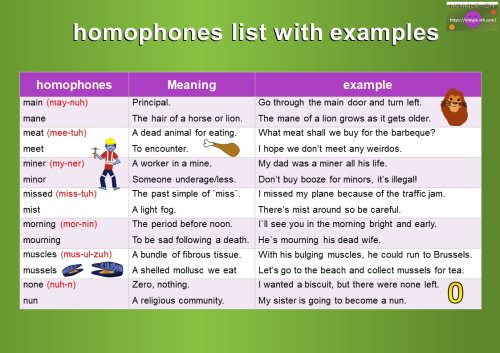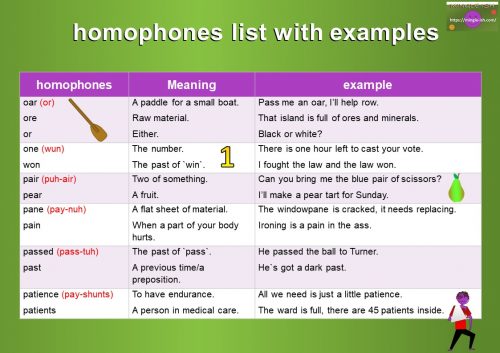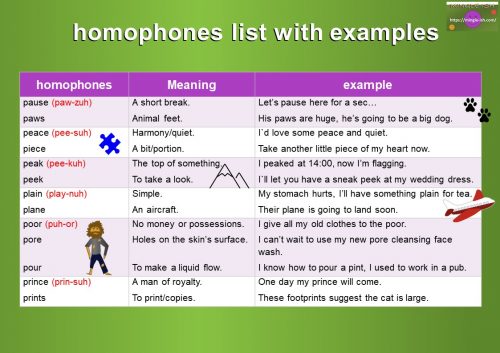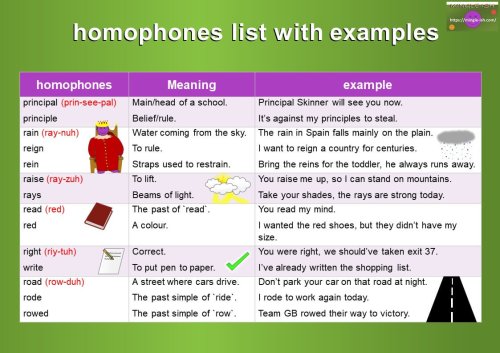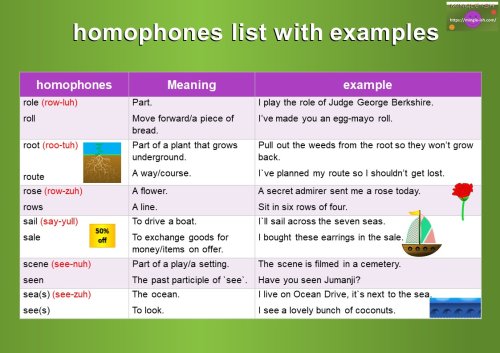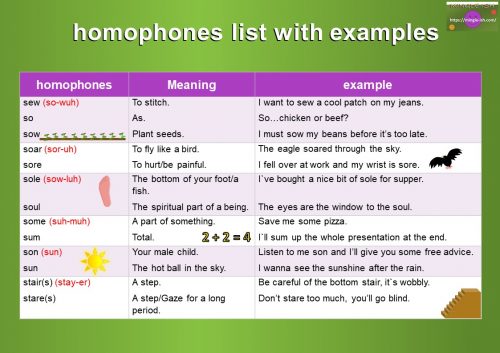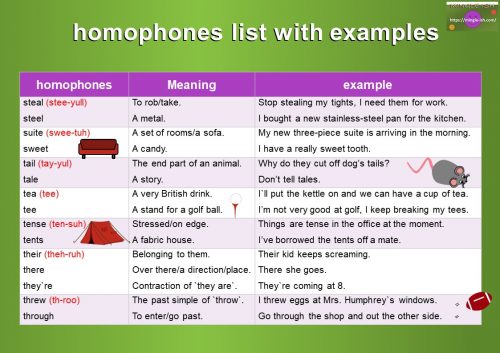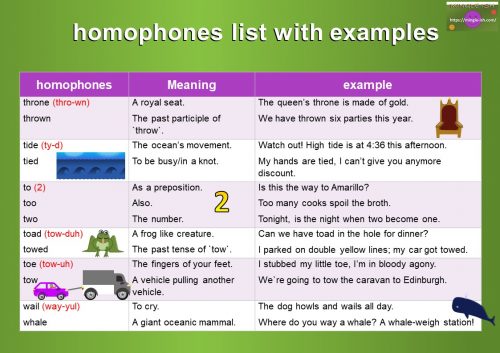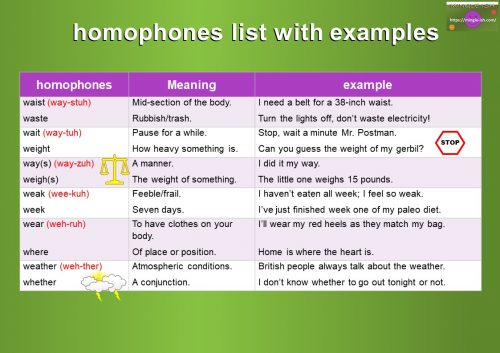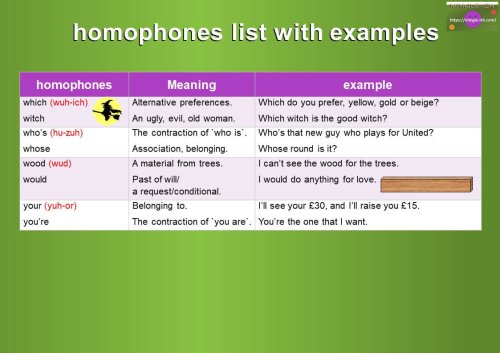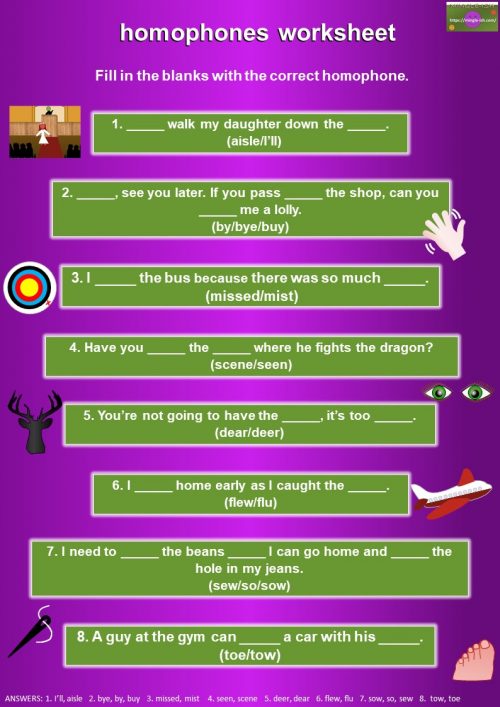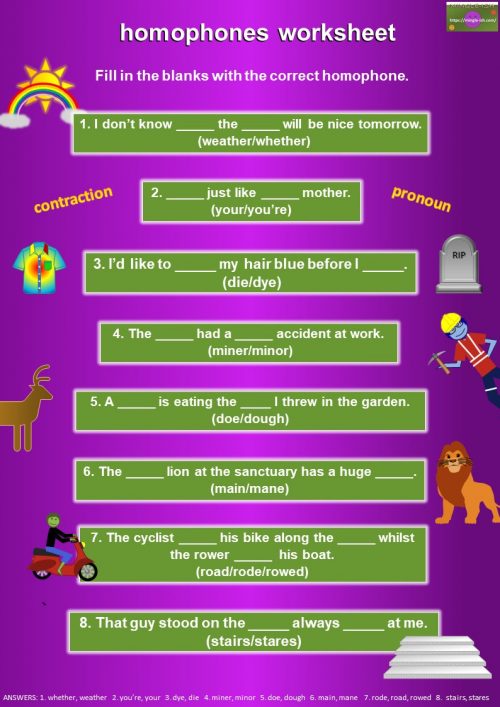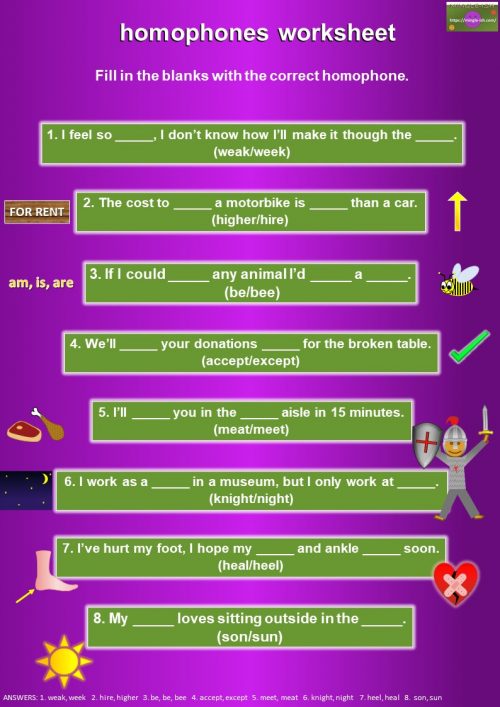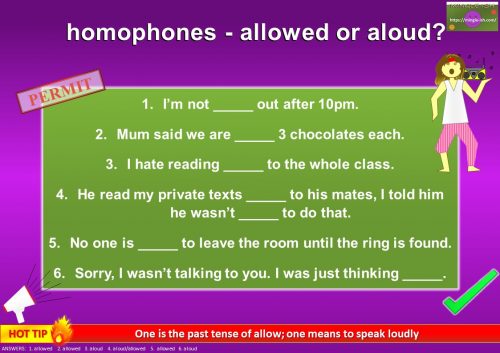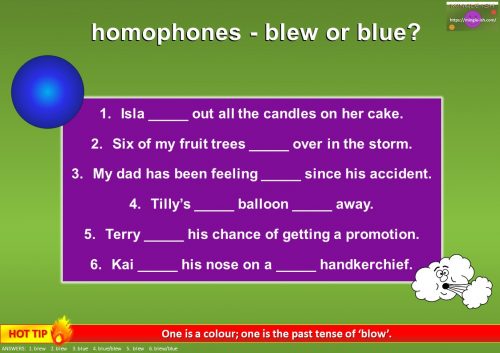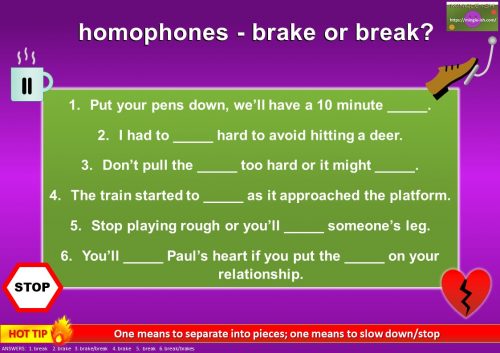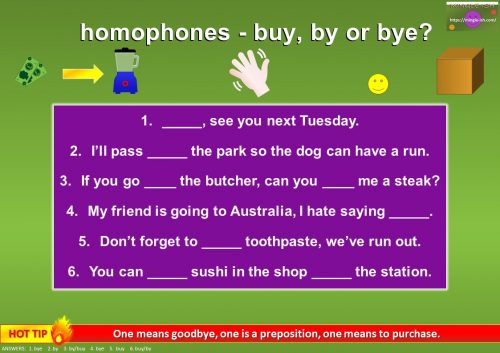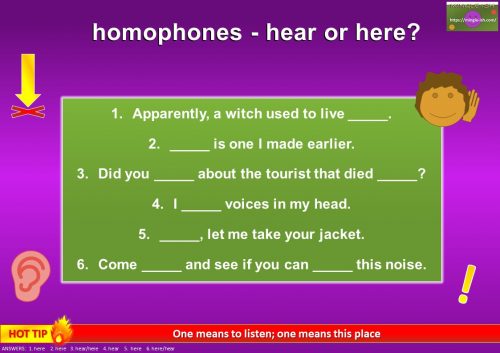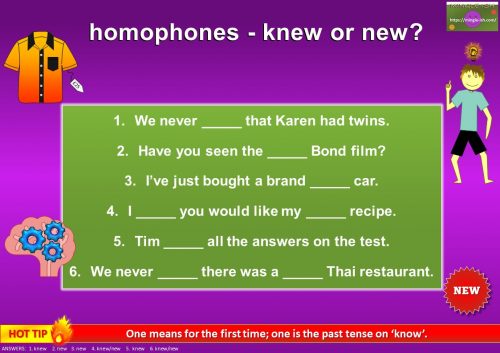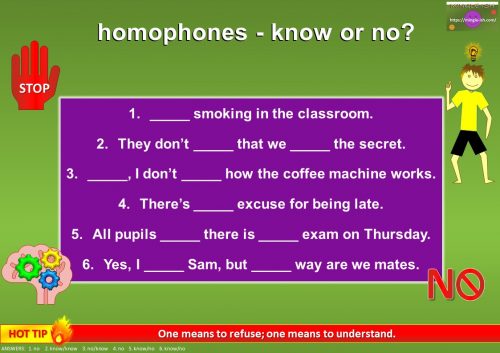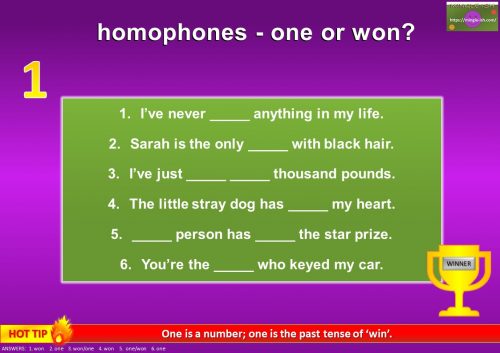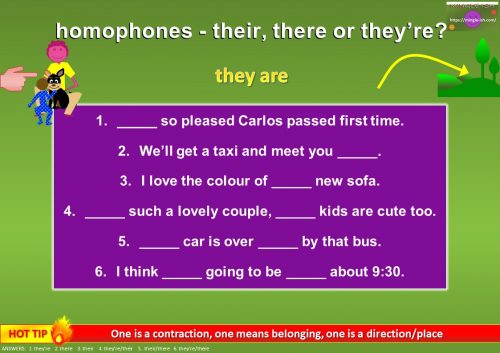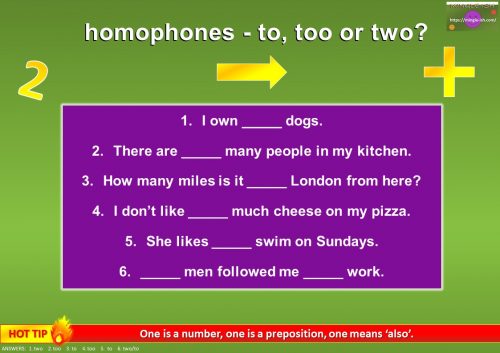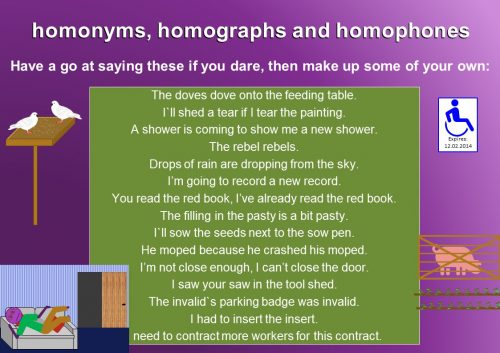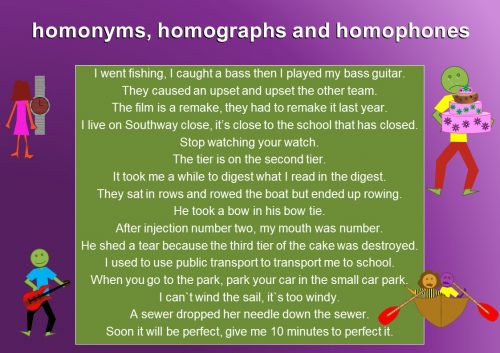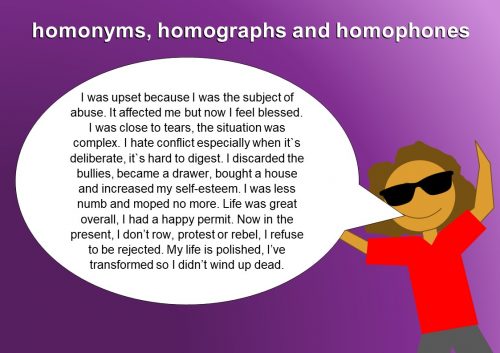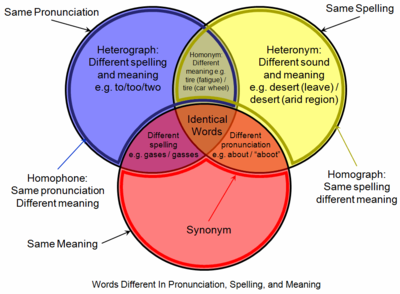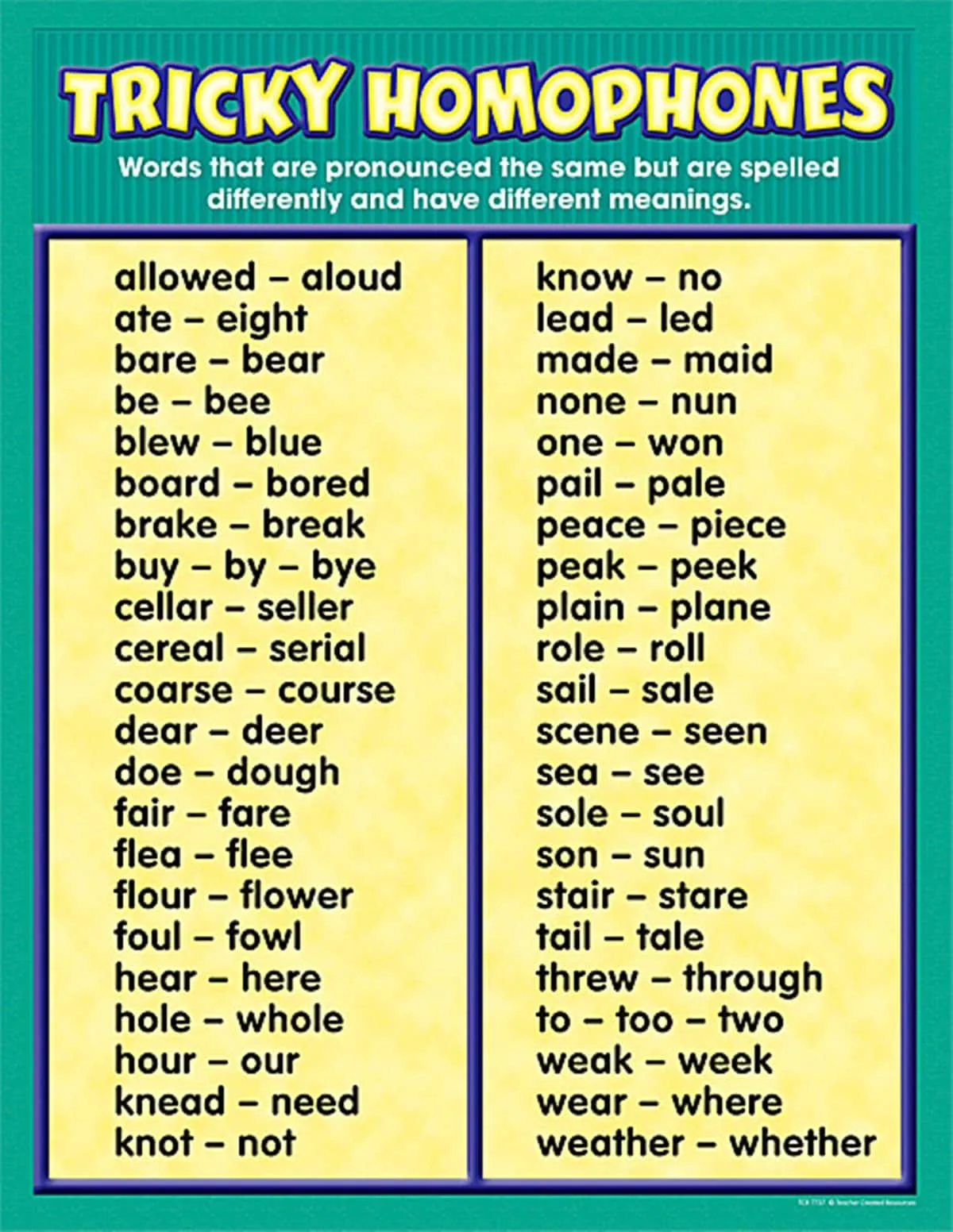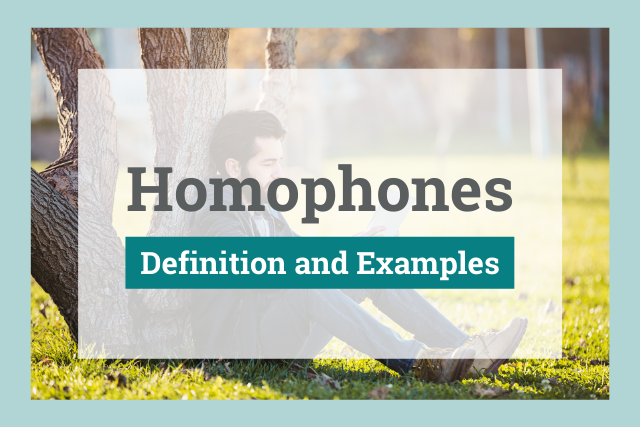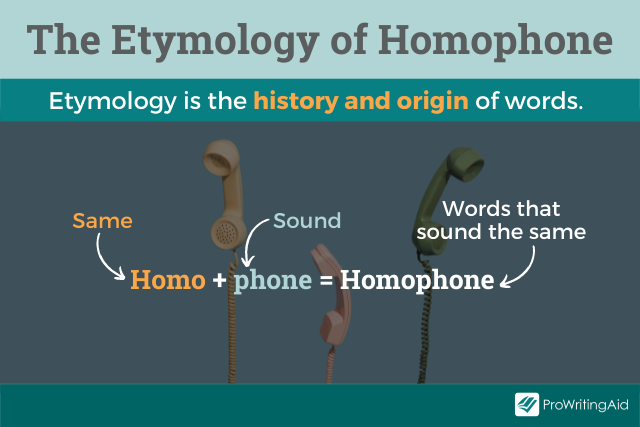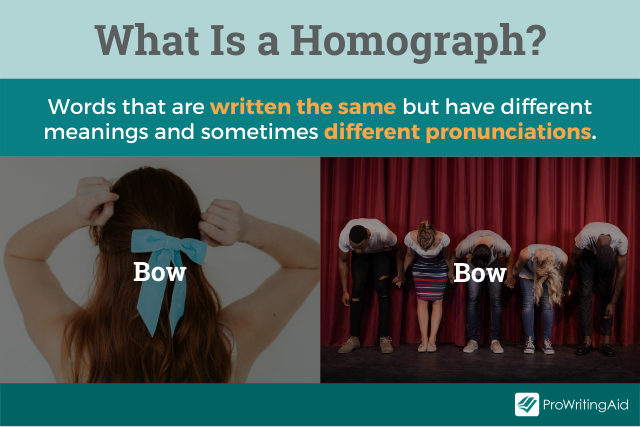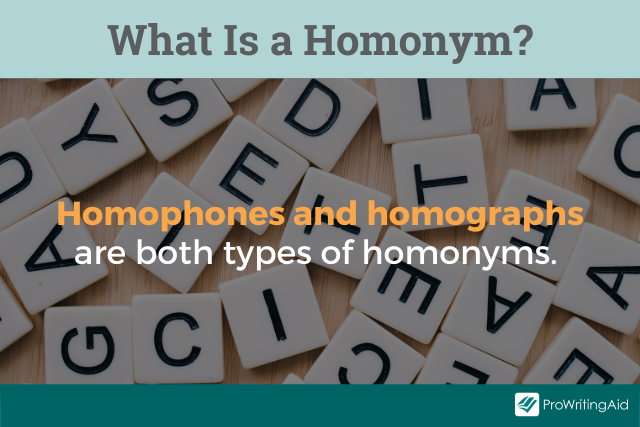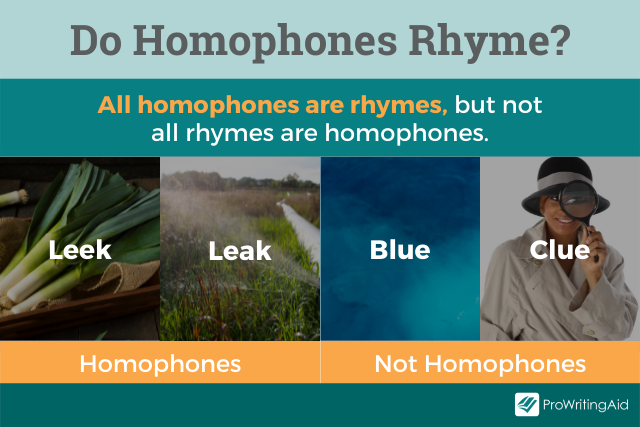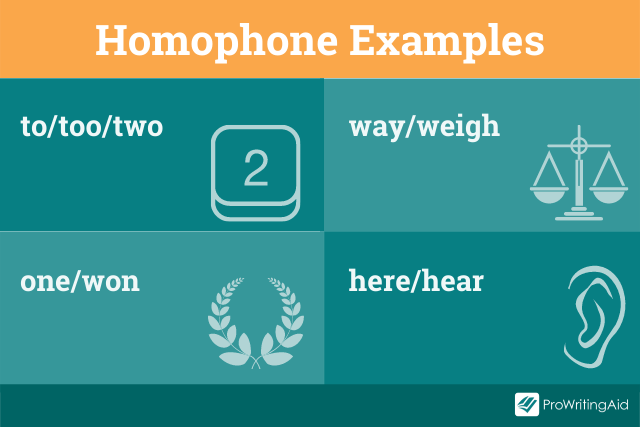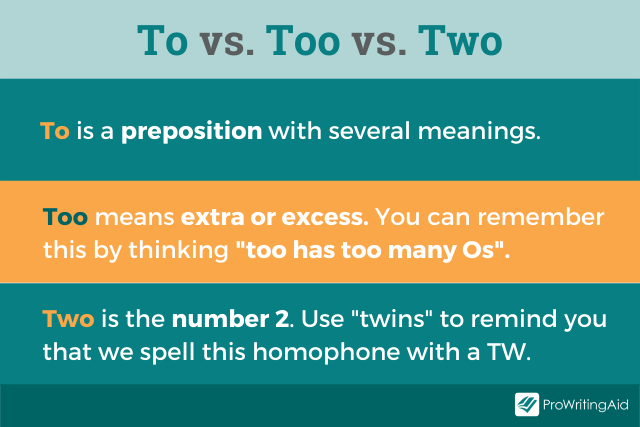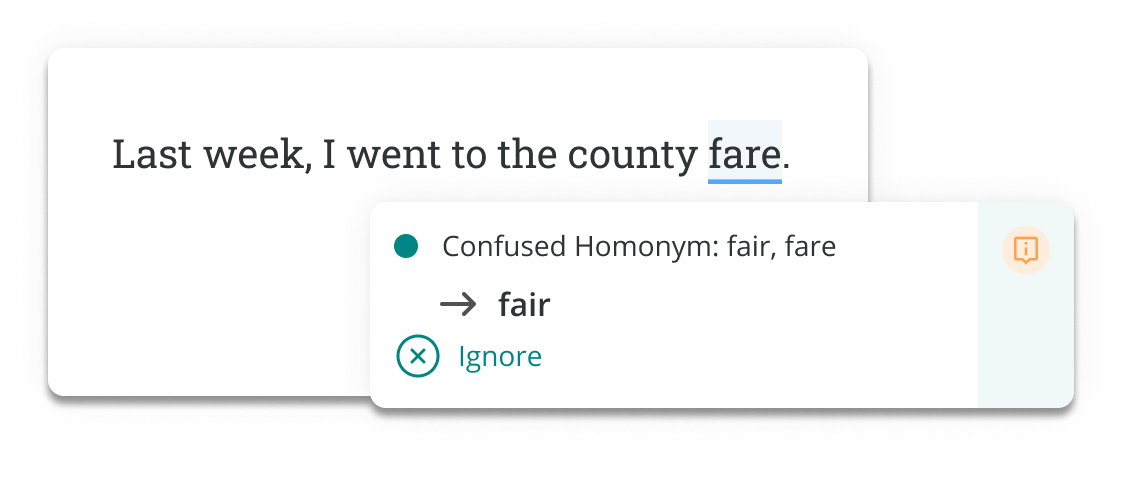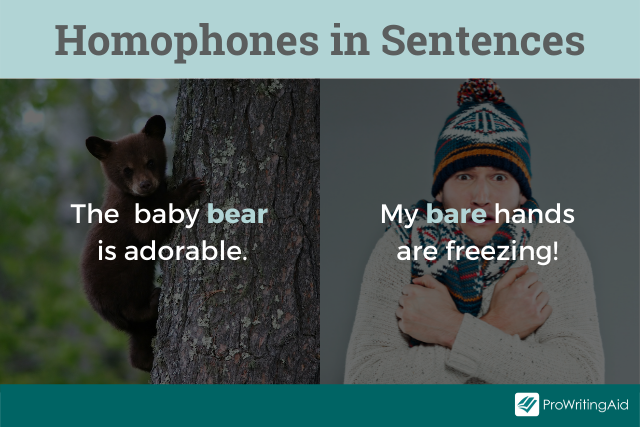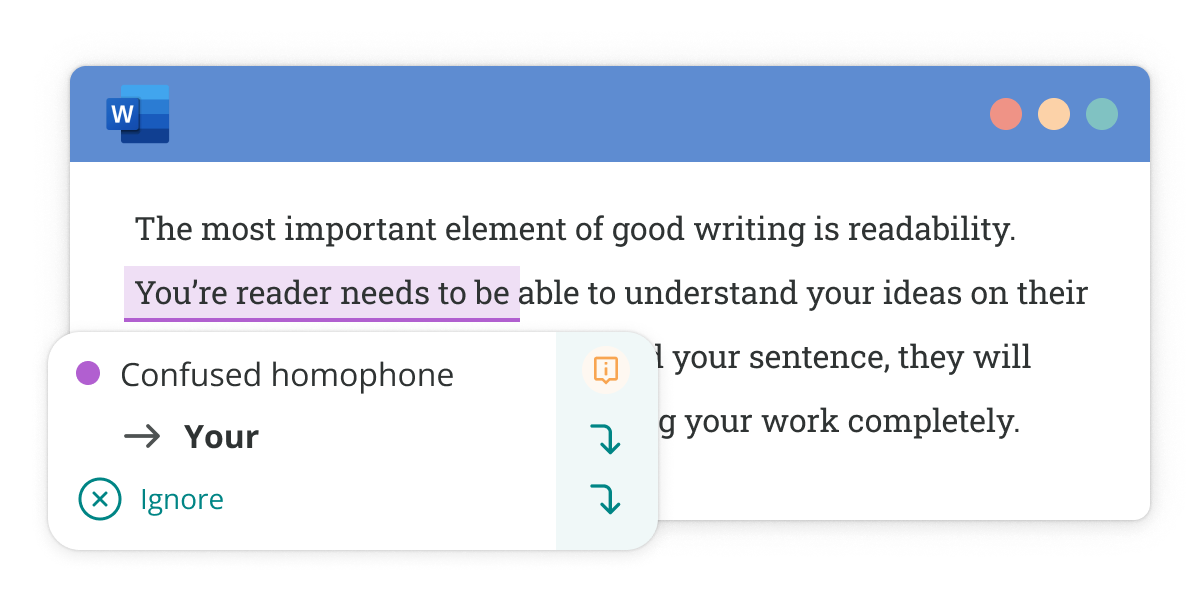Download: This blog post is available as a convenient and portable PDF that you can take anywhere. Click here to get a copy. (Download)
What you will learn:
1. What are homophones?
2. 101 English homophones with examples
3. How to learn homophones in English
4. Quiz: Test your understanding of English homophones
What are homophones?
Homophones are two or more words that sound the same (identical pronunciation), but have different meanings. These words are often spelt differently in English too (e.g. pear vs. pair). The term homophone comes from Greek ‘homo-’ (meaning: same) and ‘-phone’ (meaning: sound or voice), so the word literally means: ‘same sound’.
English has more homophones than most languages because its pronunciation has changed a lot over time, while its spelling has changed very little. Many words have been borrowed from other languages through the centuries and this explains why English spelling is so strange (or confusing!). For example: right (Old English: riht) vs. write (Old English: writan) vs. rite (Latin: ritus). In the past, these words would have been pronounced differently, but today they all sound the same in modern English.
In this guide, we will focus on homophones in British English. Most of these are the same in American English too. However, national and regional accents change the way people pronounce words and sometimes this creates different homophones. For example, these words are homophones in American English, but not in British English: hostel/hostile, balm/bomb, caught/cot, halve/have.
Let’s take a look at some homophones!
101 English homophones with examples
In this list of English homophones, you will find simple, intermediate and more advanced level vocabulary. For each pair or set, there are meanings and examples. Some you will know already, but others will certainly be new! Where possible, these homophones have been put into approximate categories to help you organise and learn them.
NUMBER HOMOPHONES
- One, won
One (noun): The number that comes after 0 but before 2.
My son is one year old today.
Won (verb): The past tense of ‘win’.
The football team won two games in a row.
- Two, to, too
Two (noun): The number that comes after 1 and before 3, a pair.
He bought two packets of crisps.
To (preposition): In the direction of a particular location.
I am going to the shop.
Too (adverb): To a higher degree than desired, also.
The girl was too tired to work. I was tired too.
- Four, for
Four (noun): The number that comes after 3 and before 5.
The clock struck four.
For (preposition): If someone receives something, if something is done for a reason.
I bought John some sweets for his birthday (for him to eat).
It is common for native speakers to use numbers in online chat or SMS messages. For example, you can write ‘before’ like ‘b4’ and ‘forget’ as ‘4get’. This is because ‘for’ sounds the same as ‘four’ (4). Another common example is ‘m8’ (mate – friend).
- Eight, ate
Eight (noun): The number that comes after 7 and before 9.
There were only eight days left until Christmas.
Ate (verb): Past tense form of ‘eat’.
We ate dinner together then went home.
FOOD & DRINK HOMOPHONES
- Steak, stake
Steak (noun): Prime cut of meat, usually beef.
My all-time favourite meal is steak and chips.
Stake (noun): A strong wooden post with a sharp point at one end.
Vampires can only be killed with a stake through the heart!
- Bean, been
Bean (noun): Edible seed that grows in pods on leguminous plants.
Baked beans on toast is a traditional British dish!
Been (verb): Past tense form of ‘be’.
Where have you been all night?
- Pear, pair
Pear (noun): Common type of fruit.
Would you like a pear from the garden?
Pair (noun): A set of two things (often used together).
He couldn’t find a matching pair of socks.
- Bread, bred
Bread (noun): Type of food.
Our local bakery sells the best wholemeal bread for miles!
Bred (verb): Past tense form of ‘breed’ – to raise or develop animal stock.
In the past, many farmers bred rabbits for meat and fur.
- Cereal, serial
Cereal (noun): Grain used for food (e.g. wheat), type of dried breakfast eaten with milk.
My favourite cereal is cornflakes.
Serial (noun/adjective): A story or programme delivered in instalments, taking place in series.
The serial killer loved watching serials on TV!
- Flour, flower
Flour (noun): Ingredient used to make bread and cakes.
This recipe uses two cups of flour and 1/4 cup of sugar.
Flower (noun): Seed-bearing part of a plant.
Her husband gave her a nice bunch of flowers on her birthday.
- Meat, meet
Meat (noun): Food from the flesh of an animal.
The hotel guests got food poisoning because the meat wasn’t cooked properly.
Meet (verb): Arrange or happen to cross paths with somebody.
I’m going to meet my friend at the train station this evening.
- Chilli, chilly
Chilli (noun): Small spicy pepper or pod used in cooking.
I ordered the Mexican Hot Pizza, but couldn’t eat the chilli on top!
Chilly (adjective): A bit cold, not warm.
Don’t forget your coat! It’s a bit chilly out today.
- Mussel, muscle
Mussel (noun): Mollusc with purple-brown shell.
I had the mussels as a starter and they were delicious!
Muscle (noun): Type of human body tissue.
What do you prefer in a boyfriend – brains or muscles?!
- Wine, whine
Wine (noun): Alcoholic drink made from fermented grapes.
Chilled white wine goes well with fish.
Whine (noun/verb): Long high-pitched cry, complain.
The little dog shivered by the door and let out a whine.
- Bite, byte
Bite (noun/verb): Tear something apart with teeth.
Let’s grab a bite to eat in town after work!
Byte (noun): Unit of measurement of digital information.
How many bytes are there in each character in MS Word?
- Grate, great
Grate (verb): Shred into small pieces using a food grater.
The recipe says we need to grate the cheese into the sauce.
Great (adjective): Large, prominent, very good.
The Great White Shark is a great hunter!
- Berry, bury
Berry (noun): Small pulpy fruit.
Did you know that watermelons are a type of large berry?
Bury (verb): Put or hide underground.
You shouldn’t bury your head in the sand each time there’s an argument.
- Currant, current
Currant (noun): Type of berry, also of dried berry variety.
We have lots of currant bushes at the bottom of our garden – both red- and blackcurrants.
Current (noun/adjective): Strong flow of water, present or up-to-date.
Surfers should be aware of the strong currents along the south coast of England.
Even native speakers get confused by the way words are pronounced vs. written! Here are some examples of commonly confused homophones: compliment/complement, practice/practise, principle/principal, lightning/lightening, insight/incite, miner/minor.
- Leek, leak
Leek (noun): Long white and green stick-like vegetable in the onion family.
Wales is famous for its rainy weather and its giant leeks!
Leak (noun/verb): Hole through which fluid can escape accidentally, drip out.
Our roof has got a leak so we need to fix it before winter comes.
- Maize, maze
Maize (noun): Corn.
It is common for manufacturers to use maize as an ingredient in many processed foods.
Maze (noun): Labyrinth.
Chatsworth House has a maze that is made up of a network of paths and hedges.
- Thyme, time
Thyme (noun): Type of aromatic herb.
What goes best with roast chicken – thyme or rosemary?
Time (noun): Period, measure of seconds/minutes/hours/days/etc.
How much time does it take to cook a roast chicken?
- Sauce, source
Sauce (noun): Liquid used to add flavour to food.
This Chinese cooking sauce uses a variety of citrus fruits.
Source (noun): Origin, cause of something.
Citrus fruits are a good source of vitamin C.
- Sweet, suite
Sweet (noun/adjective): Candy, food with a sugary taste.
If you eat up all your vegetables, I’ll let you have one more sweet!
Suite (noun): Set of rooms or technical instruments.
The journalist interviewed the rock star in his London hotel suite.
- Mousse, moose
Mousse (noun): Light and fluffy dessert.
The French restaurant opposite our office sells the best chocolate mousse in town!
Moose (noun): Large animal in the deer family.
Do people eat moose in Canada? They certainly have a lot of them!
ANIMAL HOMOPHONES
- Hare, hair
Hare (noun): Animal that looks like a large rabbit.
The hare hopped through the woodland.
Hair (noun): Growing from the skin of humans and other animals.
Her hair was so long that she had to wear a large hat to work!
- Bear, bare
Bear (noun): Type of large hairy animal.
Our local pub is called The Brown Bear.
Bare (adjective): Naked, without clothes/covering, plain.
If you walk around with bare feet you might cut yourself!
NOTE: The word ‘bear’ is also a verb that literally means ‘to carry a load’. This is not often used in modern English, although you will find it in expressions like ‘I’ll bear that in mind’ (remember) or ‘I can’t bear it!’ (tolerate, put up with).
- Deer, dear
Deer (noun): Large animal with antlers, similar to a small elk or moose.
Some UK farmers keep deer and breed them for their meat (venison).
Dear (noun/adjective): Beloved person, expensive.
The wedding ring you’ve chosen is a bit too dear, my Dear!
- Gorilla, guerrilla
Gorilla (noun): Large ground-dwelling ape.
African gorillas live in mountainous forests in the west of the country.
Guerrilla (adjective/noun): Unauthorised and irregular (military) action, partisan fighter.
The Colombian guerrillas lived in the jungle and sometimes attacked government troops.
- Sole, soul
Sole (noun): Variety of marine flatfish.
I really love grilled sole with a touch of lemon!
Soul: Spirit, immortal part of a human.
For my philosophy course, I have to write an essay about the human soul.
NOTE: The word ‘sole’ is also a noun that refers to the underside of a person’s foot or shoe, and the word ‘soul’ can be used as an adjective to describe the musical genre.
- Flea, flee
Flea (noun): Small jumping parasitic insect that often lives on dogs or cats.
I caught a flea on our cat today so we’ll need to wash him with special shampoo.
Flee (verb): Run away or escape from danger.
After 3 months of bombing, the family decided to flee the conflict in their war-torn city.
- Boar, bore
Boar (noun): Wild pig.
We saw a boar and a tiger when we visited the local zoo.
Bore (verb/noun): Make someone bored or disinterested, a boring person.
John‘s such a bore! All the guy talks about is golf and work!
NOTE: In technical contexts, the word ‘bore’ can also mean ‘make a hole using a tool’. Therefore, ‘borehole’ would be an engineering word for a drill hole, and not a hole made by a wild pig!
- Horse, hoarse
Horse (noun): Four-legged animal often used for riding or work.
When my grandfather was young, he went to school on a horse and cart.
Hoarse (adjective): Describes a rough or husky voice due to a sore throat.
I was feeling hoarse before the concert, but managed to sing when I got up on stage.
- Lynx, links
Lynx (noun): Type of medium-sized wild cat.
In American Indian mythology the lynx is considered a ‘keeper of secrets’.
Links (noun): Plural form of ‘link’, connections or points of contact.
Our company has links to suppliers all over the world.
- Whale, wail
Whale (noun): Largest (marine) mammal on Earth.
Thanks to the work of conservationists, most species of whale are now protected.
Wail (noun/verb): High-pitched cry of pain, anger or sadness.
I heard a patient wail in agony from the neighbouring (hospital) ward.
- Mare, mayor
Mare (noun): Adult female horse.
Children often came from the village to feed apples to the old mare.
Mayor (noun): Elected leader of regional government.
The mayor cut the ribbon at the museum opening ceremony.
- Toad, towed, toed
Toad (noun): Type of large brown frog.
There’s a toad living in our garden pond and my daughter has named it ‘Freddy’!
Towed (verb): Past tense of ‘tow’, when one vehicle pulls another.
When our car broke down, a neighbour kindly towed it home for us.
Toed (adjective): Having toes.
The three-toed sloth lives in the jungles of Borneo.
PRONOUN HOMOPHONES (+ contractions & determiners)
- I, eye
I (pronoun): Used by a speaker to refer to himself/herself.
I did not enjoy the film.
Eye (noun): The pair of organs that allow us to see.
He is blind in one eye.
- I’ll, isle, aisle
I’ll (contraction): Short form of ‘I will’.
I’ll get to school on time if there is no traffic today.
Isle (noun): A small island.
We go on holiday every year to the Isle of Wight.
Aisle (noun): Passage between two rows of seats.
Passengers must not leave their bags in the aisle at any time.
NOTE: While ‘isle’ and ‘aisle’ are always homophones in British English, the contracted form ‘I’ll’ is pronounced differently in many regional accents (isle vs. aal). The same is true for similar contractions like ‘you’ll’ (yule vs. yorl) and ‘we’ll’ (wheel vs. wirl).
- You, ewe, yew
You (pronoun): Used to refer to the person or people being addressed.
Would you like to come round for dinner sometime next week?
Ewe (noun): Female sheep.
The little lamb followed its mother as the ewe crossed the field.
Yew (noun): Type of evergreen tree.
Traditional English longbows were often made from yew (wood).
- You’ll, Yule
You’ll (contraction): Short form of ‘you will’.
I think you’ll improve your piano playing with practice.
Yule (noun): Old word for Christmas.
The word ‘Yule’ is still used in old Christmas songs and religious hymns.
- You’re, your
You’re (contraction): Short form of ‘you are’.
You’re my best friend.
Your (determiner): Belonging to the person the speaker is addressing.
Hi, I’m Jack! What’s your name?
- Our, hour
Our (determiner): Belonging to the speaker and one or more other person.
We both got our hair cut at the same place!
Hour (noun): Period of 60 minutes.
The queue for the roller coaster was over an hour so we didn’t go on it.
NOTE: In many regional accents of British English, ‘our’ and ‘are’ will be homophones. For example, in the sentence ‘Our (ar) friends are (ar) coming to stay’ the words ‘our’ and ‘are’ can be pronounced in exactly the same way.
- They’re, their, there
They’re (contraction): Short form of ‘they are’.
My brother and his girlfriend got engaged because they’re really in love.
Their (determiner): Belonging to a person or thing being mentioned.
Parents are often keen to help their children with their homework.
There (adverb): In, at, or to a given place.
I threw the ball and now it’s over there.
- Theirs, there’s
Theirs (pronoun): Refers to something that belongs to two or more people.
I think that white football is theirs.
There’s (contraction): Short form of ‘there is’.
There’s a good film on at the cinema tonight. Fancy it?
- We’ve, weave
We’ve (contraction): Short form of ‘we have’.
We’ve been digging all day and we haven’t found any treasure!
Weave (verb): Make fabric/baskets by crossing threads over and under.
My grandmother taught me how to weave cloth and make my own clothes.
- We’d, weed
We’d (contraction): Short form of ‘we would/had’.
If we’d got the bus, then we’d be home by now!
Weed (noun): A wild plant that is not wanted.
The gardener pulled up all the weeds in the flowerbed.
- We’ll, wheel
We’ll (contraction): Short form of ‘we will’.
We’ll have to run; otherwise we’ll miss the bus!
Wheel (noun): A circular object used to move things over the ground.
The back wheel of my bike is bent and needs to be replaced.
- We’re, weir
We’re (contraction): Short form of ‘we are’.
When do you think we’re going to get our exam results?
Weir (noun): Low barrier to control the flow of water in a river.
I saw some boys fishing down by the weir.
- Him, hymn
Him (pronoun): Refers to a male object in a sentence.
His face looks familiar, but I don’t really know him.
Hymn (noun): Religious song to praise God.
The church congregation stood up to sing a hymn.
- He’ll, heel, heal
He’ll (contraction): Short for ‘he will’.
He’ll win the tennis match if he scores the next point.
Heel (noun): Back part of a foot or shoe below the ankle.
He stood on a nail and cut his heel.
Heal (verb): (Cause to) become healthy again.
The cut on your foot will heal by itself, but you must keep it clean.
- He’d, heed
He’d (contraction): Short for ‘he would/had’.
He’d better not be late or I’ll kill him!
Heed (verb): Pay attention to.
He should have heeded the warnings. Now he’s in trouble!
- It’s, its
It’s (contraction): Short form of ‘it is’.
It’s not my fault. It’s yours!
Its (possessive determiner): Belonging to a thing being mentioned.
Lay the baby on its side if it starts crying.
In English you can say ‘it’ about a small baby without being impolite. Native speakers often do this if they do not know the gender of the child. In most other languages grammatical gender dictates that separate words must be used for male vs. female babies.
- Who’s, whose
Who’s (contraction): Short form of ‘who is’.
Who’s coming to your birthday party tomorrow?
Whose (pronoun): Belonging to or associated with which person.
Let’s get on with the game! Whose turn is it to roll the dice?
- What’s, watts
What’s (contraction): Short form of ‘what is’.
What’s the capital of France?
Watts (noun): Unit of power in electrical items (plural form).
How many watts are in an amp?
- Which, witch
Which (pronoun/determiner): Used when asking for information about people or things.
Which of these shirts do you like best?
Witch (noun): Woman with magic powers, usually evil ones.
I’m dressing up as a witch for Halloween this year.
COLOUR HOMOPHONES
- Blue, blew
Blue (adjective): Colour between green and violet (e.g. like the sky).
Elvis was a fan of blue suede shoes!
Blew (verb): Past tense form of ‘blow’.
The storm blew down several trees on our street!
- Red, read
Red (adjective): Colour at the end of the spectrum (e.g. like blood).
Little Red Riding Hood is a popular children’s fairytale.
Read (verb): Past tense form of ‘read’.
How many Harry Potter books have you read?
- Greys, graze
Greys (noun): Two or more shades of the colour grey.
I really like how the artist has used the greys in this painting.
Graze (verb): Eat grass in a field (of cows, sheep, etc.).
Early each morning, the farmer took his cattle out to graze.
FAMILY HOMOPHONES
- Son, sun
Son (noun): A boy or man in relation to his parents.
My son is only eight years old, but he thinks he is 18!
Sun (noun): Star round which the Earth orbits, light/warmth from this star.
The sun rises in the morning and sets in the evening.
- Aunt, aren’t
Aunt (noun): The sister of someone’s father or mother.
My mum’s sister is my aunt.
Aren’t (contraction): Short form of ‘are not’.
We aren’t going on holiday this year.
NOTE: In American English and many UK regional accents, the words ‘aunt’ and ‘ant’ are homophones. In Britain, ‘ant’ (aunt) would be the usual pronunciation in the north of the country.
- Father, farther
Father (noun): Dad.
My father used to play rugby for England.
Farther (adverb): Comparative form of ‘far’.
How much farther do we have to walk?
NATURE HOMOPHONES
- Root, route
Root (noun): Underground part of a plant or tree, source or origin.
A weed may grow again if you don’t remove the root.
Route (noun): Way, course or path.
Our route took us through the Alps and then on to Italy.
- Wood, would
Wood (noun): Small forest, material from trees.
There used to be badgers in the wood, but they are gone now.
Would (verb): Past tense form of ‘will’, expresses conditional.
Where would you like to spend the summer holidays?
- Sea, see
Sea (noun): Expanse of salt water that covers most of our planet.
Julie’s hometown is by the sea.
See (verb): Action of perceiving with the eyes.
If you climb to the top of that hill, you can see for miles!
- Tide, tied
Tide (noun): Alternate rising and falling of the sea.
When it’s low tide you have to walk a long way before you can swim.
Tied (verb): Past tense form of ‘tie’.
She tied the hook to the end of the fishing line.
- Shore, sure
Shore (noun): The land along the edge of the sea or a body of water.
We walked along the shore and found some pretty shells.
Sure (adjective): Confident that one is right.
I’m sure that I locked the door.
- Weather, whether
Weather (noun): Relates to sunshine, rain, wind etc.
The weather in April is usually showery.
Whether (conjunction): Expressing a doubt or choice between alternatives.
I don’t know whether to go to work or call in sick.
Whether the weather is cold
or whether the weather is hot,
we’ll weather the weather,
whatever the weather,
whether we like it or not.
- Mist, missed
Mist (noun): Light fog.
The morning mist covered the fields.
Missed (verb): Past tense form of ‘miss’.
We missed the train so had to get to London by coach.
- Dew, due
Dew (noun): Tiny drops of water that form on cool surfaces at night.
The grass was wet with dew.
Due (adjective): Expected at a certain time.
My sister’s baby is due in 3 weeks!
- Reed, read
Reed (noun): A tall plant which grows in water or marshy ground.
There were reeds growing along the side of the canal.
Read (verb): Look at and comprehend the meaning of words.
She loved books so much that she would read them all day long.
- Air, heir
Air (noun): Mix of gases that we breathe.
The air was moist after the storm.
Heir (noun): A person entitled to the property or rank of another after death.
He was the King’s only son, and so was heir to the throne.
- Night, knight
Night (noun): The period from sunset to sunrise.
The stars come out at night.
Knight (noun): An old term for a mounted soldier in armour.
He was my knight in shining armour.
VERB HOMOPHONES
- Sew, sow, so
Sew (verb): Join or repair with needle and thread.
There’s a hole in my sock, but I don’t know how to sew.
Sow (verb): Plant by scattering seeds on the ground.
Each year the local farmers sow wheat in their fields.
So (adverb/conjunction): To the same or greater extent, therefore, in order that.
I’d never seen so many people in the shop, so I decided to come back later.
- Pause, paws, pours, pores
Pause (verb): Interrupt an action briefly.
I think we should pause the meeting for a short break at 12.00.
Paws (noun): Plural form of ‘paw’, animal foot with pads and claws.
The cat got its paws trapped under the carpet.
Pours (verb): 3rd person form of ‘pour’, flow quickly in a steady stream.
If John pours the tea, then you can offer our guests a biscuit.
Pores (noun): Plural form of ‘pore’, tiny holes in the skin.
When you do physical exercise, sweat comes out through the pores in your skin.
- Wrap, rap
Wrap (verb): Cover in paper or soft material.
My mum likes to use colourful paper to wrap the Xmas presents.
Rap (noun/verb): Hip-hop music, singing style involving quick rhymes.
When I was in my teens I used to love rap, but now I’m more into rock.
- Wear, where, ware
Wear (verb/noun): Have clothing on one’s body, damage over time through use/friction.
Where (adverb): In, to, or in which place or situation.
I have no idea where the nearest petrol station is.
Ware (noun): Manufactured items of a certain type.
John Lewis is a good department store if you want to buy kitchenware.
- Steal, steel
Steal (verb): Take (illegally) without permission.
If you steal goods from a shop, this is called ‘shoplifting’.
Steel (noun): Common type of metal use in construction.
The new art museum is made entirely from glass and steel.
- Write, right, rite
Write (verb): Mark letters, words or symbols on paper with a pen or pencil.
Please remember to write to Santa Claus before Xmas!
Right (adjective): Correct, just, opposite of left.
I answered all the test questions, but only got half right.
Rite (noun): Ritual.
In many cultures, older boys must complete a rite of passage to become ‘men’.
- Buy, by, bye
Buy (verb): Get something in exchange for payment.
I am going to buy some food from the Supermarket.
By (preposition): Identifying who performed an action, near to, using.
My homework gets checked by my teacher.
Bye (exclamation): Informal way of saying ‘goodbye’.
“Bye mum! I’ll see you when I get home from school.”
- Sell, cell
Sell (verb): Give or hand over something for money.
I want to sell my car and buy a new one.
Cell (noun): Small room for a prisoner.
The police kept the thief in a cell overnight.
- Hear, here
Hear (verb): Perceive sound with the ears.
I could hear people laughing in the next room.
Here (adverb): In, at, or to this place or position.
We’ve lived here for most of our lives.
- Break, brake
Break (verb): Smash or separate into pieces.
Be careful not to break a window with that football!
Brake (noun): A device used to slow down a moving vehicle.
When you want to slow the car down, remember to use the brake.
- Affect, effect
Affect (verb): Influence, cause to change.
The Brexit vote will certainly affect the UK economy.
Effect (noun): A change which is a result of an action or other cause.
No one knows what the effects of this political decision will be.
- Die, dye
Die (verb): Stop living.
When sailors die they are sometimes ‘buried’ at sea.
Dye (verb/noun): To colour something, substance that adds colour.
My sister would like to dye her hair pink, but I think green would look better!
- Waste, waist
Waste (verb/noun): Use or expend carelessly, rubbish or unwanted material.
Let’s go. I don’t want to waste any more time!
Waist (noun): Part of the body or measurement around the hips.
I need a pair of jeans with a 36-inch waist.
- Know, no
Know (verb): Be aware of.
Most men know how to boil an egg, but some don’t!
No (exclamation and determiner): A negative response, not any.
No, I don’t want to mow the lawn today.
- Accept, except
Accept (verb): Agree to receive or undertake something.
I said the dog had eaten my homework, but the teacher didn’t accept my excuse!
Except (preposition): Not including, other than.
I invited everyone to my birthday party except Jamie.
- Wait, weight
Wait (verb): Stay where you are until a particular time or event.
I didn’t want to wait any longer, so I left the cafe.
Weight (noun): The heaviness of a person or thing.
My wife often worries about her weight, but she’s actually quite slim!
- Weigh, way, whey
Weigh (verb): Use scales to determine the weight of something.
Match officials have to weigh each boxer before a professional fight.
Way (noun): Method of doing something, road or route.
We got lost and I had to admit that I didn’t know the way home.
Whey (noun): Watery component of milk after the formation of curds.
Whey is produced as part of the cheese-making process.
- Flew, flu, flue
Flew (verb): Past tense form of ‘fly’.
The beautiful eagle flew high above the trees.
Flu (noun): Influenza.
Many people suffer from flu during autumn and winter.
Flue (noun): Duct or pipe for smoke.
When we got a wood-burning stove, we had a flue and liner installed in the chimney.
A flea and a fly flew up in a flue.
Said the flea, “Let us fly!”
Said the fly, “Let us flee!”
So they flew through a flaw in the flue.
- Threw, through
Threw (verb): Past tense form of ‘throw’.
He threw his dirty clothes into the laundry basket and put on a clean t-shirt.
Through (preposition): Moving in one side and out of the other.
He walked through the door and went straight upstairs.
ADJECTIVE & ADVERB HOMOPHONES
- Male, mail
Male (adjective): A man.
The survey was conducted with equal numbers of male and female participants.
Mail (noun): Letters and parcels sent by post.
The postman put the mail through the letterbox.
- Vain, vein, vane
Vain (adjective): Inflated sense of self or appearance, producing no result.
I think a lot of fashion models are vain.
Vein (noun): Type of blood vessel.
The patient needed an injection, but the trainee nurse couldn’t find a vein.
Vane (noun): Weathervane, broad blade attached to rotating wheel/axis.
The weathervane moved from side to side in the wind.
- Weak, week
Weak (adjective): Opposite of strong.
I like my tea weak, with milk and one sugar.
Week (noun): 7 days.
I can meet tomorrow, but I’m around all next week.
- Whole, hole
Whole (adjective): Full, entire.
I can’t eat a whole pizza to myself. Would you like to share?
Hole (noun): Gap or space in the ground or a surface.
There’s a hole in my pocket. That’s how I lost my key!
- Bored, board
Bored (adjective): Lacking interest or engagement.
The girl looked bored and half-asleep in class.
Board (noun/verb): Long and flat piece of wood, get onto transport (plane, ship, etc.).
The window was broken and a board had been nailed across it.
- Coarse, course
Coarse (adjective): Rough, rude.
The surface of the stone was coarse and scratched his fingers.
Course (noun): Study programme.
A friend of mine is doing an online English course.
- Higher, hire
Higher (adjective): Comparative form of ‘high’.
Our company sales figures are higher this year.
Hire (verb): Rent, borrow for money.
There’s no need to take bicycles because we can hire them at the park.
- Plain, plane
Plain (adjective/noun): Simple, without flavour, large flat area of land with few trees.
I usually have plain yoghurt and muesli for breakfast.
Plane (noun): Aeroplane.
Our plane landed at 2 o’clock sharp.
- Aloud, allowed
Aloud (adverb): Not silently.
He read the letter aloud so that everyone could hear.
Allowed (verb): Past tense form of ‘allow’.
The museum staff allowed us to take several photographs.
- Principal, principle
Principal (adjective): Main, number one.
The government’s principal concern is immigration.
Principle (noun): Fundamental truth or proposition.
You can trust Rob. He’s a man of principle.
How to learn homophones in English
There is no secret formula when it comes to learning homophones. Try several different approaches and see what works best for you! To get you started, check out the 5 study tips below:
1) Always learn homophones in context
This is basically a fancy way of saying “in a real sentence or situation”. Context helps us understand the intended meaning behind the usage of a word. This becomes even more important when learning homophones because words like pause/paws/pours/pores all have identical pronunciation! You can only work out which meaning is intended by looking at the context.
2) Have a laugh with English homophones!
Many English jokes use homophones to confuse the listener and create puns. You have already seen several jokes in this study guide, but you can find more on Homophonelist.com. At higher levels, exploring English humour can be a really good way of developing your understanding of vocabulary and culture.
3) Use mobile apps anytime, anywhere
The best way to learn vocabulary is to repeat it regularly. Mobile apps offer a quick solution for learning homophones on the move! You can download apps like Homophones Free or go online to play the BBC’s homophone game.
4) Write nonsense sentences with homophones
Another good way to learn homophones is to practise them in your writing. Take a set of homophones and write one sentence that includes ALL of them. It does not matter if the sentence is nonsense! The main aim of the exercise is to compare the different meanings of the homophones. For example: I said “bye” to my friend and went to buy a coat in a shop by the river.
5) Play spelling games with homophones
Native speakers often make spelling mistakes because of homophones! This shows the importance of learning the correct meanings AND spellings of words that have the same pronunciation. Try this game: Make flashcards with x1 homophone on each side and the translation in your language in brackets. Ask a friend to choose random cards and read out the homophones and/or translations. Try to write down the correct spelling of the word, and then check to see if you are right!
Quiz: Test your understanding of English homophones
Now that you have been through the homophone list, it is time to test your knowledge! Try each of the exercises in this quiz and then check your answers at the end.
EXERCISE A
Put the follow homophones into the sentences: pause, paws, pours, pores.
- Whenever it rains, the water _____ off the roof into the drain.
- If you feel nervous during the presentation, then just _____ for a moment.
- A facial scrub helps clean the _____ and prevent spots.
- Could you please keep your dirty _____ off the biscuits!
EXERCISE B
Write down the correct homophone for each of the jokes.
Q: Why was the mortgage sad?
A: Because it was a loan!
Q: Why will you never starve to death in a desert?
A: Because of all the sandwiches there!
Q: Why does a milking stool only have three legs?
A: Because the cow’s got the udder!
EXERCISE C
Choose the correct homophone in each of the following sentences.
- Our company’s guiding principal/principle is trust.
- Its/it’s forecast to rain all next week.
- If you’re going swimming in the sea, be careful of the current/currant!
- I’ve decided to except/accept the new job at Google.
EXERCISE D
Find the errors in the following text and correct the spelling of the homophones.
I went to sea the doctor on Thursday because I thought I’d caught flue. When I arrived, I wasn’t shore wear the waiting room was sow I asked at reception. They told me witch doctor to see and ware to go. Their were few patients sew I went straight in. The doctor took a pencil to rite down my symptoms. He said I didn’t have flew, but that stress could be the sauce of my headaches. He gave me some aspirin, which soon took affect. I was pleased that my visit had not been in vein.
Answers:
A = pours, pause, pores, paws
B = alone, sand which is there, other (regional pronunciation)
C = principle, it’s, current, accept
D = see, flu, sure, where, so, which, where, there, so, write, flu, source, effect, vain
Download: This blog post is available as a convenient and portable PDF that you can take anywhere. Click here to get a copy. (Download)
Liam G.
— Staff Writer.
Find this post useful? Share it with friends!
Read more
-
-
-
-
10 ways to get conversational English practice every day
Ever lost in conversation? You are not alone! Spoken English can be a hard skill to master, especially if you do not have regular opportunities to gain practice. In this study guide, we will give you 10 great ways to practise your conversational English, both face-to-face and online. Ready? Let’s jump right in! Continue reading →
homophones meaning
Homophones are words in English that sound the same but are spelt different. These words also have a different meaning.
Confused? Let me give you some examples then you can read the full list.
- One – a number – pronounced ‘wun’
- Won – past tense of ‘win’ – pronounced ‘wun’
- Buy – to purchase something – pronounced ‘bi’
- By – past/near – pronounced ‘bi’
- Bye – short for ‘goodbye’ – pronounced ‘bi’
As you can see, the two (or three) words are pronounced the same. However, they have a different meaning and different spelling. That my friends, is what we call a ‘homophone‘ in English.
Let’s see some common examples of homophones.
I think you get the idea from the examples above. For those of you who really want to nail your pronunciation; homographs, homonyms and homophones are for you!
homophones list with examples
Homonyms are very tricky for non-natives to learn and distinguish between. Have a crack at learning some of the most common ones. I’ve given you the two (or more) homophones, the meaning and some tips for pronunciation.
Here’s a few but there are lots more. Good luck!
accept, except
- accept (to take)
example – He asked me to marry him, and I accepted. - except (other than)
example – I love all their clothes except the skinny jeans.
aisle, I’ll, isle
- aisle (a passageway)
example – Gnocchi is down aisle 12. - I’ll (a contraction of `I will`)
example – I’ll be there for you. - isle (an island)
example – I can’t wait for the Isle of White festival.
ale, ail
- ale (a beer type drink)
example – That bar sells great ales. - ail (to have poor health)
example – My uncle is starting to ail, he`s been sick for a while.
aloud, allowed
- aloud (to speak loudly)
example – I read the article aloud to the rest of the group. - allowed (the past tense of allow)
example – I’m not allowed out after 10:30 pm.
altar, alter
- altar (a table in a church)
example – Jasmine was jilted at the altar. - alter (to change)
example – I might alter my hair do; I fancy a change for spring.
ant, aunt
- ant (a small insect)
example – There is an ant nest in our garden. - aunt (your mum’s or dad`s sister)
example – My aunt has got ants in her kitchen.
ate, eight
- ate (the past tense of eat)
example – I ate far too much at lunch. - eight (a number)
example – I ate eight pieces of chocolate.
bail, bale
- bail (release a prisoner before trial)
example – The bail conditions for the murderer have been set. - bale (a bundle)
example – Hay bales are really cheap this year.
ball, bawl
- ball (a round object used in sports)
example – The dog punctured our ball. - bawl (a loud shout or yell)
example – The kids are bawling their eyes out because they’ve lost their football.
band, banned
- band (a group, a ring)
example – Have you heard of the band called Oasis? - banned (prohibited)
example – I can’t believe you are banned from Revolution.
bare, bear
- bare (to be naked)
example – I slapped him across the face with my bare hand. - bear (an animal)
example – I saw a grizzly bear catch a salmon.
bases, basis
- bases (a starting point)
example – Our bases are in the woods, yours are by the railway. - basis (a principle)
example – I only told you on the basis you’d keep it a secret.
be, bee
- be (to be/a conjunction)
example – The children need to be quiet before we start the film. - bee (an insect that makes honey)
example – Be careful! Bees live in hives.
blew, blue
- blew (the past of blow)
example – He huffed and he puffed and blew the house down. - blue (a colour)
example – Your eyes are blue, like the ocean.
board, bored
- board (a flat object)
example – I’m buying a new surfboard as soon as I get paid. - bored (to be fed up)
example – I`m so bored of you always talking about yourself.
boy, buoy
- boy (a young man)
example – I went into the Army a boy and came out a man. - buoy (a floating device)
example – The two boys raced out to the buoys.
brake, break
- brake (to stop)
example – Perch your foot on the brake, these roads are narrow. - break (to destroy)
example – Please don’t break my new tennis racket.
buy, by, bye
- buy (purchase)
example – Who will buy my beautiful roses? - by (past/near)
example – Down by the bay, where the watermelons grow. - bye (goodbye)
example – Goodbye my friend, I know you’re gone.
ceiling, sealing
- ceiling (Can you recommend someone to paint the ceiling?)
example – Who will buy my beautiful roses? - sealing (to cover/fasten/fix)
example – The sealing around the bath is broken.
cell, sell
- cell (a small unit/organism)
example – You’re going to be locked in a prison cell for the rest of your days. - sell (to trade for money)
example – I’m selling my cell phone.
cellar, seller
- cellar (the room underneath a house)
example – I’m going to install a wine cellar. - seller (a person who sells items)
example – This seller has got bad reviews.
cent, scent, sent
- cent (a coin)
example – 50 cent is my favourite rapper. - scent (a smell/odour)
example – This washing powder has a nice scent. - sent (past tense of send)
example – I sent the parcel 17 days ago.
cereal, serial
- cereal (a breakfast food)
example – I eat cereal for breakfast. - serial (continuing)
example – Wendy`s house won best serial drama.
chews, choose
- chews (crush with teeth)
example – The dog chews all my clothes. - choose (select)
example – I choose the blue shoes.
chilli, chilly
- chilli (a spicy vegetable)
example – Don’t rub your eyes after chopping chilli! - chilly (cold)
example – It is a bit chilly out today.
cite, sight, site
- cite (to mention)
example – I always cite my work. - sight (vision)
example – My eyesight is much better after the operation. - site (a place)
example – The kitchen looks like a building site.
coarse, course
- coarse (rough, uneven)
example – One of my Yorkshire terriers has a coarse coat. - course (a route, a dish, training)
example – The golf course is flooded.
days, daze
- days (plural of day)
example – Summer days are drifting away. - daze (to be confused/stunned)
example – The boxer is in a daze after the powerful punch.
dear, deer
- dear (expensive/loved/cherished)
example – My dear old nan died aged 93. - deer (an animal (Bambi))
example – I want to buy some deer meat but it`s too dear.
desert, dessert
- desert (to abandon)
example – My friends have deserted me. - dessert (course that concludes a meal)
example – Can I have the recipe for the delicious dessert?
die, dye
- die (death)
example – Live and let die. - dye (change colour)
example – Let’s pretend to be hippies and tie-dye our shirts.
doe, dough
- doe (a female deer, rabbit, or rat)
example – Doe a deer a female deer, ray a drop of golden sun. - dough (masa for baking)
example – Let the dough rise for 30 minutes before kneading it.
dual, duel
- dual (double)
example – The new dual action toothbrush is now available. - duel (a battle/fight)
example – I challenge you to a duel in chess.
earn, urn
- earn (to gain)
example – If I work on Saturday, I’ll earn 90 quid. - urn (a pot used for storing dead people`s ashes)
example – I’ll order the best urn in the catalogue; I earnt a lot this month.
elicit, illicit
- elicit (draw out)
example – The teacher tried to elicit the answer from the class. - illicit (illegal)
example – They found a stash of illicit drugs in his flat.
eye, I
- eye (a bodily organ for sight)
example – I’ve booked my eye test for Thursday. - I (oneself)
example – I am the best.
fair, fare
- fair (a big public party/to be ok)
example – My Fair Lady. - fare (pleasant/the fee/price)
example – The fare for the fair has increased due to inflation.
feat, feet
- feat (great achievement)
example – The contest is a feat of strength. - feet (body parts below your legs)
example – I`ve got two left feet when it comes to dancing.
find, fined
- find (to discover)
example – If I find the coin, I`ll keep it. - fined (past tense of fine)
example – In England you can get fined for smoking inside.
flea, flee
- flea (small parasite)
example – I found a flea on my dog. - flee (to escape)
example – Refugees flee war.
flew, flu
- flew (the past of fly)
example – I caught a dragonfly, but it flew away. - flu (a virus)
example – I flew home a day early as I caught the flu.
flour, flower
- flour (white powder used in baking)
example – Finally, add the flour and beat until smooth. - flower (a colourful plant)
example – I need a flower to brighten up my workspace.
for, fore, four
- for (as a preposition)
example – I went to the bakery for lunch. - fore (in front/before)
example – I`m in love with that sports car on the forecourt. - four (a number)
example – Four fish are flinching.
forth, fourth
- forth (onwards)
example – From that day forth, they were best friends. - fourth (4th [cardinal number])
example – May the 4th be with you.
foul, fowl
- foul (disgusting)
example – Take the bins out will you, they smell foul! - fowl (a game bird)
example – I’m going to Gregory’s this weekend to hunt fowl.
grate, great
- grate (go against the flow)
example – Can you grate a bit of cheese for the ravioli please? - great (wonderful, fantastic)
example – Goodness gracious great balls of fire!
grease, Greece
- grease (an oily substance)
example – My new cleanser gets rid of grease and oil. - Greece (a country)
example – I`d love to visit Greece one day.
groan, grown
- groan (to moan, grunt)
example – Don’t groan, you`re eating those vegetables. - grown (the participle of grow)
example – My kids have all grown up, time has flown by.
hare, hair
- hare (a big rabbit)
example – The dogs are chasing a hare. - hair (strands that grow on skin)
example – I want to be a hairdresser when I`m older.
heal, heel
- heal (to get better)
example – I sliced my finger, hopefully it`ll heal in a few days. - heel (the back part of your foot)
example – The heel on my favourite pair of shoes has broken.
hear, here
- hear (to listen)
example – I can hear a horn beeping and motors running. - here (this place)
example – I’ll be right here waiting for you.
higher, hire
- higher (taller)
example – Mount Everest is higher than the Andes. - hire (to rent)
example – I`m going to hire a striper for Max`s stag do.
him, hymn
- him (referring to a man)
example – Did you ask him yet? - hymn (a religious song)
example – I’ve chosen three beautiful hymns for the funeral.
hoarse, horse
- hoarse (a rough voice)
example – I was singing too much at the match, now I’m hoarse. - horse (an animal)
example – It`s a two-horse race to the finish.
hole, whole
- hole (an open part in a surface)
example – Somebody burnt a hole in my trousers. - whole (entire)
example – He’s got the whole world in his hands.
hour, our
- hour (a time)
example – I`ll be with you in an hour or so. - our (belonging to the speaker and others)
example – Our house, in the middle of our street.
knead, need
- knead (to work dough with your hands)
example – Knead the dough for about 10 minutes. - need (to require something)
example – All you need is love.
knew, new
- knew (the past tense of `know`)
example – I knew you were waiting for me. - new (up to date, 1st time)
example – I want to be a part of it New York, New York.
knight, night
- knight (a warrior dressed in armour)
example – King Arthur had lots of knights. - night (the dark period after the day)
example – Tonight’s the night.
knot, not
- knot (to tie)
example – Tie a knot in your shoelaces before you trip over. - not (no/never)
example – That`s not a good idea.
know, no
- know (to understand)
example – How will I know if he really loves me? - no (refuse)
example – No talking in the library.
knows, nose
- knows (third person of `know`)
example – She knows more that she`s letting on. - nose (the organ you breathe through)
example – Everyone knows that her nose is fake.
lead, led
- lead (a poisonous metal)
example – Lead based paints are now banned. - led (the past simple of `lead`)
example – The king led the troops into battle.
made, maid
- made (the past simple of `make`)
example – I`m not made of money. - maid (a young woman servant)
example – Maid Marion and her merry men.
mail, male
- mail (to send)
example – I’ll mail you the figures shortly. - male (masculine)
example – This toilet is for males only.
main, mane
- main (principal)
example – Go through the main door and turn left. - mane (the hair of a horse of lion)
example – The mane of a lion grows as it gets older.
meat, meet
- meat (a dead animal for eating)
example – What meat shall we buy for the barbeque? - meet (to encounter)
example – I hope we don’t meet any weirdos.
miner, minor
- miner (a worker in a mine)
example – My dad was a miner all his life. - minor (someone underage/less)
example – Don’t buy booze for minors, it’s illegal!
missed, mist
- missed (the past simple of `miss`)
example – I missed my plane because of the traffic jam. - mist (a light fog)
example – There’s mist around so be careful.
morning, mourning
- morning (the period before noon)
example – I`ll see you in the morning bright and early. - mourning (to be sad following a death)
example – He`s mourning his dead wife.
muscles, mussels
- muscles (a bundle of fibrous tissue)
example – With his bulging muscles, he could run to Brussels. - mussels (a shelled mollusc we eat)
example – Let’s go to the beach and collect mussels for tea.
none, nun
- none (zero, nothing)
example – I wanted a biscuit, but there were none left. - nun ( a religious community)
example – My sister is going to become a nun.
oar, ore, or
- oar (paddle for a small boat)
example – Pass me an oar, I’ll help row. - ore (raw material)
example – That island is full of ores and minerals. - or (either)
example – Black or white?
one, won
- one (the number)
example – There is one hour left to cast your vote. - won (the past of `win`)
example – I fought the law and the law won.
pair, pear
- pair (two of something)
example – Can you bring me the blue pair of scissors? - pear (a fruit)
example – I’ll make a pear tart for Sunday.
pane, pain
- pane (a flat sheet of material)
example – The windowpane is cracked, it needs replacing. - pain (when a part of your body hurts)
example – Ironing is a pain in the bum.
passed, past
- passed (the past of `pass`)
example – He passed the ball to Turner. - past (a previous time/a preposition)
example – He`s got a dark past.
patience, patients
- patience (to have endurance)
example – All we need is just a little patience. - patients (a person in medical care)
example – The ward is full, there are 45 patients inside.
pause, paws
- pause (a short break)
example – Let’s pause here for a sec… - paws (animal feet)
example – His paws are huge, he’s going to be a big dog.
peace, piece
- peace (harmony/quiet)
example – I`d love some peace and quiet. - piece (a bit/portion)
example – Take another little piece of my heart now.
peak, peek
- peak (the top of something)
example – I peaked at 14:00, now I’m flagging. - peek (to take a look)
example – I`ll let you have a sneak peek at my wedding dress.
plain, plane
- plain (simple)
example – My stomach hurts, I’ll have something plain for tea. - plane (an aircraft)
example – Their plane is going to land soon.
poor, pore, pour
- poor (no money or possessions)
example – I give all my old clothes to the poor. - pore (holes on your skin’s surface)
example – I can’t wait to use my new pore cleansing face wash. - pour (to make a liquid flow)
example – I know how to pour a pint, I used to work in a pub.
prince, prints
- prince (a man of royalty)
example – One day my prince will come. - prints (to print/copies)
example – These footprints suggest the cat is large.
principal, principle
- principal (main/head of a school)
example – Principal Skinner will see you now. - principle (belief/rule)
example – It’s against my principles to steal.
rain, reign, rein
- rain (water coming from the sky)
example – The rain in Spain falls mainly on the plain. - reign (to rule)
example – I want to reign a country for centuries. - rein (straps used to restrain)
example – Bring the reins for the toddler, he always runs away.
raise, rays
- raise (to life)
example – You raise me up, so I can stand on mountains. - rays (beams of light)
example – Take your shades, the rays are strong today.
read, red
- read (the past of `read`)
example – You read my mind. - red (a colour)
example – I wanted the red shoes, but they didn’t have my size.
right, write
- right (correct)
example – You were right, we should’ve taken exit 37. - write (to put pen to paper)
example – I’ve already written the shopping list.
road, rode, rowed
- road (a street where the cars drive)
example – Don’t park your car on that road at night. - rode (the past simple of `ride`)
example – I rode to work again today. - rowed (the past simple of `row`)
example – Team GB rowed their way to victory.
role, roll
- role (a part)
example – I play the role of Judge George Berkshire. - roll (move forward/a piece of bread)
example – I’ve made you an egg-mayo roll.
root, route
- root (part of a plant that grows underground)
example – Pull out the weeds from the root so they won’t grow back. - route (a way/course)
example – I`ve carefully planned my route so I shouldn’t get lost.
rose, rows
- rose (a flower)
example – A secret admirer sent me a rose today. - rows (a line)
example – Sit in six rows of four.
sail, sale
- sail (to drive a boat)
example – I`ll sail across the seven seas. - sale (to exchange goods for. money/items on offer)
example – I bought these earrings in the sale.
scene, seen
- scene (part of a play/a setting)
example – The scene is filmed in a cemetery. - seen (the past participle of `see`)
example – Have you seen Jumanji?
sea(s), see(s)
- sea(s) (the ocean)
example – I live on Ocean Drive, it`s next to the sea - see(s) (to look)
example – I see a lovely bunch of coconuts.
sew, so, sow
- sew (to stitch)
example – I want to sew a cool patch on my jeans. - so (as)
example – So…chicken or beef? - sow (plant seeds)
example – I must sow my beans before it’s too late.
soar, sore
- soar (to fly like a bird)
example – The eagle soared through the sky. - sore (to hurt/be painful)
example – I fell over at work and my wrist is sore.
sole, soul
- sole (the bottom of your foot/a fish)
example – I`ve bought a nice bit of sole for supper. - soul (the spiritual part of a being)
example – The eyes are the window to the soul.
some, sum
- some (a part of something)
example – Save me some pizza. - sum (total)
example – I`ll sum up the whole presentation at the end.
son, sun
- son (your male child)
example – Listen to me son and I’ll give you some free advice. - sun (the hot ball in the sky)
example – I want to see the sunshine after the rain.
stair(s), stare(s)
- stair(s) (a step)
example – Be careful of the bottom stair, it`s wobbly. - stare(s) (a step/gaze for a long period)
example – Don’t stare too much, you’ll go blind.
steal, steel
- steal (to rob/take)
example – Stop stealing my tights, I need them for work. - steel (a metal)
example – I bought a new stainless-steel pan for the kitchen.
suite, sweet
- suite (a set of rooms/a sofa)
example – My new three-piece suite is arriving in the morning. - sweet (a candy)
example – I have a really sweet tooth.
tail, tale
- tail (the end part of an animal)
example – Why do they cut off dog’s tails? - tale (a story)
example – Don’t tell tales.
tea, tee
- tea (a very British drink)
example – I`ll put the kettle on and we can have a cup of tea. - tee (a stand for a golf ball)
example – I’m not very good at golf, I keep breaking all my tees.
tense, tents
- tense (stressed/on edge)
example – Things are tense in the office at the moment. - tents (a fabric house)
example – I’ve borrowed the tents off a mate.
their, there, they’re
- their (belonging to them)
example – Their kid keeps screaming. - there (over there/a direction/place)
example – There she goes. - they’re (contraction of `they are)
example – They`re coming at 8.
threw, through
- threw (the past simple of `throw`)
example – I threw eggs at Mrs. Humphrey`s windows. - through (to enter/go past)
example – Go through the shop and out the other side.
throne, thrown
- throne (a royal seat)
example – The queen’s throne is made of gold. - thrown (the past participle of `throw`)
example – We have thrown six parties this year.
tide, tied
- tide (the ocean’s movement)
example – Watch out! High tide is at 4:36 this afternoon. - tied (to be busy/in a knot)
example – My hands are tied, I can’t give you anymore discount.
to, too, two
- to (as a preposition)
example – Is this the way to Amarillo? - too (also)
example – Too many cooks spoil the broth. - two (the number)
example – Tonight, is the night when two become one.
toad, towed
- toad (a frog like creature)
example – Can we have toad in the hole for dinner? - towed (the past tense of `tow`)
example – I parked on double yellow lines; my car got towed.
toe, tow
- toe (the fingers of your feet)
example – I stubbed my little toe, I’m in bloody agony. - tow (a vehicle pulling another vehicle)
example – We`re going to tow the caravan to Edinburgh.
wail, whale
- wail (to cry)
example – The dog howls and wails all day. - whale (a giant oceanic mammal)
example – Where do you way a whale? A whale-weigh station!
waist, waste
- waist (mid-section of the body)
example – I need a belt for a 38-inch waist. - waste (rubbish/trash)
example – Turn the lights off, don’t waste electricity!
wait, weight
- wait (pause for a while)
example – Stop, wait a minute Mr. Postman. - weight (how heavy something is)
example – Can you guess the weight of my gerbil?
way(s), weigh(s)
- way(s) (a manner)
example – I did it my way. - weigh(s) (the weight of something)
example – The little one weighs 15 pounds.
weak, week
- weak (feeble/frail)
example – I haven’t eaten all week; I feel so weak. - week (seven days)
example – I’ve just finished week one of my paleo diet.
wear, where
- wear (to have clothes on your body)
example -I’ll wear my red heels as they match my bag. - where (of place or position)
example – Home is where the heart is.
weather, whether
- weather (atmospheric conditions)
example – British people always talk about the weather. - whether (a conjunction)
example – I don’t know whether to go out tonight or not.
which, witch
- which (alternative preferences)
example – Which do you prefer, yellow, gold or beige? - witch (an ugly, evil, old woman)
example – Which witch is the good witch?
who’s, whose
- who’s (the contraction of `who is`)
example – Who’s that new guy who plays for United? - whose (association, belonging)
example – Whose round is it?
wood, would
- wood (a material from trees)
example – I can’t see the wood for the trees. - would (past of will/a request/conditional)
example – I would do anything for love.
your, you’re
- your (belonging to)
example – I’ll see your £30, and I’ll raise you £15. - you’re (the contraction of `you are`)
example – You’re the one that I want.
Here’s a pdf list of homophones you can download and study in your own time.
homophones worksheets
So, you’ve learnt the list and are now a homophone pro. Have a go at completing these exercises, the answers are at the bottom.
For the first exercises, fill in the blanks with the correct homophone.
For this next set of exercises, fill in the blanks using the correct homophone from the title.
homophones activity
Now it’s time to practice what you’ve learnt. See if you can read these sentences with the correct pronunciation and word stress. Go on, I believe in you.
Venn diagram showing the relationships between homophones (blue circle) and related linguistic concepts
A homophone () is a word that is pronounced the same (to varying extent) as another word but differs in meaning. A homophone may also differ in spelling. The two words may be spelled the same, for example rose (flower) and rose (past tense of «rise»), or spelled differently, as in rain, reign, and rein. The term homophone may also apply to units longer or shorter than words, for example a phrase, letter, or groups of letters which are pronounced the same as another phrase, letter, or group of letters. Any unit with this property is said to be homophonous ().
Homophones that are spelled the same are also both homographs and homonyms, e.g. the word read, as in «He is well read» (he is very learned) vs. the sentence «I read that book» (I have finished reading that book).[a]
Homophones that are spelled differently are also called heterographs, e.g. to, too, and two.
Etymology[edit]
«Homophone» derives from Greek homo- (ὁμο‑), «same», and phōnḗ (φωνή), «voice, utterance».
Wordplay and games[edit]
Homophones are often used to create puns and to deceive the reader (as in crossword puzzles) or to suggest multiple meanings. The last usage is common in poetry and creative literature. An example of this is seen in Dylan Thomas’s radio play Under Milk Wood: «The shops in mourning» where mourning can be heard as mourning or morning. Another vivid example is Thomas Hood’s use of birth and berth as well as told and toll’d (tolled) in his poem «Faithless Sally Brown»:
- His death, which happen’d in his berth,
- At forty-odd befell:
- They went and told the sexton, and
- The sexton toll’d the bell.
In some accents, various sounds have merged in that they are no longer distinctive, and thus words that differ only by those sounds in an accent that maintains the distinction (a minimal pair) are homophonous in the accent with the merger. Some examples from English are:
- pin and pen in many southern American accents
- by and buy
- merry, marry, and Mary in most American accents
- The pairs do and due as well as forward and foreword are homophonous in most American accents but not in most English accents
- The pairs talk and torque as well as court and caught are distinguished in rhotic accents, such as Scottish English, and most dialects of American English, but are homophones in some non-rhotic accents, such as British Received Pronunciation
Wordplay is particularly common in English because the multiplicity of linguistic influences offers considerable complication in spelling and meaning and pronunciation compared with other languages.
Malapropisms, which often create a similar comic effect, are usually near-homophones. See also Eggcorn.
Same-sounding phrases[edit]
Same-sounding (homophonous, or homophonic) phrases are often used in various word games. Examples of same-sounding phrases (which may only be true homophones in certain dialects of English) include:
- ice cream vs. I scream (as in the meme I scream. You scream. We all scream for ice cream.)
- euthanasia vs. Youth in Asia
- depend vs. deep end
- Gemini vs. gem in eye vs. Jim and I (vs. Jem in eye)
- the sky vs. this guy (most notably as a mondegreen in «Purple Haze» by Jimi Hendrix)
- four candles vs. fork handles
- sand which is there vs. sandwiches there
- philanderers vs. Flanders
- example vs. egg sample
- some others vs. some mothers vs. smothers
American comedian Jeff Foxworthy frequently uses same-sounding phrases in his Appalachian comedy routine, which play on exaggerated «country» accents. Notable examples include:
- Initiate vs. and then she ate: «My wife ate two sandwiches, initiate a bag o’ tater chips.»
- Mayonnaise vs. Man, there is: «Mayonnaise a lot of people here tonight.»
- Innuendo vs. in your window: «Hey dude I saw a bird fly innuendo.»
- Moustache vs. must ask: «I Moustache you a question.»
During the 1980s, an attempt was made to promote a distinctive term for same-sounding multiple words or phrases, by referring to them as «oronyms»,[b]
but the term oronym was already well established in linguistics as an onomastic designation for a class of toponymic features (names of mountains, hills, etc.),[2] the alternative use of the same term was not well accepted in scholarly literature.[3]
Number[edit]
English[edit]
There are sources[4] which maintain lists of homophones (words with identical pronunciations but different spellings) and even ‘multinyms.’ There is disagreement among such lists due to dialectical variations in pronunciation and archaic uses. In English, concerning groups of homophones (excluding proper nouns), there are approximately 88 triplets, 24 quadruplets, 2 quintuplets, 1 sextet, 1 septet, and 1 questionable octet (possibly a second septet). The questionable octet is:
- raise, rays, rase, raze, rehs, res, reais, [race]
Other than the common words raise, rays, and race this octet includes
- raze – a verb meaning «to demolish, level to the ground» or «to scrape as if with a razor»
- rase – an archaic verb meaning «to erase»
- rehs – the plural of reh, a mixture of sodium salts found as an efflorescence in India
- res – the plural of re, a name for one step of the musical scale; obsolete legal term for «the matter» or «incident»
- reais – the plural of real, the currency unit of Brazil
The inclusion of «race» in the octet above is questionable, since its pronunciation differs from the other words on the list (ending with /s/ instead of /z/).
If proper names are included, then a possible nonet would be:
- Ayr – a town in Scotland
- Aire – a river in Yorkshire
- Eyre – legal term and various geographic locations
- heir – one who inherits
- air – the ubiquitous atmospheric gas that people breathe; a type of musical tune
- err – to make an error
- ere – poetic / archaic «before»
- e’er – poetic «ever» (some speakers)
- are – a defunct, small, metric unit of area
German[edit]
There are many homophones in present-day standard German. As in other languages, however, there exists regional and/or individual variation in certain groups of words or in single words, so that the number of homophones varies accordingly. Regional variation is especially common in words that exhibit the long vowels ä and e. According to the well-known dictionary Duden, these vowels should be distinguished as /ɛ:/ and /e:/, but this is not always the case, so that words like Ähre (ear of corn) and Ehre (honor) may or may not be homophones.
Individual variation is shown by a pair like Gäste (guests) – Geste (gesture), the latter of which varies between /ˈɡe:stə/ and /ˈɡɛstə/ and by a pair like Stiel (handle, stalk) – Stil (style), the latter of which varies between /ʃtiːl/ and /stiːl/.
Besides websites that offer extensive lists of German homophones,[5] there are others which provide numerous sentences with various types of homophones.[6] In the German language homophones occur in more than 200 instances. Of these, a few are triples like
- Waagen (weighing scales) – Wagen (cart) – wagen (to dare)
- Waise (orphan) – Weise (way, manner) – weise (wise)
Most are couples like lehren (to teach) – leeren (to empty).
Spanish[edit]
Although Spanish has far fewer homophones than in English, they are far from being non-existent. Some are homonyms, such as basta, which can either mean ‘enough’ or ‘coarse’, but most exist because of homophonous letters. For example, the letters b and v are pronounced exactly alike, so the words basta (coarse) and vasta (vast) are pronounced identically.[7]
Other homonyms are etymologically related, but have different genders, and in some cases the different genders producing different lexical items. In the case of persona, el persona (the male or ungendered/unidentified person) and la persona (the female person) are the masculine and feminine forms of the noun persona (person) respectively. However, el capital and la capital have drastically different meanings, in which the masculine noun means ‘money’ and the feminine noun means ‘capital city’ or ‘capital letter’.[8]
Japanese[edit]
There are many homophones in Japanese, due to the use of Sino-Japanese vocabulary, where borrowed words and morphemes from Chinese are widely used in Japanese, but many sound differences, such as the original words’ tones, are lost.[citation needed] These are to some extent disambiguated via Japanese pitch accent (i.e. 日本 vs. 二本, both pronounced nihon, but with different pitches), or from context, but many of these words are primarily or almost exclusively used in writing, where they are easily distinguished as they are written with different kanji; others are used for puns, which are frequent in Japanese.
An extreme example is kikō (hiragana: きこう), which is the pronunciation of at least 22 words (some quite rare or specialized, others common; all these examples are two-character compounds), including:
- 機構 (organization / mechanism)
- 紀行 (travelogue)
- 稀覯 (rare)
- 騎行 (horseback riding)
- 貴校 (school (respectful))
- 奇功 (outstanding achievement)
- 貴公 (word for «you» used by men addressing male equals or inferiors)
- 起稿 (draft)
- 奇行 (eccentricity)
- 機巧 (contrivance)
- 寄港 (stopping at port)
- 帰校 (returning to school)
- 気功 (breathing exercise, qigong)
- 寄稿 (contribute an article / a written piece)
- 機甲 (armor, e.g. of a tank)
- 帰航 (homeward voyage)
- 奇効 (remarkable effect)
- 季候 (season / climate)
- 気孔 (stoma)
- 起工 (setting to work)
- 気候 (climate)
- 帰港 (returning to port)
Even some native Japanese words are homophones. For example, kami (かみ) is the pronunciation of the words
- 紙 (paper)
- 髪 (hair)
- 神 (god/spirit)
- 上 (up)
The former two words are disambiguated from the latter two by pitch accent.
Korean[edit]
The Korean language contains a combination of words that strictly belong to Korean and words that are loanwords from Chinese. Due to Chinese being pronounced with varying tones and Korean’s removal of those tones, and because the modern Korean writing system, Hangeul, has a more finite number of phonemes than, for example, Latin-derived alphabets such as that of English, there are many homonyms with both the same spelling and pronunciation.
For example
- ‘화장(化粧)하다‘: ‘to put on makeup’ vs. ‘화장(火葬)하다‘: ‘to cremate’
- ‘유산(遺産)‘: ‘inheritance’ vs. ‘유산(流産)‘: ‘miscarriage’
- ‘방구‘: ‘fart’ vs. ‘방구(防具)‘: ‘guard’
- ‘밤[밤ː]’: ‘chestnut’ vs. ‘밤’: ‘night’
There are heterographs, but far fewer, contrary to the tendency in English. For example,
- ‘학문(學問)’: ‘learning’ vs. ‘항문(肛門)’: ‘anus’.
Using hanja (한자; 漢字), which are Chinese characters, such words are written differently.
As in other languages, Korean homonyms can be used to make puns. The context in which the word is used indicates which meaning is intended by the speaker or writer.
Mandarin Chinese[edit]
Due to phonological constraints in Mandarin syllables (as Mandarin only allows for an initial consonant, a vowel, and a nasal or retroflex consonant in respective order), there are only a little over 400 possible unique syllables that can be produced,[9] compared to over 15,831 in the English language.[10]
Chinese has an entire genre of poems taking advantage of the large amount of homophones called one-syllable articles, or poems where every single word in the poem is pronounced as the same syllable if tones are disregarded. An example is the Lion-Eating Poet in the Stone Den.
Like all Chinese languages, Mandarin uses phonemic tones to distinguish homophonic syllables; Mandarin has five tones. A famous example,
- mā (妈) means «mother»
- má (麻) means «hemp»
- mă (马) means «horse»
- mà (骂) means «scold»
- ma (吗) is a yes / no question particle
Although all these words consist of the same string of consonants and vowels, the only way to distinguish each of these words audibly is by listening to which tone the word has, and as shown above, saying a consonant-vowel string using a different tone can produce an entirely different word altogether. If tones are included, the number of unique syllables in Mandarin increases to at least 1,522.[11]
However, even with tones, Mandarin retains a very large amount of homophones. Yì, for example, has at least 125 homophones,[12] and it is the pronunciation used for Chinese characters such as 义, 意, 易, 亿, 议, 一, and 已.
There are even place names in China that have identical pronunciations, aside for the difference in tone. For example, there are two neighboring provinces with nearly identical names, Shanxi (山西) and Shaanxi (陕西) Province. The only difference in pronunciation between the two names are the tone in the first syllable (Shanxi is pronounced Shānxī whereas Shaanxi is pronounced Shǎnxī). As most languages exclude the tone diacritics when transcribing Chinese place names into their own languages, the only way to visually distinguish the two names is to write Shaanxi in Gwoyeu Romatzyh romanization. Otherwise, nearly all other spellings of placenames in mainland China are spelled using Hanyu Pinyin romanization.
Many scholars believe that the Chinese language did not always have such a large number of homophones and that the phonological structure of Chinese syllables was once more complex, which allowed for a larger amount of possible syllables so that words sounded more distinct from each other.
Scholars also believe that Old Chinese had no phonemic tones, but tones emerged in Middle Chinese to replace sounds that were lost from Old Chinese. Since words in Old Chinese sounded more distinct from each other at this time, it explains why many words in Classical Chinese consisted of only one syllable. For example, the Standard Mandarin word 狮子(shīzi, meaning «lion») was simply 狮 (shī) in Classical Chinese, and the Standard Mandarin word 教育 (jiàoyù, «education») was simply 教 (jiào) in Classical Chinese.
Since many Chinese words became homophonic over the centuries, it became difficult to distinguish words when listening to documents written in Classical Chinese being read aloud. One-syllable articles like those mentioned above are evidence for this. For this reason, many one-syllable words from Classical Chinese became two-syllable words, like the words mentioned in the previous paragraph.
Even with the existence of two- or two-syllable words, however, there are even multisyllabic homophones. Such homophones even play a major role in daily life throughout China, including Spring Festival traditions, which gifts to give (and not give), political criticism, texting, and many other aspects of people’s lives.[13]
Another complication that arises within the Chinese language is that in non-rap songs, tones are disregarded in favor of maintaining melody in the song.[14] While in most cases, the lack of phonemic tones in music does not cause confusion among native speakers, there are instances where puns may arise.
Subtitles in Chinese characters are usually displayed on music videos and in songs sung on movies and TV shows to disambiguate the song’s lyrics.
Vietnamese[edit]
It is estimated that there are approximately 4,500 to 4,800 possible syllables in Vietnamese, depending on the dialect.[15] The exact number is difficult to calculate because there are significant differences in pronunciation among the dialects. For example, the graphemes and digraphs «d», «gi», and «r» are all pronounced /z/ in the Hanoi dialect, so the words dao (knife), giao (delivery), and rao (advertise) are all pronounced /zaw˧/. In Saigon dialect, however, the graphemes and digraphs «d», «gi», and «v» are all pronounced /j/, so the words dao (knife), giao (delivery), and vao (enter) are all pronounced /jaw˧/.
Pairs of words that are homophones in one dialect may not be homophones in the other. For example, the words sắc (sharp) and xắc (dice) are both pronounced /săk˧˥/ in Hanoi dialect, but pronounced /ʂăk˧˥/ and /săk˧˥/ in Saigon dialect respectively.
Psychological research[edit]
Pseudo-homophones[edit]
Pseudo-homophones are pseudowords that are phonetically identical to a word. For example, groan/grone and crane/crain are pseudo-homophone pairs, whereas plane/plain is a homophone pair since both letter strings are recognised words. Both types of pairs are used in lexical decision tasks to investigate word recognition.[16]
Use as ambiguous information[edit]
Homophones, specifically heterographs, where one spelling is of a threatening nature and one is not (e.g. slay/sleigh, war/wore) have been used in studies of anxiety as a test of cognitive models that those with high anxiety tend to interpret ambiguous information in a threatening manner.[17]
See also[edit]
- Homograph
- Homonym
- Synonym
- Dajare, a type of wordplay involving similar-sounding phrases
- Perfect rhyme
- Wiktionary
- List of dialect-independent homophones
- List of dialect-dependent homophones
Footnotes[edit]
- ^
According to the strict sense of homonyms as words with the same spelling and pronunciation; however, homonyms according to the loose sense common in nontechnical contexts are words with the same spelling or pronunciation, in which case all homophones are also homonyms.[1] - ^
The name oronym was first proposed and advocated by Gyles Brandreth in his book The Joy of Lex (1980), and such use was also accepted in the BBC programme Never Mind the Full Stops, which featured Brandreth as a guest.
References[edit]
- ^ «Homonym». Random House Unabridged Dictionary. Archived from the original on 4 March 2016 – via Dictionary.com.
- ^ Room 1996, p. 75.
- ^ Stewart 2015, p. 91, 237.
- ^ Burkardt, J. «Multinyms». Department of Scientific Computing. Fun / wordplay. Florida State University. Archived from the original on 25 August 2016.
- ^ See, e.g. «Homophone und homonyme im deutschen Homophone». yumpu.com (in German). Archived from the original on 8 March 2021. Retrieved 15 March 2020.
- ^ See Fausto Cercignani, «Beispielsätze mit deutschen Homophonen» [Example sentences with German homophones] (in German). Archived from the original on 29 May 2020.
- ^ «51 Spanish Words That Sound Exactly Like Other Spanish Words». ThoughtCo. Retrieved 27 August 2022.
- ^ «37 Spanish Nouns Whose Meanings Change With Gender». ThoughtCo. Retrieved 27 August 2022.
- ^ «Is there any similarity between Chinese and English?». Learn Mandarin Chinese Online. Study Online Mandarin Chinese Courses. 7 July 2017. Archived from the original on 25 January 2021. Retrieved 18 December 2020.
- ^ Barker (22 August 2016). «Syllables». Linguistics. New York University. Archived from the original on 22 August 2016. Retrieved 17 December 2020.
- ^ «Compare that with 413 syllables for Chinese if you ignore tones, 1,522 syllables». news.ycombinator.com. Hacker News. Archived from the original on 14 April 2021. Retrieved 18 December 2020.
- ^ Chang, Chao-Huang. «Corpus-based adaptation mechanisms for Chinese Homophone disambiguation» (PDF). Archived (PDF) from the original on 14 April 2021. Retrieved 18 December 2020.
- ^ «Chinese Homophones and Chinese Customs». yoyochinese.com (blog). Archived from the original on 9 April 2021. Retrieved 18 December 2020.
- ^ «How do people sing in a tonal language?». Diplomatic Language Services. 8 September 2016. Archived from the original on 28 November 2020. Retrieved 30 December 2020.
- ^ «vietnamese tone marks pronunciation». pronunciator.com. Archived from the original on 18 May 2022. Retrieved 5 February 2021.
- ^ Martin, R.C. (1982). «The pseudohomophone effect: The role of visual similarity in non-word decisions». Quarterly Journal of Experimental Psychology. 34A (Pt 3): 395–409. doi:10.1080/14640748208400851. PMID 6890218. S2CID 41699283.
- ^ Mogg, K.; Bradley, B.P.; Miller, T.; Potts, H.; Glenwright, J.; Kentish, J. (1994). «Interpretation of homophones related to threat: Anxiety or response bias effects?». Cognitive Therapy and Research. 18 (5): 461–477. doi:10.1007/BF02357754. S2CID 36150769.
Sources[edit]
- Franklyn, Julian (1966). Which Witch? (1st ed.). New York, NY: Dorset Press. ISBN 0-88029-164-8.
- Room, Adrian (1996). An Alphabetical Guide to the Language of Name Studies. Lanham and London, UK: The Scarecrow Press. ISBN 978-081083169-8. Archived from the original on 14 April 2021. Retrieved 23 December 2020.
- Stewart, Garrett (2015). The Deed of Reading: Literature, writing, language, philosophy. Ithaca, NY and London, UK: Cornell University Press. ISBN 978-150170170-2. Archived from the original on 14 April 2021. Retrieved 23 December 2020.
External links[edit]
Look up homophone in Wiktionary, the free dictionary.
- Homophone.com – a list of American homophones with a searchable database.
- Reed’s homophones – a book of sound-alike words published in 2012
- Homophones.ml – a collection of homophones and their definitions
- Homophone Machine – swaps homophones in any sentence
- Useful tips … English homophones – homophones list, activities and worksheets
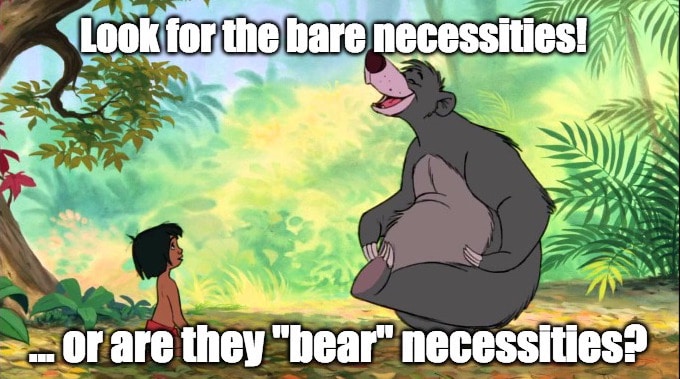
By
Last updated:
December 11, 2022
The Bare Necessities: 25 Pairs of English Homophones You’ll Need in Life
English pronunciation can be pretty weird.
If you’ve been learning English for even a short amount of time, you’ve probably noticed that, right?
Maybe you were surprised to discover that the number “two” was pronounced the same as the word “to.”
Or when you started learning the past tense, perhaps you thought it was strange that “ate” was pronounced the same as the number “eight.”
Believe me, this can also be strange and confusing for native English speakers, so you’re not alone.
Or is it “your not alone”? No, I’m just kidding, I did mean to say “you’re not alone,” but it’s true that you can find many examples of native speakers confusing sets of words like “you’re” and “your.”
Words like these, which sound the same but have different meanings, are called homophones. In this post, you’re going to learn over 25 pairs of homophones that you’ll definitely want to know. Let’s start by taking a closer look at the meaning of the word “homophone.”
Download:
This blog post is available as a convenient and portable PDF that you
can take anywhere.
Click here to get a copy. (Download)
What Is a Homophone?
As mentioned above, sets of words like “you’re” and “your” are called homophones. The root of that word, homo-, means “same,” and the root phone- means “sound.” Homophones are two words that sound the same, but have different meanings. So the words “two” and “to” are homophones, as are “ate” and “eight.”
There’s another word that begins with homo-, which native speakers often confuse with homophone: homonym. Again, the root homo- means “same,” but –nym means “name.” A homonym is a single word (with one spelling) that has more than one meaning.
An example of a homonym is the word “bear.” You probably know about the animal called a “bear,” but the word “bear” can also be a verb that means to tolerate. For example, “I’m so nervous about watching this game, I can’t bear to watch the last minute!” But today we’ll just focus on homophones.
Why Does English Have so Many Homophones?
A word’s pronunciation in English may not always be the same as its spelling. French is also similar in this way, because there can be multiple words with one pronunciation.
Chinese homophones are also really interesting. There’s even a famous Chinese story where every single word is some variation of the word “shi”!
Other languages, like Spanish or German, for example, are more consistent with spelling and pronunciation. In those languages, words usually sound like they’re spelled. Still, even those languages have some homophones at least. The point is that basically every language has homophones, so try not to get frustrated when you’re learning them.
However, English does have many vowel sounds, many silent letters, and lots of words that come from many other different languages. As a result, there are also lots of homophones in English.
To help you learn these, we’ve put together some cool tips, plus a handy list of some of the most common homophones in English.
How Can You Learn English Homophones?
There’s a popular saying in English: “Practice makes perfect.” That means that if you want to become an expert at something (like learning homophones or even English in general), you have to practice a lot. Fortunately, if you want to practice homophones, there are many ways to do so.
Vocabulary notebook
This is probably the easiest way to practice, and if you already have a piece of paper and a pen/pencil, it’s free!
If my students ask for ways to improve their vocabulary, I often suggest that they should always keep a small vocabulary notebook with them. I did this when I was learning German and Spanish, and you can do the same.
Every time you hear a new word or phrase, write it down in your notebook. You can also write down a definition, a synonym or an example sentence. All of those pieces will help you remember the word.
Naturally, you can use this same notebook for homophones. It might help to make a separate list or a separate section for homophones, but you can use whatever system works best for you.
Especially if you’re a visual learner or a person who learns things by writing them down (like I do), then this technique is a great way to add words to your English vocabulary.
Books with homophones
There are some books that specifically focus on homophones in a fun way. Two popular ones are “A Chocolate Moose for Dinner” and “The King Who Rained,” both by Fred Gwynne. Another is “Dear Deer” by Gene Barretta. You can find these books at bookstores or online, but it may be hard to find digital copies, since they’re a bit old.
There are also videos of people reading the books (here are the videos for “A Chocolate Moose for Dinner,” “The King Who Rained” and “Dear Deer”), but unfortunately the video quality isn’t always that good. Still, you can follow the stories and see some examples of fun wordplay using homophones.
Songs and sites online
As with so many things, the Internet can be a wonderful resource for learning English! You can find more information about the books I mentioned above, and there are also other sites and videos that people have made to help you learn homophones.
There are funny (and weird) videos like this homophone song video and this ballad between a man and a lion. Or, if you have 46 minutes, you’re welcome to watch this great but really long video that combines tons of English homophones, including their pronunciation! I’ll also include some links to videos and websites that can help with specific homophone sets in our list of homophones below.
Finally, there are other sites that can help you learn homophones. One that I recommend is called Grammarist.com. It includes other topics in addition to homophones, but it often features homophone sets. Plus, the other vocabulary is usually relevant to news events, so it’s a great general site if you want to build up your vocabulary.
Depending on how long you’ve been learning English, you may know a lot of these already. But I created this list so that even high-level English learners can find some new or interesting words. So hopefully there will be at least a few words that you didn’t know before!
For each set of words, I’ll include a short definition and an example of the words in use. Then I’ll include an interesting note related to the words, like a similar word or a link to a video, comic or website.
One more note, and then I promise we’ll get to the homophones. Most of these are homophones in any dialect of English, but because of small pronunciation differences, there are some words that are homophones in American English but not in British English, and vice-versa.
Also, there are a few homophones that are more common in American English than in British English, and vice-versa. You can find a list of specifically British homophones here, but again, most of them are also homophones in American English. Phew! Don’t worry if that sounded complicated, we’ll only focus on clear homophones today.
1. ate, eight
ate (verb): This is the simple past tense of the verb “to eat.”
I ate an entire pizza and now I’m really full and tired.
eight (noun): The number after seven and before nine.
Charles will wake up at eight o’clock tomorrow morning.
Interesting note: There is a popular children’s joke that goes like this:
Q: Why was 6 afraid of 7?
A: Because 7 ate 9.
Yes, it’s pronounced “because 7 8 9,” and yes, it’s a pretty bad joke. But most kids’ jokes are bad.
2. bare, bear
bare (adjective): If something is bare, it means that it’s not covered or not decorated.
Tom likes to walk around his house in bare feet. He says it’s more comfortable than wearing shoes.
bear (noun): A large mammal.
When you go camping, you should be careful to not leave any food or anything with a scent in your tent because they can attract bears.
Interesting note: Bears are often popular characters in stories and cartoons.
3. buy, by, bye
to buy (verb): A synonym of “to purchase.” It’s probably one of the first verbs you learned.
I forgot my money at home. Do you think you could buy me lunch and I’ll pay you back tomorrow?
by (preposition): This can be used in many different ways. It’s commonly used to mean “next to” or “near” when describing a location. It can also indicate who created something.
My favorite autobiography is “The Autobiography of Malcolm X.” It’s written by Malcolm X and Alex Haley.
bye (exclamation): This is a shortening of “goodbye.”
I’ve got to go now, so bye! See you on Sunday!
Interesting note: This is a set of three homophones, but you could also possibly include the prefix “bi-.” It means “two,” as in “bipedal” (something that uses two legs), but it can also be an adjective as an abbreviation for “bisexual.” So if you include “bi,” then this can actually be a set of four homophones!
4. cell, sell
cell (noun): A cell is a small area or room, usually in a prison. A cell can also be one of the smallest divisions of a living organism.
The prisoner spent 10 years in his cell.
to sell (verb): To exchange a product or service for money. Like “buy,” it was probably one of the first verbs you learned.
We would like to sell our car, but we don’t think we’d get very much money for it.
Interesting note: Monks (men) and nuns (women) are two groups of religious people who live in monasteries or convents. Their rooms are also called “cells,” and they actually do look a bit similar to a prison cell!
5. dew, do, due
dew (noun): Dew is the name for small drops of water that accumulate (gather) on plants and other objects outside during the night.
When I went outside early in the morning, the dew on the grass made my shoes wet.
to do (verb): This common verb is used to indicate an action. It can also be an auxiliary verb.
What do you usually do on Friday nights?
due (adjective): This is used to indicate the deadline (final day) that something can happen. It’s also used to indicate when a baby will probably be born.
My friend is pregnant. Her baby is due in October.
Interesting note: The soft drink company Mountain Dew played with this homophone set with its motto “Do the Dew.“
6. eye, I
eye (noun): The part of your body that you use to see.
My eyes hurt when I read. I think I need a pair of glasses.
I (pronoun): A first person singular subject pronoun.
I really hope you know what this word means.
Interesting note: This can actually be a three-word homophone if you include the word “aye.” That’s an old-fashioned way of saying “yes.” You might hear people on boats show that they’re following an order by saying “Aye-aye, captain!” And there’s a strange-looking animal called an “aye-aye,” also. I learned that just a minute ago, so even native speakers learn new words every day!
7. fairy, ferry
fairy (noun): A mythical creature that can often do magic.
There is a fairy named Tinkerbell in the story “Peter Pan.”
ferry (noun): A ferry is a boat that moves passengers and vehicles across water. It’s used for long distances or places where there are no bridges.
The ferry in Costa Rica is really hot and incredibly badly organized. At least the trip only takes an hour.
Interesting note: There is a common mythical fairy in some parts of the world called the Tooth Fairy. She’s especially popular in the USA. The story is that when a child loses a tooth, he or she should put the tooth under their pillow. Then, while they sleep, the Tooth Fairy will replace the tooth with a coin.
8. flour, flower
flour (noun): This is the main ingredient in bread. It’s a powder made from ground grains.
Tony wanted to make a cake, but he didn’t have any flour, so he couldn’t.
flower (noun): The decorative, colorful part of a plant.
If you want to give flowers to somebody you love, avoid white roses. They are often given when someone dies.
Interesting note: In some languages, there is an element that has a name similar to “flour.” But in English, the element is called “fluoride,” and the “u” is silent.
9. for, four
for (preposition): This preposition is usually used to indicate a person who receives something, or to indicate a purpose.
We wanted to buy a chocolate cake for Cheryl’s birthday. The bakery didn’t have any chocolate cakes for sale, though, so we got vanilla instead.
four (noun): The number after three and before five.
The Beatles, one of the most famous bands ever, had four members: George, John, Paul and Ringo.
Interesting note: This is another set of homophones that can also include a third: If you’re playing golf, you should yell “Fore!” right before you hit the ball. This warns other people to look out for your ball.
10. hear, here
to hear (verb): This is the action that you do with your ears. The sense is called “hearing.”
I can’t hear the TV. Can you please turn up the volume?
here (adverb): “Here” indicates the place where you are at any moment. It’s the opposite of “there,” basically.
Can you set the boxes down over here please? Yes, right here next to the door.
Interesting note: The expression “Hear, hear!” is used to indicate that you agree with something. But it’s usually used in formal situations, and it’s not very common in modern English.
11. hour, our
hour (noun): A period of time that lasts 60 minutes.
It takes about six hours to drive from San Francisco to Los Angeles.
our (pronoun): This is the possessive pronoun form of “we.”
We should study for our exams.
Interesting note: Depending on a speaker’s accent and the way they’re using the word, these two might not always sound like homophones. Also, to make things more confusing, the word “our” is sometimes pronounced as a homophone to “are.”
12. know, no
to know (verb): To have knowledge or understanding about something.
Reggie knows how to speak French.
no (determiner): This indicates a negation or something that’s not true.
There is no good reason to listen to Justin Bieber.
Interesting note: This pair of words made me think of some interesting songs. Radiohead has a song called “A Punchup at a Wedding (No no no no no no no no),” Beirut has one called “No No No” and Destiny’s Child has two songs called “No, No, No” (part 1 and part 2. Personally, I like part 2 better).
Also, I discovered that there is a Swedish band (that sings in English) called NONONO. See, you learn something new every day!
13. knight, night
knight (noun): A man given a special honor (or rank) by a king or queen. Their title is usually “Sir.”
One popular English legend talks about King Arthur and the Knights of the Round Table.
night (noun): The period of time when it’s dark and most people sleep.
I prefer to work at night, since it’s quieter and not as hot. I can concentrate better.
Interesting note: There was a popular TV show in the 1980s called “Knight Rider,” but many people thought it was “Night Rider.” It was actually called “Knight Rider” because the main character, played by David Hasselhoff, was named Michael Knight.
Also, an additional fun note: I live in Costa Rica, and here “Knight Rider” was called “El Auto Fantástico,” or “The Fantastic Car”!
14. mail, male
(to) mail (verb or noun): As a noun, this is a collective noun for letters and packages. As a verb, this means to send something to somebody. Email also comes from this word.
I haven’t gotten the mail yet today, but I was expecting a letter from grandma. Can you please check the mailbox?
male (adjective or noun): An adjective (or noun) indicating that something is masculine or has masculine reproductive organs.
People always ask if our cat is pregnant. I tell them he can’t be, since he’s a male. He’s just fat.
Interesting note: In British English, they usually use the word “post” as a verb or a noun, instead of “mail.”
15. marry, merry
to marry (verb): The action when two people have a wedding; also called “to get married.”
My grandpa told me to be sure to marry a good woman.
merry (adjective): A synonym for “happy,” but less common in modern English. Mostly used in phrases like “Merry Christmas!”
I don’t like to go shopping in December because the song “We Wish You a Merry Christmas” always gets stuck in my head.
Interesting note: This is another example of a three-word homophone set, if you include the name “Mary.”
16. meat, meet
meat (noun): Edible flesh from an animal.
Vegetarians don’t eat meat.
to meet (verb): When you are introduced to a person for the first time. It can also refer to later meetings.
I’m excited to travel to England so I can meet some new people!
Interesting note: In English, you can generally only meet people, but not places. If you want to talk about seeing a place for the first time, you could say something like “I want to see Paris,” “I want to go to Paris,” or “I want to visit Paris.” But we generally don’t use the words “meet” or “know” with places.
17. pair, pear
pair (noun): A set of two things that go together.
Most of these examples of homophone sets are pairs of words, but some are groups of three or four words.
pear (noun): A delicious fruit.
I wanted to buy pears for my fruit salad, but they only had winter pears. I don’t like winter pears very much because they’re hard, so I got peaches instead.
Interesting note: This can also be a set of three words if you include the less-common verb to pare. It means to cut something to make it smaller.
18. right, write
right (adjective): This can mean either a synonym of “correct” or the opposite of “left.”
I should turn right when I get to 10th Street, right?
to write (verb): The action of making words or marks to represent ideas.
Jerry’s dream is to write a novel, but he hasn’t decided what the book should be about.
Interesting note: This can be yet another homophone set of three words if you include “rite,” which is a ceremony or ritual. There is also a common last name “Wright,” which is pronounced the same as “right,” “write” and “rite.”
19. sight, site
sight (noun): This is the sense that you use when you see or look.
Blind people can’t see. They have no sight.
site (noun): This is a synonym for “place.” The most common modern use is in the word “website.”
There’s an awesome site for language learners.
Interesting note: You guessed it: This can be another three-word set if you include the word “to cite,” which means “to reference.” For example, it’s commonly used in academic papers that have citations of other books.
20. son, sun
son (noun): A male child.
Grandma and grandpa had four sons and three daughters.
sun (noun): The star at the center of our solar system. It’s that big yellow thing in the sky during the day.
Don’t look directly at the sun, or you’ll damage your eyes. You may even lose your eyesight!
Interesting note: Don’t forget that the word “sons” only indicates males, and “daughters” is just females. If you want to indicate “sons and daughters” with only one word, you can say “children” (even if you’re talking about adults).
21. their, there, they’re
their (pronoun): The possessive pronoun for the subject “they.”
We should study for our English exam, and they should study for their German exam.
there (adverb): Remember the word “here” above? This is basically the opposite of that. “There” can refer to any place where you are not at.
Who is that over there? Is that Jane? If so, I hope she comes over here, since I want to talk to her.
they’re (contraction): This is a contraction of the phrase “they are.”
The children all passed their exams, so they’re very happy!
Interesting note: This is a bit funny, because this set of homophones actually seems to cause more trouble for native speakers than it does for English learners. There are even some great videos that are designed for native speakers, but people still get confused.
22. to, too, two
to (preposition): This usually indicates a direction that something is moving.
Every day Paul and Judy drive together to school.
too (adverb): “Too” can usually either mean “also,” or it can indicate that there is more of something than necessary (and it’s usually a problem).
I’m too full to finish this plate of food. I’ll ask the waiter if we can have a container to take it home. And I’ll ask for the bill, too.
two (noun): The number after one and before three.
Most homophone sets have two words, but some have three or four.
Interesting note: This is another set of homophones that confuse native speakers, too. But of course there are some fun videos available to help you!
23. one, won
one (noun): The number after zero and before two.
The musical group Three Dog Night said that one was the loneliest number.
won (verb): “Won” is the simple past and past participle form of the verb “to win.”
Grandpa won $500 in his poker game!
Interesting note: When you use a form of the verb “to win,” you can either indicate the event or the prize, but not the opponent. If you want to indicate the opponent, use the verb “to beat.” So in the example above, you could say “grandpa won $500″ or “grandpa won the poker game,” but you would say “grandpa beat all of his poker friends.”
24. wait, weight
to wait (verb): This means to stay in one place or to anticipate something.
It was snowing a lot, so the bus came late. I had to wait in the cold for 20 minutes.
weight (noun): This word indicates how heavy something is.
Every year around Christmas, many people gain a lot of weight because they eat lots of food but don’t exercise.
Interesting note: If you want to determine a person or an object’s weight, then the verb is “to weigh.” The machine you use to weigh something is called a scale.
25. wear, where
to wear (verb): To have clothing or accessories on your body.
I hate wearing ties. They’re uncomfortable, hot, and hard to tie. Do you wear ties?
where (interrogative): A question word used to ask for a location.
Where should we meet for dinner? Personally, I’d like to meet at the new Chinese restaurant in town.
Interesting note: Since this is our last set for this article, of course I’ll include another word for this homophone set: “ware.” It’s a suffix that indicates objects that are related. For example, stores often have housewares and kitchenware departments that sell things to use in your home or kitchen.
That’s it for today’s list! I hope that you learned some new words—I know I did! Happy learning!
Download:
This blog post is available as a convenient and portable PDF that you
can take anywhere.
Click here to get a copy. (Download)
Homophones examples with meaning!
A homophone is a word that has almost the same pronunciation as the other word but has a different meaning. Homophones are word that has different spellings, and different meaning i.e.
- Sun – Son
- Able – Abel
- Marry – Merry
- Mare – Mere
What is the difference between homophones, homonyms, and homographs?
Homophones are words with different spellings and different meanings, but they sound the same i.e. Sun-Son, etc. on the other hand homonyms are words that have the same sound and same spellings i.e. Address – Address, Band – Band.
1. Homophones
- Brake/Break
- Cell/Sell
2. Homonyms
- Bat – Bat.
- Match – Match.
3. Homographs (words that are spelled the same, and are of different origin)
- sow (verb) – to plant seed / sow (noun) – female pig
Also Check: 300+ Forms of Verb List
Homophones Examples with Meaning in English PDF file is available for download at the bottom of this article.
| Homophones | Meaning | |
| 1. | Abject
Object |
Hateful
Purpose |
| The poor surroundings caused abject misery.
Can you describe the object? |
||
| 2. | Adapt
Adopt |
Make according
Take on, Accept |
| He needed to adapt his strategies when dealing with her.
They decided to adopt a child. |
||
| 3. | Admit
Confess |
Got admission
Accept mistake |
| Don’t be afraid to admit to your mistakes.
I confess to some suspicion of your honesty. |
||
| 4. | Affect
Effect |
Mask, show something else
Result |
| Colorado was affected by severe flooding last summer.
The snow had a predictable effect on traffic. |
||
| 5. | Oar
Ore |
a pole with a flat blade
Ore is a rock that contains minerals like iron |
| We each took an oar.
Iron ores have been found in most of the states |
||
| 6. | Lessen
Lesson |
Reduce something
tutorial |
| They gave her an injection to lessen the pain.
I enjoyed the lesson on world history. |
||
| 7. | Loath
Loathe |
Not Agreed
Hate for |
| The little girl was loath to leave her mother.
I loathe these horrible roads, but I love the places they take you. |
||
| 8. | Lose
Loose |
Left
Not fixed in place |
| I lose a lot of money during Pandemic.
This tooth is loose. |
||
| 9. | Marry
Merry |
Join together (Husband wife relation)
Happy, joy |
| John Wants to Marry Jackeline.
He laughed at that, and his laugh was merry and frank. |
Homophones examples with meaning – Image 1
| 10. | Mare
Mere |
Female horse
Just, bit |
| She urged her mare to jump the fence.
I have mere two coins. |
||
| 11. | Miner
Minor |
Digger
Tint, small |
| My friend is a miner.
He suffered a minor heart attack. |
||
| 12. | Feat
Feet |
Exercise for others fun
paw, forepaw, hind paw, hoof |
| It’s no wonder fans are fascinated by the feat..
Her feet are nice and clean. |
||
| 13. | Float
Swim |
Hover, slide, flow
Dip, Dive |
| Cork can float on water.
Rima knows how to swim. |
||
| 14. | Foul
Fowl |
Wrong play
Bird |
| Please stop playing foul games.
Fowl is a beautiful bird. |
||
| 15. | Heal
Heel |
Cure, remedy, restore
Shoe base |
| Doctor has no heal for his pain.
She was looking gorgeous in her black heals. |
||
| 16. | Industrial
Industrious |
Related to factory and manufacturing
Hardworking |
| Industrial growth is of vital importance for a Country.
His brother is a industrious person. |
||
| 17. | Sore
Soar |
Painful
Lift, zoom, moving upwards |
| She rubbed a sore spot in her lower back.
An eagle was soaring high up in the air. |
||
| 18. | Stair
Stare |
Lift
Look, gaze |
| She tripped over a stair and landed hard.
Stop Staring at me. |
||
| 19. | Steal
Steel |
Act of thief, swipe, sneak
Metal |
| Your goal is to steal a necklace with a red gem on it.
He emerged from the thick steel walls into the sunlight. |
Homophones examples with meaning – Image 2
| 21. | Vain
Vein |
No gain
Rug, skin tube, blood vessels |
| I too hoped and waited for one until now- but in vain.
The veins in his hands are really thick and easy to see under the skin. |
||
| 22. | Waist
Waste |
Midsection of human body
Garbage |
| He put an arm around her waist and kissed her cheek.
I consigned her letter to the waste basket. |
||
| 23. | Calendar
Calendar |
Date teller
A machine that can smooth cloth |
| Do you have next year’s calendar?
Calender is glazing coater matching equipment. |
||
| 24. | Casual
Causal |
Effort less
Lesson giving, creative |
| He tried to look casual.
No causal connection between the events was found. |
||
| 25. | Artist
Artiste |
Actor
Related to singing |
| Everyone wanted to meet the artist and discuss the work they were interested in.
She was a popular French music hall artiste in the late 19th century. |
1000 List of Homophones Examples
Here is the list of Common homophones:
- tail – tale
- sort – sought
- missed – mist
- curb – herb
- wart – wort
- pole – poll
- him – hymn
- eery – eyrie
- watt – what
- poof – pouffe
- him – hymn
- ewe – yew – you
- yaw – yore – your – you’re
- thyme – time
- oh – owe
- bare – bear
- wait – weight
- pi – pie
- hear – here
- board – bored
- aye – eye – I
- were – whirr
- raw – roar
- jewel – joule
- fie – phi
- sauce – source
- liar – lyre
- gilt – guilt
- cast – caste
- rough – ruff
- lay – ley
- furs – furze
- bur – burr
- shoe – shoo
- mall – maul
- hay – hey
- clack – claque
- straight – strait
- Sole – Soul
- meat – meet – mete
- coo – coup
- whirled – world
- review – revue
- knob – nob
- flea – flee
- Stile – Style
- Soar – Sore
- mean – mien
- complement – compliment
- talk – torque
- spa – spar
- mode – mowed
- cymbal – symbol
- woe – whoa
- throes – throws
- od – odd
- bard – barred
- tole – toll
- palate – palette – pallet
- bean – been
- allowed – aloud
- Sauce – Source
- licence – license
- giro – gyro
- caster – castor
- role – roll
- lac – lack
- for – four
- braid – brayed
- tor – tore
- paten – patten – pattern
- beau – bow
- altar – alter
- vale – veil
- peace – piece
- bight – bite – byte
- auger – augur
- rose – rows
- larva – lava
- franc – frank
- brews – bruise
- scene – seen
- lieu – loo
- gorilla – guerilla
- cede – seed
- which – witch
- real – reel
- knead – need
- fir – fur
- you’ll – yule
- tide – tied
- one – won
List of Homophone Examples – Image 1
- baron – barren
- wait – weight
- pica – pika
- heard – herd
- boarder – border
- sew – so – sow
- mail – male
- hangar – hanger
- choir – quire
- root – route
- laps – lapse
- foul – fowl
- bread – bred
- road – rode
- know – no
- flour – flower
- bough – bow
- tare – tear
- spade – spayed
- moor – more
- dam – damn
- terce – terse
- nay – neigh
- die – dye
- bait – bate
- waive – wave
- place – plaice
- he’d – heed
- bold – bowled
- sear – seer – sere
- loot – lute
- hail – hale
- cereal – serial
- whig – wig
- real – reel
- knew – new
- fir – fur
- told – tolled
- pair – pear
- beach – beech
- all – awl
- weaver – weever
- rain – reign – rein
- in – inn
- feat – feet
- there – their – they’re
- none – nun
- done – dun
- ball – bawl
- rye – wry
- lead – led
- gallop – galop
- buy – by – bye
- roe – row
- laager – lager
- for – fore – four
- brae – bray
- storey – story
- sole – soul
- meat – meet
- complement – compliment
- sea – see
- loan – lone
- grisly – grizzly
- censer – censor – sensor
- to – too
- packs – pax
- bay – bey
- ad – add
- tire – tyre
- packed – pact
- base – bass
- accessary – accessory
- shear – sheer
- maize – maze
- haw – hoar – whore
- cite – sight – site
- swat – swot
- Some – Sum
- meter – metre
- cousin – cozen
- sail – sale
- leak – leek
- gamble – gambol
- buyer – byre
- rouse – rows
- lea – lee
- gait – gate
- but – butt
- wail – wale – whale
- peal – peel
- bitten – bittern
- aural – oral
- See – Sea
- made – maid
- hair – hare
- cheap – cheep
- stalk – stork
- shore – sure
- manna – manner
- clew – clue
- wall – waul
- plain – plane
- heroin – heroine
- boos – booze
- tuba – tuber
- pea – pee
- berry – bury
- aren’t – aunt
- team – teem
- stair – stare
- morning – mourning
- desert – dessert
- rota – rotor
- lase – laze
- freeze – frieze
- bridal – bridle
- root – route
- lam – lamb
- forth – fourth
- brake – break
- war – wore
- plain – plane
- hew – hue
- draft – draught
- Stare – Stair
- sic – sick
- mantel – mantle
- climb – clime
- ware – wear – where
- pleas – please
- hi – high
- dual – duel
- stationary – stationery
- sight – site
- marshal – martial
- coarse – course
- wood – would
- throne – thrown
List of Homophone Examples – Image 2
- ode – owed
- bare – bear
- Sun – Son
- some – sum
- metal – mettle
- council – counsel
- troop – troupe
- pawn – porn
- bel – bell – belle
- arc – ark
- we’d – weed
- raise – rays – raze
- indict – indite
- ferrule – ferule
- whine – wine
- rest – wrest
- knight – night
- flair – flare
- white – wight
- right – rite – wright – write
- knot – not
- flex – flecks
- tear – tier
- stake – steak
- muscle – mussel
- deviser – divisor
- wet – whet
- read – red
- key – quay
- file – phial
- warn – worn
- plum – plumb
- higher – hire
- earn – urn
- taught – taut – tort
- staid – stayed
- moose – mousse
- days – daze
- ring – wring
- know – no
- flour – flower
- born – borne
- wax – whacks
- poor – pour
- ho – hoe
- eye – I
- weir – we’re
- rap – wrap
- it’s – its
- few – phew
- way – weigh
- practice – practise
- hoard – horde
- fah – far
- way – weigh – whey
- praise – prays – preys
- hoarse – horse
- faint – feint
- sale – sail
- lean – lien
- gays – gaze
- calendar – calender
- we – wee – whee
- pray – prey
- hole – whole
- fair – fare
- to – too – two
- pail – pale
- bazaar – bizarre
Homophone Examples – Image 3
- ail – ale
- sane – seine
- lessen – lesson
- genes – jeans
- call – caul
- weak – week
- principal – principle
- holey – holy – wholly
- fair – fare
- tern – turn
- nigh – nye
- discreet – discrete
- baize – bays
- weak – week
- principal – principle
- hour – our
- farther – father
- weal – we’ll – wheel
- profit – prophet
- hour – our
- fate – fête
- waist – waste
- peer – pier
- hear – here
- boar – bore
- axel – axle
- saver – savour
- licker – liquor
- gnaw – nor
- caught – court
- rote – wrote
- law – lore
- friar – fryer
- broach – brooch
- wean – ween
- profit – prophet
- idle – idol
- faun – fawn
- waist – waste
- pedal – peddle
- heal – heel – he’ll
- bloc – block
- awe – oar – or – ore
- tough – tuff
- pause – paws – pores – pours
- beer – bier
- ante – – anti –
- wear – where
- quarts – quartz
- idle – idol
- fay – fey
- Steal – Steel
- sink – synch
- mask – masque
- coign – coin
- while – wile
- reek – wreak
- knight – night
- fizz – phiz
- stile – style
- sloe – slow
- me – mi
- complacent – complaisant
- satire – satyr
- levee – levy
- gild – guild
- canvas – canvass
- tacks – tax
- son – sun
- mind – mined
- crews – cruise
- shake – sheikh
- main – mane
- hart – heart
- chord – cord
- seas – sees – seize
- made – maid
- hair – hare
- cereal – serial
- weather – whether
- quean – queen
- in – inn
- faze – phase
- steal – steel
- sign – sine
- marten – martin
- coarse – course
- Rode – Road
- knows – nose
- foaled – fold
- boy – buoy
- teas – tease
- naval – navel
- dew – due
- bail – bale
- sweet – suite
- some – sum
- might – mite
- creak – creek
- wheald – wheeled
- read – reed
- knave – nave
- find – fined
- whirl – whorl
- retch – wretch
- knit – nit
- flaw – floor
- yoke – yolk
- tic – tick
- one – won
- bark – barque
- Scene – Seen
- links – lynx
- grate – great
- ceiling – sealing
- sea – see
- load – lode
- greys – graze
- cell – sell
- Tail – Tale
- son – sun
- miner – minor – mynah
- cue – kayo – queue
- rung – wrung
- leach – leech
- galipot – gallipot
- buy – by
- vain – vane – vein
- peace – piece
- berth – birth
- ate – eight
- vial – vile
- peak – peek – peke – pique
- billed – build
- auk – orc
- stationary – stationery
- side – sighed
- mare – mayor
- close – cloze
- Stationary – Stationery
- Side – Sighed
- mark – marque
- coal – kohl
- seam – seem
- loop – loupe
- guessed – guest
- cent – scent – sent
- saw – soar – sore
- lie – lye
List of Homophone Examples – Image 4
- gneiss – nice
- caw – core – corps
- toad – toed – towed
- pain – pane
- be – bee
- air – heir
- roo – roux – rue
- lade – laid
- foreword – forward
- braise – brays – braze
- their – there
- none – nun
- doe – doh – dough
- bald – bawled
- steal – steel
- slay – sleigh
- maw – more
- colonel – kernel
- ton – tun
- pascal – paschal
- beat – beet
- alms – arms
- te – tea – tee
- stair – stare
- morning – mourning
- dear – deer
- tale – tail
- Sort – Sought
- moat – mote
- currant – current
- sew – so
- mail – male
- hall – haul
- check – cheque
- toe – tow
- pair – pare – pear
- be – bee
- aisle – isle
- wain – wane
- pearl – purl
- heal – heel
- blew – blue
- away – aweigh
- whit – wit
- rheum – room
- knock – nock
- flew – flu – flue
- who’s – whose
- right – write
- knot – not
- floe – flow
- rood – rude
- lain – lane
- fort – fought
- brake – break
- scull – skull
- lo – low
- greave – grieve
- cell – sell
- suite – sweet
- sole – soul
- medal – meddle
- cops – copse
- threw – through
- oar – or
- douse – dowse
- band – banned
- seam – seem
- locks – lox
- groan – grown
- cent – scent
Homophones List Examples – Image 5
Homophones examples with meaning – Image 3
Homophones examples with meaning – Image 4
Homophones examples with meaning – Image 5
Homophones examples with meaning
Download pdf
crackthunder.com
fullwarezcracks.com
techiedownloads.com
usecrack.com
imagerocket.net
techbytecode.com
pspdev.org
takwin.info
in-kahoot.com
A List of Easily Confused Words With Practice Exercises
A bare bear.
GeoStock/Getty Images
Homonyms are two or more words that have the same sound or spelling but differ in meaning. Homophones—which means «same sounds» in Latin—are two or more words, such as knew and new or meat and meet, that are pronounced the same but differ in meaning, origin, and often spelling. Homographs, meanwhile, are words that have the same spelling but differ in origin, meaning, and sometimes pronunciation, such as the verb bear (to carry or endure) and the noun bear (the animal with a shaggy coat).
Words that fall under any of these three categories often confuse readers and writers alike. But they need not perplex you: Understanding the meaning of these three grammatical terms and, especially, being able to recognize them can help clear up any confusion. A list of some of the most common homonyms, homophones, and homographs can help any writer use these words correctly and any reader or listener recognize them when they occur.
Homonyms, Homophones, and Homographs
Here is a listing of some the most common homonyms, homophones, and homographs. The first column contains homonyms in alphabetical order, while the second and third columns list the corresponding homonym, homophone, or homograph as applicable.
| accept — take in | except — other than | |
| ad — advertisement | add — join, combine | |
| advice — guidance | advise — recommend | |
| aid — assist, assistance | aide — one who gives assistance | |
| ail — to suffer poor health | ale — a beverage | |
| air — atmosphere | ere — before | heir — one who inherits property |
| aisle — a passage | I’ll — contraction of I will | isle — island |
| allusion — an indirect reference | illusion — false appearance | |
| altar — table in a church | alter — to change | |
| ate — past tense of eat | eight — the number 8 | |
| bail — to clear water | bail — release of a prisoner | bale — a large bundle |
| band — a ring, something that binds | band — a group | banned — prohibited |
| bare — uncovered | bear — large animal | bear — support, yield |
| bases — starting points | bases — four stations on a baseball field | basis — a basic principle |
| beat — to strike, overcome | beat — exhausted | beet — a plant with red roots |
| blew — past tense of blow | blue — the color | |
| bread — baked food item | bred — produced | |
| buy — purchase | by — near, through | bye — goodbye |
| capital — punishable by death | capital — chief city | capitol — building where legislature meets |
| ceiling — top of a room | sealing — setting, fastening | |
| cell — compartment | sell — vend | |
| cent — penny coin | scent — an odor | sent — past tense of send |
| cereal — breakfast food | serial — sequential | |
| chews — gnaws with teeth | choose — to select | |
| Chile— country in South America | chili — bean stew | chilly — frosty |
| chord — musical tone | cord — rope | |
| cite — quote | site — location | sight — view |
| close — opposite of open | clothes — clothing | |
| coarse — rough | course — path, procedure | |
| complement – enhance; go together | compliment — praise | |
| conduct — behavior | conduct — to lead | |
| council — committee | counsel — guidance | |
| creak — squeak | creek — stream of water | |
| crews — gangs | cruise — ride on a boat | |
| days — plural of day | daze — stun | |
| dear — darling | deer— woodland animal | |
| desert — to abandon | desert — dry land | dessert — after-dinner treat |
| dew — morning mist | do — operate | due — payable |
| die — cease to exist | dye — color | |
| discreet — tactful | discrete — distinct | |
| doe — female deer | dough — uncooked bread | |
| dual — double | duel — battle | |
| elicit — draw out | illicit — illegal | |
| eminent — distinguished | imminent — soon | |
| ewe — female sheep | you — second-person personal pronoun | |
| eye — sight organ | I — first-person personal pronoun | |
| facts — true things | fax — a document transmitted via telephone | |
| fair — equal | fare — price | |
| fairy — elflike creature with wings | ferry — boat | |
| faze — impact | phase — stage | |
| feat — achievement | feet — plural of foot | |
| find — to discover | fined — charged a penalty | |
| fir — type of tree | fur — animal hair | |
| flea — small biting insect | flee — run | |
| flew — did fly | flu — illness | |
| flour — powdery, ground up grain | flower — blooming plant | |
| for — on behalf of | fore — front | four — three plus one |
| forth — onward | fourth — number four | |
| foreword — introduction to a book | forward — advancing | |
| gene — a chromosome | jean — fabric; pants | |
| gorilla — big ape | guerrilla — warrior | |
| grease — fat | Greece — country in Europe | |
| groan — moan | grown — form of grow | |
| hair — head covering | hare — rabbit-like animal | |
| hall — passageway | haul — tow | |
| halve — cut in two parts | have — possess | |
| hay — animal food | hey — interjection to get attention | |
| heal — mend | heel — back of foot | |
| hear — to listen | here — at this place | |
| hi — hello | high — up far | |
| hoarse — croaky | horse — riding animal | |
| hole — opening | whole — entire | |
| holey — full of holes | holy — divine | wholly — entirely |
| hoarse — rough voice | horse — animal | |
| hour — sixty minutes | our — belonging to us | |
| knead — massage | need — desire | |
| knew — did know | new — not old | |
| knight — feudal horseman | night — evening | |
| knot — tied rope | not — negative | |
| know — have knowledge | no — opposite of yes | |
| lead — metal | led — was the leader | |
| leased — past tense of lease | least — the minimum | |
| lessen — make smaller | lesson — class | |
| loan — lend | lone — solitary | |
| made — did make | maid — servant | |
| mail — postage | male — opposite of female | |
| material — matter | materiel — supplies for an organization, particularly the military | |
| marry — to wed | merry — very happy | |
| meat — animal protein | meet — encounter | |
| mince — to chop finely | mints — type of sweet | |
| morning — a.m. | mourning — remember the dead | |
| none — not any | nun — woman who takes special vows | |
| oar — boat paddle | or — otherwise | ore — mineral |
| oh — expression of surprise or awe | owe — be obligated | |
| one — single | won — did win | |
| overdo — do too much | overdue — past due date | |
| pail — bucket | pale — not bright | |
| pain — hurt | pane — window glass | |
| peace — calm | piece — segment | |
| peak – highest point | peek — glance | |
| patience — being willing to wait | patients — person treated in a hospital or by a doctor | |
| pear — a type of fruit | pair — two (usually matching) | |
| plain — ordinary | plane — flight machine plane; flat surface | |
| pole — post | poll — survey | |
| poor — not rich | pour — make flow | |
| pray — implore God | prey — quarry | |
| principal — most important | principle — belief | |
| rain – water from sky | rein — bridle | |
| rap — tap | wrap — drape around | |
| read — past tense of the verb to read | red — color | |
| real — factual | reel — roll | |
| right — correct; not left | write — scribble | |
| ring — encircle | wring — squeeze | |
| road — street | rode — past tense of ride | |
| role — function | roll — rotate | |
| rose — flower | rows — lines | |
| sail — move by wind power | sale — bargain price | |
| scene — landscape | seen — viewed | |
| sea — ocean segment | see — observe with eyes | |
| seam — joining edge | seem — appear | |
| sew — connect with thread | so — as a result | sow — plant |
| soar — ascend | sore — hurt place | |
| sole — single | soul — essence | |
| son — male child | sun — the star that lights the solar system | |
| some — a few | sum — amount | |
| stair — step | stare — to look at steadily | |
| steal — swipe | steel — alloy | |
| suite — large room in a hotel | sweet — the opposite of sour | |
| tail — animal’s appendage | tale — story | |
| their — belonging to them | there — at that place | they’re — they are |
| threw — past tense of throw | through — passing from one place to another | |
| to — toward | too — also | two — the number 2 |
| toe — foot appendage | tow — pull along | |
| vary — differ | very — wail — howl | |
| wail — howl | whale — huge sea mammal | |
| waist — area below ribs | waste — squander | |
| wait – kill time | weight — measurable load | |
| war — battle | wore — did wear | |
| warn — caution | worn — used | |
| way — path | weigh — measure mass | |
| we — us | wee — tiny | |
| weak — not strong | week — seven days | |
| wear — to don attire | where — question word | |
| weather — climate | whether — if | |
| which — that | witch — sorcerer | |
| wood — material coming from trees | would — conditional auxiliary | |
| your — belonging to you | you’re — you are |
Practice Using Homonyms, Homophones, and Homographs
Complete each of the following sentences by filling in the blank with the correct word. You’ll find the answers at the end of the exercise. To heighten interest, all of the sentences are quotes from various authors’ writings in books and magazine articles published over the years. Feel free to use the previous table to help you if you get stumped.
- “He simply sat down on the ledge and forgot everything _____ [accept or except] the marvelous mystery.”
— Lawrence Sargent Hall - «I live in the Oakland Hills in a tiny house on a street so windy you can’t drive more than ten miles per hour. I rented it because the _____ [ad or add] said this: ‘Small house in the trees with a garden and a fireplace. Dogs welcome, of course.'»
— Pam Houston - «Francis wondered what _____ [advice or advise] a psychiatrist would have for him.»
— John Cheever - «The _____ [aid or aide] gets out of the way, picking her skirt out of the rubble of children at her feet.»
— Rosellen Brown - «He seemed to want to recapture the cosseted feeling he’d had when he’d been sick as a child and she would serve him flat ginger _____ [ail or ale], and toast soaked in cream, and play endless card games with him, using his blanket-covered legs as a table.»
— Alice Elliott Dark - «He sat down and leaned forward, pulling the chair’s rear legs into the _____ [air, ere, or heir] so that the waitress could get by.»
— Stanley Elkins - «[T]he stewardess was moving down the _____ [aisle, I’ll, or isle], like a trained nurse taking temperatures in a hospital ward, to see that they were all properly strapped in for the take-off.»
— Martha Gellhorn - «Mrs. Parmenter laughed at his _____ [allusion or illusion] to their summer at Mrs. Sterrett’s, in Rome, and gave him her coat to hold.»
— Willa Cather - «In the long years between, she had fashioned many fine dresses—gowned gay girls for their conquests and robed fair brides for the _____ [altar or alter].»
— Mary Lerner - «On a Saturday morning soon after he came to live with her, he turned over her garbage while she was at the grocery store and _____ [ate or eight] rancid bacon drippings out of a small Crisco can.»
— Pam Durban - «The barn was bigger than a church, and the fall’s fresh hay _____ [bails or bales] were stacked to the roof in the side mows.»
— John Updike - «Her two spare dresses were gone, her comb was gone, her checkered coat was gone, and so was the mauve hair-_____ [band or banned] with a mauve bow that had been her hat.»
— Vladimir Nabokov - «Without the shelter of those trees, there is a great exposure—back yards, clotheslines, woodpiles, patchy sheds and barns and privies—all _____ [bare or bear], exposed, provisional looking.»
— Alice Munro - «This was the time when outfields were larger than they are today and well-hit balls would roll for a long time, giving runners ample time to round the _____ [bases or basis] for a home run.»
— Deidre Silva and Jackie Koney - «The conductor had his knotted signal cord to pull, and the motorman _____ [beat or beet] the foot gong with his mad heel.»
— Saul Bellow - «Nancy held the cup to her mouth and _____ [blew or blue] into the cup.»
— William Faulkner - «A pigeon landed nearby. It hopped on its little red feet and pecked into something that might have been a dirty piece of stale _____ [bread or bred] or dried mud.»
— Isaac Bashevis Singer - «He was wearing a new hat of a pretty biscuit shade, for it never occurred to him to _____ [buy, by, or bye] anything of a practical color; he had put it on for the first time and the rain was spoiling it.»
— Katherine Anne Porter
Answers to the Exercise
1. except 2. ad 3. advice 4. aide 5. ale 6. air 7. aisle 8. allusion 9. altar 10. ate 11. bales 12. band 13. bare 14. bases 15. beat 16. blew 17. bread 18. buy
Sources
- Hall, Lawrence Sargent. «The Ledge.» The Hudson Review, 1960.
- Houston, Pam. «Waltzing the Cat.» Washington Square Press, 1999, New York.
- Cheever, John. «The Country Husband.» The New Yorker, 1955.
- Brown, Rosellen. «How to Win.» The Massachusetts Review, 1975.
- Dark, Alice Elliott. «In the Gloaming.» The New Yorker. 1994.
- Elkins, Stanley. «Criers and Kibitzers, Kibitzers and Criers.» Perspective, 1962.
- Gellhorn, Martha. «Miami-New York.» The Atlantic Monthly, 1948.
- Cather, Willa. «Double Birthday.» «Uncle Valentine and Other Stories.» University of Nebraska Press, Lincoln, Neb., 1986.
- Lerner, Mary. «Little Selves.» The Atlantic Monthly, 1915.
- Durban, Pam. «Soon.» The Southern Review, 1997.
- Updike, John. «My Father’s Tears and Other Stories.» Knopf, 2009, New York.
- Nabokov, Vladimir «That in Aleppo Once…» The Atlantic Monthly, 1944.
- Munro, Alice. «Meneseteung.» The New Yorker, 1989.
- Silva, Deidre, and Koney, Jackie. «It Takes More Than Balls: The Savvy Girls’ Guide to Understanding and Enjoying Baseball.» Skyhorse, 2008, New York.
- Bellow, Saul. «A Silver Dish.» The New Yorker, 1979.
- Faulkner, William. «That Evening Sun Go Down.» The American Mercury, 1931.
- Singer, Isaac Bashevis. «The Key.» «A Friend of Kafka.» Farrar, Straus and Giroux, 1979, New York.
- Katherine Anne Porter, «Theft.» The Gyroscope, 1930.
Homophones are words that sound the same but are spelled differently and have different meanings.
What are Homophones?
A homophone is a word that is pronounced the same (to varying extent) as another word but differs in meaning. A homophone may also differ in spelling. The two words may be spelled the same, such as rose(flower) and rose (past tense of “rise”), or differently, such as carat, caret, and carrot, or to, two, and too.
The term “homophone” may also apply to units longer or shorter than words, such as phrases, letters, or groups of letters which are pronounced the same as another phrase, letter, or group of letters.
Homophones that are spelled the same are also both homographs and homonyms.
Homophones that are spelled differently are also called heterographs. A word or unit with this property is said to be “homophonous”.
List of Most Commonly Confused Homophones
1. Ad – Add
- We put an ad in the local paper.
- Do you want to add your name to the list?
2. Allowed – Aloud
- Passengers are allowed one item of hand luggage each.
- The pain made him cry aloud.
3. Ate – Eight
- We ate at a pizzeria in town.
- My parents died when I was eight.
4. Bare – Bear
- She felt the warm sun on her bare arms.
- She was afraid she wouldn’t be able to bear the pain.
5. Blew – Blue
- They failed to put clear blue water between themselves and their competitors.
- She blew onto her coffee to cool it down.
6. Bored – Board
- After a while, I got bored and left.
- The plan of the new building is displayed on a board at the back of the room.
7. Break – Brake
- I had to break a window to get into the house.
- The traffic lights turned green and I released the brake.
8. Buy – Buy – Bye
- The money will be used to buy equipment for the school.
- We are all alarmed by the rise in violent crime.
- Bye, Dave.
9. Cellar – Seller
- I went down into the cellar for more wine.
- The law is intended to protect both the buyer and the seller.
10. Cereal – Serial
- Eaten with milk or cream, they made an acceptable breakfast cereal.
- Their letters of planning went back and forth like installments of a serial.
11. Coarse – Course
- The coarse sand was hot and rough under her feet.
- Andy’s doing a one-year journalism course.
12. Deer – Dear
- A deer makes tracks in the snow.
- Congratulations to you my dear brother on all your fine accomplishments in school.
13. Doe – Dough
- Ezra waited for the doe to open its eyes and look at him.
- Mix lemon juice and milk; stir into flour mixture until dough leaves side of bowl and forms a ball.
14. Draft – Draught
- This is only the first draft of my speech.
- A cold draught of air blew in from the open window.
15. Farther – Father
- We decided not to go any farther.
- Andrew was very excited about becoming a father.
16. Fir – Fur
- You always clear away the soft topsoil till you get a fir base.
- There was cat fur all over the chair.
17. Flea – Flee
- A water flea that is starving in a crowded pond is the victim not of food shortage but of competition.
- He gathered what money he had just in case Gallagher was forced to flee.
18. Flour – Flower
- They said the protesters let off stink bombs and covered four players with eggs and flour.
- She bent down and picked a flower.
19. For – Four
- We got a new table for the dining room.
- Don’t let this go further than these four walls.
20. Foreword – Forward
- He was asked if he would consider writing a foreword for her book.
- They ran forward to welcome her.
21. Fort – Fought
- Just the three of you going to be holding the fort tonight.
- He fought many battles with the early Labor party in Lancaster and discrimination against socialist employees was alleged.
22. Foul – Fowl
- He woke up with a foul taste in his mouth.
- Fish, fowl and meat, most with a decidedly Southwestern treatment, are represented on the menu.
23. Genes – Jeans
- The actual number of human genes is still in dispute.
- Her hair looked dishevelled, as did the sweatshirt and jeans she was wearing.
24. Hear – Here
- I could hear the sound of traffic.
- This switch here controls the lights.
25. Hole – Whole
- The bomb blew a huge hole in the ground.
- She wasn’t telling the whole truth.
26. Hour – Our
- The interview lasted half an hour.
- We showed them some of our photos.
27. Knead – Need
- On a lightly floured board, knead the dough for a couple of minutes.
- You don’t really need a car.
28. Knot – Not
- Tie the two ropes together with a knot.
- She did not see him.
29. Know – No
- I know people’s handwriting changes as they get older.
- “It was Tony.” – “‘No, you’re wrong. It was Ted.”
30. Knigh – Night
- She’s still waiting for a knight in shining armor to come and rescue her.
- The accident happened on Friday night.
31. Leak – Leek
- Water had started to leak into the cellar.
- For a first course, there is a potato leek soup.
32. Made – Maid
- The sky was clear and the sunlight had a brilliance and intensity that made her head reel.
- A maid pushed her cleaning cart down the path toward the cottages out back.
33. None – Nun
- I wish I could offer you some cake but there’s none left.
- Georgiana later marries, and Eliza becomes a nun.
34. One – Won
- There’s only room for one person.
- Britain won five gold medals.
35. Pail – Pale
- They filled their pail and container, and started the return journey.
- He looked very pale and drawn.
36. Peace – Piece
- I wish she would just leave me in peace.
- He broke off a piece of bread and gave it her.
37. Peak – Peek
- Sales this month have reached a new peak.
- Shut your eyes and don’t peek!
38. Plain – Plane
- The advantages were plain to see.
- She slept on the plane.
39. Role – Roll
- They want to limit the role of government.
- I tried to roll him onto his side.
40. Sail – Sale
- She always wanted to sail around the world.
- The use and sale of marijuana remains illegal.
41. Scene – Seen
- The police soon arrived at the scene of the crime.
- He crouched down so he couldn’t be seen.
42. See – Sea
- She looked for him but couldn’t see him in the crowd.
- The waste was dumped in the sea.
43. Sole – Soul
- Griffiths is the sole survivor of the crash.
- He is really quite a sensitive soul.
44. Son – Sun
- We have two daughters and a son.
- The sun was shining and birds were singing.
45. Stair – Stare
- The second stair creaks when you step on it.
- It’s not polite to stare, you know.
46. Tail – Tale
- The male has beautiful tail feathers.
- His latest book is a delightful children’s tale about talking animals.
47. Their – There
- They washed their faces and went to bed.
- We could go back to my cottage and have lunch there.
48. To – Too – Two
- I walked to the office.
- The dress was too tight for me.
- I was in two minds about the book.
49. Weak – Week
- She is still weak after her illness.
- He comes to see us once a week.
50. Wear – Where
- I always wear black.
- I wonder where they will take us to.
Homophones List | Pictures
The term «homonyms» in its broad meaning includes homonyms, homophones, and homographs. In more specific sense, homonyms are words with the same pronunciation and spelling but different in meaning. Homophones have the same pronunciation but are different in meaning and spelling. Homographs are identical in spelling but differ in meaning and pronunciation. Homophones present the most difficulty for learners of English.
The list below is mostly for intermediate and advanced learners. It includes common homonyms and less frequently used homonyms, with examples illustrating their use. A shorter list of homonyms for beginners is provided in Homonyms Short List in the section Writing.
Note: In many cases, homonyms are words of different origin (i.e., derived from different words). Depending on the definition this or that dictionary provides for the word «homonym» (and definitions of «homonym» may differ), some words in the list below, for example, «chord, cord; discreet, discrete; plain, plane; toast, toast; train, train; trunk, trunk», may or may not be considered homonyms as they were derived from one and the same word. For example, «plain» and «plane» were derived from Latin «planus» meaning «flat, level»; «trunk» was derived from Latin «truncus» meaning «truncated, lopped».
Термин «homonyms» в широком смысле включает в себя омонимы, омофоны и омографы. В более определённом смысле, омонимы – это слова с одинаковым произношением и написанием, но разные по значению. Омофоны имеют одинаковое произношение, но различаются в значении и написании. Омографы пишутся одинаково, но имеют разное значение и произношение. Омофоны представляют наибольшую трудность для изучающих английский язык.
Список ниже в основном для изучающих среднего и продвинутого уровня. Он включает в себя распространённые омонимы и менее употребительные омонимы, с примерами, иллюстрирующими их употребление. Более краткий список омонимов для начинающих дан в материале «Homonyms Short List» в разделе Writing.
Примечание: Во многих случаях, омонимы – это слова разного происхождения (т.е. образованные от разных слов). В зависимости от определения, которое тот или иной словарь даёт для слова «homonym» (а определения слова «homonym» могут отличаться), некоторые слова в списке ниже, например, «chord, cord; discreet, discrete; plain, plane; toast, toast; train, train; trunk, trunk», могут или не могут считаться омонимами, т.к. они были образованы от одного и того же слова. Например, «plain» и «plane» были образованы от латинского «planus» (плоский, ровный); «trunk» был образован от латинского «truncus» (усечённый, отрубленный).
The same pronunciation, different meaning
(Одинаковое произношение, разное значение)
AIR – HEIR (воздух, проветрить – наследник): fresh air; to air the room; the heir to the throne;
AISLE – ISLE (проход – остров): an aisle seat; to sit on the aisle; the British Isles;
ALTAR – ALTER (алтарь – изменить): to lead to the altar; to alter course; to alter a coat;
AURAL – ORAL (слуховой – устный, ротовой): aural perception; aural surgeon; oral examination; oral cavity;
BAIL – BALE (залог, освобождать под залог – кипа, тюк, связка): he was out on bail; he was bailed out for 1000 dollars; a bale of cotton; a bale of hay;
BALL – BALL (шар, мяч – бал): a ball of fire; to play ball; a ball gown; to open a ball;
BAND – BAND (отряд, группа – тесьма, завязка): a rock band; a rubber band;
BANK – BANK (насыпь, берег – банк): the bank of the river; the Bank of England; a bank account;
BARE – BEAR – BEAR (голый – нести ношу, родить – медведь): with bare hands; I can’t bear it; bear in mind; the polar bear;
BARK – BARK – BARK, BARQUE (лай, лаять – кора – парусное судно): the dog barked at me; the bark of a tree; a bark is a sailing ship;
BASE – BASE (основа, основание, база, базовый, основывать на – низкий, подлый): the base of a mountain; the story is based on real facts; base ingratitude; base conduct;
BAT – BAT – BAT (летучая мышь – бита – моргнуть): blind as a bat; a baseball bat; not to bat an eyelid;
BAY – BAY – BAY – BAY – BAY (бухта, залив – ниша, отсек – положение загнанного зверя – лавр – гнедой): Hudson Bay; bay window; an animal at bay; bay leaf; several bay horses;
BE – BEE (быть – пчела): to be or not to be; to be as busy as a bee; a bee in one’s bonnet;
BEAT – BEET (бить – свекла): to beat the drums; beets and carrots;
BERRY – BURY (ягода – хоронить): strawberry jam; to bury the dead; to bury the hatchet;
BERTH – BIRTH (койка – рождение): a single-berth compartment; birth certificate; to give birth to; she is French by birth;
BILL – BILL (счёт, банкнот – клюв): to pay the bill; a ten-dollar bill; a bill is the beak of a bird;
BIT – BIT – BIT (кусочек, немного – удила (часть уздечки), режущий край инструмента, бур, сверло – бит): a bit of butter; wait a bit; this drill has removable bits; the computer term «bit» is a contraction of «binary digit»;
BITE – BYTE (кусать, укус – байт): to bite one’s tongue; his dog bites; a deep bite; insect bites; one kilobyte is 1024 bytes;
BLOCK – BLOC (колода, квартал, преграда, блокировать – блок, объединение): a wooden block; walk two blocks; they blocked the exit; a military bloc;
BORE – BORE – BOAR (бурить – наскучить – кабан): to bore a hole; I’m bored; a wild boar;
BOUGH [bau] – BOW [bau] – BOW [bau] (сук, ветка – поклон, наклонить – корма судна): the boughs of a tree; to take a bow; to bow one’s head; the ship’s bow;
BOW [bou] – BEAU [bou] (лук для стрельбы, дуга, смычок, галстук-бабочка – кавалер): a bow and arrows; a rainbow; the bow of a violin; a bow tie; he is her new beau;
BRAKE – BREAK (тормоз, тормозить – перерыв, сломать, разбить): car brakes; let’s take a break; don’t break it;
BUY – BY – BYE (покупать – около, у – Пока!): to buy a car; to sit by the window; Bye-bye!
CACHE – CASH (тайник, запас – наличные деньги): cache memory; to pay cash; I have no cash;
CAN – CAN (мод. гл.: мочь, быть в состоянии – консервная банка, консервировать): I can do it; a can of beer; canned olives;
CANNON – CANON (пушка – правило, закон): water cannon; cannon ball; the canons of taste;
CANVAS – CANVASS (холст, брезент – предвыборная агитация): a painter’s canvas; to canvass a district;
CAPE – CAPE (накидка, плащ – мыс): he was wearing a dark gray cape; the Cape of Good Hope;
CARAT – CARROT (карат – морковь): a two-carat diamond; grated carrots;
CASE – CASE (случай, обстоятельство, положение дел, судебное дело, пример, довод – ящик, коробка, контейнер, футляр, чехол): in case of fire; a criminal case; two cases of wine; a jewel case;
CAST – CASTE (бросать, бросок – каста): to cast a glance; the cast of actors; high caste;
CELL – SELL (отсек, камера, ячейка, клетка – продавать): a prison cell; my cell phone; red blood cells; to buy and sell; to sell books;
CENSOR – SENSOR (цензор – датчик, чувств. элемент): to censor a document; acoustic sensor;
CENT – SCENT (цент – запах): 100 cents in a dollar; a faint scent of roses;
CEREAL – SERIAL (крупа – серийное издание): to eat breakfast cereal; to watch TV serials;
CHASE – CHASE (преследовать, погоня – паз, оправа, гравировать): to chase butterflies; to chase a thief; a wild-goose chase; metal chasing;
CHORD – CHORD – CORD (струна, хорда – аккорд – верёвка, шнур): to strike a deep chord; dissonant chords; electric cord; vocal cords;
CHUTE – SHOOT (скат, жёлоб – стрелять, делать съёмки): down the chute; to shoot a gun; to shoot a film;
CLIP – CLIP (подрезать – зажим, скрепка): to clip the hedge; a paper clip;
COARSE – COURSE (грубый – курс): coarse fabric; a course of lectures;
COLON – COLON (двоеточие – ободочная кишка): put a colon before a long list; colon cancer;
COLONEL – KERNEL (полковник – ядро, суть): lieutenant colonel; almond kernels; the kernel of the question;
COMPLEMENT – COMPLIMENT (комплемент, дополнение – комплимент): verb complement; give a compliment;
COUNCIL – COUNSEL (совет, собрание – совет, адвокат, дать совет): city council; legal counsel;
CREAK – CREEK (скрип, скрипеть – ручей): the floor creaks; a narrow creek;
CUE – CUE – QUEUE (намёк, подсказка – кий – очередь): give a cue; billiard cue; stand in a queue;
CURRANT – CURRENT (смородина – текущий, течение): red currant; current month; ocean current;
DAM – DAMN (плотина – проклятие): to build a dam; damn it; I don’t give a damn;
DEAR – DEER (дорогой – олень): Dear Sir; dear friend; a young deer; several deer;
DESERT [di’zərt] – DESSERT [di’zərt] (покидать – десерт): to desert the village; apple pie for dessert;
DEW – DUE (роса – должный): morning dew; When is the train due? with due respect;
DIE – DYE (умереть – краситель, окрашивать): He died two years ago. She dyed her hair red.
DISCREET – DISCRETE (осмотрительный – разрозненный): discreet silence; discrete parts;
DOE – DOUGH (самка оленя – тесто): a young doe; to roll the dough;
DUAL – DUEL (двойной – дуэль): dual citizenship; dual ownership; to fight a duel; verbal duel;
EARN – URN (зарабатывать – урна): to earn money; to earn a living; to earn respect; cremation urn;
EVE – EAVE, EAVES (канун – карниз, свес крыши): Christmas Eve; on the eve of their wedding; under the eaves;
FAIR – FAIR – FARE (справедливый – ярмарка – плата за проезд): that’s fair; book fair; bus fare;
FAST – FAST (быстрый, прочный – пост, поститься, ничего не есть): he drives too fast; hard-and-fast rules; to observe the fast;
FAUN – FAWN – FAWN (фавн – оленёнок (до одного года), жёлто-коричневый – подлизываться): in mythology, a faun is half man and half goat; fawn color is light yellowish brown; he is fawning on them;
FINE – FINE (прекрасный – штраф): one fine day; fine wine; to pay a fine for speeding;
FIR – FUR (ель – мех): pines and fir trees; a fir cone; a fur coat; natural fur;
FIT – FIT (годиться, подходить по размеру, подходящий – припадок, приступ): this dress fits you perfectly; it is a perfect fit; the food was fit for a king; a fit of coughing; a fit of anger;
FLAIR – FLARE (способность, чутьё – вспыхивать, вспышка): a flair for fashionable clothes; to flare up; a flare of anger;
FLEA – FLEE (блоха – спасаться бегством): a flea market; to flee the country;
FLAT – FLAT (плоский, плоская поверхность – квартира): flat roof; the flat of the hand; a block of flats;
FLOUR – FLOWER (мука – цветок): two cups of flour; a bunch of flowers;
FOREWORD – FORWARD (предисловие – вперёд): a foreword in a book; to move forward;
FORT – FORTE (форт – сильная сторона): a military fort; good spelling is her forte;
FOUL – FOWL (отвратительный, грязный – птица, дичь): foul smell; foul words; domestic fowl;
GAIT – GATE (походка – ворота): heavy gait; slow gait; to open the gate;
GILD – GUILD, GILD (золотить – гильдия): to gild the pill; gilded youth; the guild of merchants;
GILT – GUILT (позолота, позолоченный – вина): to cover with gilt; we have no proof of his guilt;
GRATE – GRATE – GREAT (решётка – скрести, тереть – большой, великий, замечательный): metal grate; to grate cheese; a great opportunity;
GRAVE – GRAVE (могила – серьёзный, тяжёлый, важный, мрачный): to dig a grave; grave situation; grave illness; his face was grave;
GROUND – GROUND (земля – молотый): to fall to the ground; freshly ground coffee;
HAIR – HARE (волосы – заяц): she has dark hair and green eyes; he ran like a hare;
HALL – HAUL (коридор, зал – тянуть, тащить): down the hall; a concert hall; to haul the boat;
HANGAR – HANGER (ангар – вешалка): a plane hangar; a coat hanger;
HAY – HEY (сено – эй): to make hay; hay fever; Hey!
HEAL – HEEL (излечивать – пятка, каблук): to heal the wounds; high heels;
HEAR – HERE (слышать – здесь): Did you hear what he said? She doesn’t live here.
HI – HIGH (привет – высокий): Hi, how are you? high walls; high speed; high temperature;
HOARSE – HORSE (хриплый – лошадь): a hoarse voice; to ride a horse;
HOLE – WHOLE (дыра – целый): a small hole in my sock; as a whole; the whole world;
I – EYE (я – глаз): I can see it clearly. My left eye itches.
IDLE – IDOL (неработающий, праздный – идол): idle machinery; idle talk; a teenage idol;
ILLICIT – ELICIT (незаконный – извлечь): illicit access; illicit trade; to elicit the truth; to elicit a reply;
JAM – JAM – JAMB (затор, сдавливать – джем – косяк, стойка): a traffic jam; to jam one’s finger in the door; strawberry jam; a door jamb;
KIND – KIND (сорт, вид – добрый): several kinds of apples; What kind of job are you looking for? it is very kind of you;
KNAP – NAP (дробить – лёгкий сон, дремать): to knap a stone; to take a nap;
KNEAD – NEED (месить, массировать – нужда, нуждаться в): to knead the dough; there is no need to worry; he needs rest;
KNIGHT – NIGHT (рыцарь – ночь): the Knights of the Round Table; a dark night; days and nights;
KNIT – NIT (вязать – гнида, яйцо блохи): to knit a sweater; a knitted cap; nit-picking;
KNOT – NOT (узел – не, нет): a tight knot; not a word; he is not a doctor;
KNOW – NO (знать – не, нет): Do you know him? No, I don’t. I have no time.
LAP – LAP – LAP (место от талии до колен в сидячем положении – один круг, оборот, один этап дистанции – лакать, лакание, плеск): the baby sat in his mother’s lap; a computer on his lap; he does six laps a day in the swimming pool; the dog lapped up the water; the sound of the waves lapping at the shore;
LEAK – LEEK (утечка, давать течь, протекать – лук-порей): a leak in the ship; the roof leaks; wild leek;
LESSEN – LESSON (уменьшить – урок): to lessen pain; to give a lesson; to learn a lesson;
LICHEN – LIKEN (лишайник – уподоблять): lichens are plants; he likens her to a rose;
LIE – LIE – LYE (ложь, лгать – лежать – щёлок): to tell a lie; don’t lie to me; to lie on the floor; a lye solution;
LIGHT – LIGHT – LIGHT (свет, светлый – лёгкий – натолкнуться, опускаться на): bright light; light blue; as light as a feather; light rain; a bird lighted on a branch;
LIME – LIME – LIME (известь – лайм – липа): burnt lime; lime juice; lime tree;
LOAN – LONE (ссуда, дать взаймы – одинокий): a bank loan; she loaned him some money; a lone house; a lone traveler; a lone wolf;
LOOP – LOUPE (петля – лупа): to make a loop; a loophole; a loupe is a magnifying glass;
MAIL – MAIL – MALE (почта, отправить почтой – кольчуга, броня – мужского пола, мужчина): Is there any mail for me? to send by mail; a coat of mail; a male child; a male dog;
MAIN – MANE (главный – грива): the main reason; a horse’s mane;
MAIZE – MAZE (маис, кукуруза – лабиринт): maize oil; a maze of streets; a maze is a labyrinth;
MALL – MAUL (пешеходная аллея – кувалда, калечить): shopping mall; to be badly mauled;
MANTEL – MANTLE (каминная полка – накидка, мантия): mantelpiece; mantelshelf; a silk mantle; the mantle of darkness;
MARSHAL – MARTIAL (маршал, выстроить – военный): air marshal; to marshal facts; martial law;
MATCH – MATCH (спичка – ровня, пара, подходить под пару, состязание, матч): to strike a match; a perfect match of colors; these two things don’t match; a football match;
MEAN – MEAN – MEAN (значить – плохой, скудный, низкий, подлый – средний, средняя величина): What do you mean? a mean trick; it was mean of him; mean time; mean speed;
MEAT – MEET (мясо – встретить): meat and potatoes; to meet a girl; to meet with friends;
MEDAL – MEDDLE (медаль – вмешиваться): a gold medal; to meddle in someone’s affairs;
METAL – METTLE (металл – характер): a metal door; to show one’s mettle; full of mettle;
MIGHT – MIGHT – MITE – MITE (мощь – мод. гл.: быть возможным – клещ – чуточка, капелька): with all his might; it might be true; the itch mite; a mite of consolation;
MISS – MISS (промахнуться, промах, пропускать, скучать по – мисс): he fired twice and missed; a near miss; she missed her bus; he misses his family; Miss Smith; Miss, can you help me?
MOLE – MOLE (родинка – крот): a black mole on the chin; as blind as a mole;
MOOR – MOOR (заболоченная местность – пришвартовать): moorlands have bad soil; to moor a ship;
MOOSE – MOUSSE (лось – мусс): to hunt moose; chocolate mousse;
MORNING – MOURNING (утро – скорбь, траур): on Monday morning; from morning till night; to be in deep mourning;
MUSCLE – MUSSEL (мускул – мидия): strong muscles; a man of muscle; mussels are mollusks;
NAVAL – NAVEL (военно-морской – пупок): naval academy; naval officer; navel infection;
NONE – NUN (ни один – монахиня): none of them; I have none; nuns and monks; she is a nun;
OAR – OR – ORE (весло – или – руда): a four-oar boat; one or two; iron ore;
PAIL – PALE (ведро – бледный): a pail of water; his face is pale; pale gray;
PAIN – PANE (боль – оконное стекло): dull pain; a pain in the chest; to take pains; window pane;
PAIR – PARE – PEAR (пара – очищать от кожуры – груша): a pair of gloves; to pare an apple; apples and pears;
PAT – PAT (шлепок, хлопок, похлопать, погладить – подходящий, уместный): a pat on the back; to pat a dog; a pat answer;
PEA – slang: PEE (горох – моча, мочиться): green peas; pea soup; to take a pee;
PEACE – PIECE (мир, покой – кусок): peace and quiet; a piece of bread; a piece of paper;
PEAK – PEEK – PIQUE (пик – заглянуть, взглянуть – уязвить, возбудить): a mountain peak; to peek into the hole; his curiosity was piqued;
PEAL – PEEL (звон колоколов, звонить в колокола – кожица, корка, чистить фрукты, овощи): to peal the bells; apple peel; to peel potatoes;
PEDAL – PEDDLE (педаль – торговать вразнос, мелочами): the gas pedal; to peddle goods from door to door;
PEER – PEER – PIER (сверстник, ровня – вглядываться – причал, пирс): peer group; to be judged by one’s peers; she peered into the dark room; the boat is at the pier;
PINE – PINE (сосна – чахнуть, тосковать): pines grow in many regions of the world; a pine forest; to pine with grief; she is pining for home;
PIT – PIT (яма – косточка фрукта, вынимать косточки): to dig a pit; air pit; orchestra pit; the pit of the stomach; a cherry pit (BrE: a cherry stone); to pit cherries (peaches, plums); to remove the pits;
PITCH – PITCH (бросок, высота/уровень/степень, бросать, сооружать – смола): a high-pitched voice; a high pitch of anxiety; to pitch a baseball; to pitch a tent; as black as pitch;
PLACE – PLAICE (место – камбала европейская): it is a good place for a picnic; plaice is European flatfish;
PLAIN – PLANE (ясный, очевидный, простой, равнина – плоскость, плоский): plain answer; plain food; the Great Plains; horizontal plane; plane geometry;
PLANE – PLANE – PLANE (самолёт – рубанок – платан): to go by plane; an airplane; a plane is a tool for smoothing wooden surfaces; a plane tree, or plane, is a large tree with broad leaves;
PLUM – PLUMB (слива – отвес): plums and peaches; to pick the plums; plumb line; plumb bob;
POLE – POLE – POLL (столб, шест – полюс – список избирателей, подсчет голосов, опрос): a telegraph pole; the North Pole; public opinion poll; exit poll;
PORE – PORE – POUR (обдумывать, изучать – пора (в коже) – лить): to pore over a problem; pores in the skin; to pour water into a glass;
POUND – POUND (фунт – колотить): a pound of cheese; to change dollars for pounds; to pound on the door;
PRAY – PREY (молиться – жертва, добыча): to pray to God; easy prey; birds of prey;
PRINCIPAL – PRINCIPLE (главный, начальник – принцип): principal cause; the school principal; a man of principle; on principle;
PROFIT – PROPHET (выгода, прибыль – пророк): profit and loss; he sold his house at a profit; the word «prophet» meant «speaker» in Greek;
PRUNE – PRUNE (чернослив – обрезать ветви, убирать лишнее): prunes are dried plums; to prune trees; to prune costs;
PRY – PRY (любопытствовать, совать нос – с силой / с трудом сдвинуть, открыть, вырвать): to pry into other people’s affairs; to pry the door open;
RACE – RACE (раса – скачки, гонка): the human race; horse racing; a race horse; race cars;
RACK – RACK – WRACK (вешалка, подставка, полка – пытка, пытать, мучить – разрушение, гибель): dish rack; luggage rack; to rack one’s brains; to go to wrack and ruin (also: to go to rack and ruin);
RAIN – REIGN – REIN (дождь – царствование – вожжа): it looks like rain; during his reign; a pair of reins;
RAP – WRAP (лёгкий удар, слегка/быстро ударять, стучать – шаль, шарф, обёртывать, завернуть): he rapped at the door; she wrapped the package in brown paper;
READ – REED (читать – тростник): to read a book; reed grows near water;
REEK – WREAK (вонь, вонять – излить на): to reek of alcohol; to wreak havoc on the enemy;
REST – REST – WREST (отдых, отдыхать – остаток, остальное – вырвать силой): rest a little; leave the rest of them here; to wrest a knife from someone’s hands;
RETCH – WRETCH (вызывать рвоту – жалкий человек, негодяй): it made her retch; a poor wretch;
REVIEW – REVUE (обзор, рецензия, рассматривать – ревю): to write a review; theatrical revue;
RIGHT – RITE – WRITE (правильный, правый, право – обряд – писать): that’s right; my right hand; civil rights; funeral rites; write a letter;
RING – RING – WRING (кольцо – звонить – скручивать): a wedding ring; to ring a bell; to wring one’s hands;
ROCK – ROCK (скала, камень – качать, качаться, качание): as firm as a rock; to rock the cradle; to rock the boat;
ROLE – ROLL (роль – рулон, катить): to play a role; a roll of toilet paper; the ball rolled away;
ROOT – ROUTE (корень – маршрут): the roots of the tree; Route 10; bus route;
ROW [rou] – ROW [rou] – ROE [rou] – ROE [rou] (ряд – грести – косуля – икра рыб): to sit in the first row; to stand in a row; to row the boat; a roe deer is also called a roe; the roe of sturgeon is called caviar;
RYE – WRY (рожь – кривой): rye bread; rye whiskey; a wry smile; a wry look;
SAIL – SALE (парус, плыть – распродажа): to sail on a ship; I bought it on sale;
SAW – SAW (пила, пилить – старинная пословица, изречение): to saw a log; an old saw;
SEA – SEE (море – видеть): the Black Sea; I want to see the sea. Have you ever seen the sea at sunrise? Did you see it?
SEAL – SEAL (печать, ставить печать, запечатывать – тюлень): the seal of fate; to seal an envelope; seals are sea mammals;
SEAM – SEEM (шов – казаться): Please take it in at the seams. She seems to be a little nervous.
SERF – SURF (крепостной, раб – прибой, плыть на гребне волны, заниматься серфингом): liberation of the serfs; the sound of the surf; to ride a surfboard; surfing;
SEW – SO – SOW (шить – так – сеять): to sew a dress; be so kind; to sow the seeds;
SHEAR – SHEER – SHEER (срезать, ножницы – прозрачный, абсолютный – отклониться от курса): to shear sheep; a pair of shears; sheer stockings; sheer nonsense; the ship was able to sheer off to avoid the collision;
SIGHT – SITE – CITE (вид, зрение – место – цитировать): a beautiful sight; to see the sights; good eyesight; construction site; website; to cite from a book;
SLAY – SLEIGH (сразить, умертвить – сани): slain by a bullet; a horse-drawn sleigh; sleigh bells;
SLEIGHT – SLIGHT – SLIGHT (ловкость – небольшой – пренебрежение, пренебрегать): a sleight of hand; a slight fever; to slight one’s duties;
SOAR – SORE (парить, взмывать – болячка, воспалённый): prices soared; a cold sore; a sore throat;
SOLE – SOLE – SOLE – SOUL (единственный – подошва – камбала – душа): sole heir; shoe sole; fillet of sole; body and soul;
SOME – SUM (какой-то, некоторый – сумма): I need some money; a large sum of money;
SON – SUN (сын – солнце): he is my son; she has three sons; the sun is shining;
SOUND – SOUND – SOUND – SOUND (звук – здоровый – зонд, щуп, измерять глубину, зондировать – узкий пролив): the sounds of music; a sound mind in a sound body; to sound the depth; the Long Island Sound;
STABLE – STABLE (конюшня – стабильный, прочный): a stable full of horses; a stable position;
STAIR – STARE (ступенька – пристально смотреть): go down the stairs; don’t stare at people;
STAKE – STAKE – STEAK (кол, столб – ставка – бифштекс): to pull up stakes; the stakes are high; I’d like a steak for dinner;
STALK – STALK (стебель – выслеживать, подкрадываться): corn stalk; to stalk a deer;
STATIONARY – STATIONERY (неподвижный – писчая бумага и др. канц. товары): stationary bicycle; letterhead stationery;
STEAL – STEEL (красть – сталь): to steal money; to steal a kiss; stainless steel; a heart of steel;
STEP – STEPPE (шаг, шагнуть – степь): the next step; to step forward; alpine steppe;
STICK – STICK (палка, палочка – воткнуть, проколоть, вставить, высунуть, приклеить): he struck him with a stick; to stick a needle into one’s finger; to stick a stamp on an envelope;
STRAIGHT – STRAIT (прямой – узкий пролив): a straight road; the Strait of Gibraltar;
SUITE – SWEET (комплект, номер-люкс, сюита – сладкий): a hotel suite; this cake is too sweet;
TAIL – TALE (хвост – рассказ): a bird with a long tail; a long and interesting tale;
TEA – TEE – TEE (чай – T-образный – метка для мяча в гольфе): a cup of tea; a tea party; a tee joint; to a tee; to tee off;
TEAM – TEEM (команда, объединяться – изобиловать): a football team; to teem with fish;
TEAR – TIER (слеза – ярус): tears in her eyes; the second tier;
THYME – TIME (тимьян – время): thyme is used for seasoning; I need more time;
TIC – TICK – TICK – TICK (тик – тикать, тиканье, галочка – клещ – чехол для матраца): to suffer from tic; the ticking of the clock; to mark with a tick; tick fever; bedtick;
TIP – TIP – TIP – TIP (кончик – наклонить – чаевые – намёк, совет, предупредить): the tip of the tongue; to tip the scales; a one-dollar tip; to give a tip; useful tips on gardening; to tip off;
TOAST – TOAST (тост, гренок – тост за): a piece of toast; I’d like to propose a toast to Alan’s health;
TOE – TOW (палец ноги – буксир, буксировать): I stubbed my toe; a tow truck; to tow a car;
TOO – TWO (тоже – два): I like it too. I spent two days at the lake.
TRAIN – TRAIN (поезд – учить, тренировать): to go by train; to train nurses; to train for the championship;
TRUNK – TRUNK (ствол дерева, туловище, хобот слона – сундук, багажник): the trunk of a tree; an elephant’s trunk; a wooden trunk; the trunk of a car;
VAIN – VANE – VEIN (тщетный, тщеславный – флюгер, лопасть – вена): in vain; she is vain; a weather vane; the vanes of a turbine; veins carry blood to the heart;
VICE – VISE, VICE (порок – тиски): vice squad; organized vice; table vise; vise clamp;
WAIL – WHALE (вопль, вой, вопить, выть – кит): a wail of grief; to wail with pain; killer whales;
WAIST – WASTE (талия – излишняя трата): a slender waist; a waste of time; to waste money;
WAIT – WEIGHT (ждать – вес): to wait for an hour; her weight is 65 kilograms;
WAIVE – WAVE (отказаться от требования – волна, качаться, махать): to waive a claim; ocean waves; a wave of emotion; to wave a flag;
WARE – WEAR – WHERE (изделия – одежда, носить одежду – где): glassware; kitchenware; women’s wear; sportswear; she is wearing a suit; Where is Mike?
WAY – WEIGH – WHEY (путь – взвесить – молочная сыворотка): to find a way; the shortest way; to weigh potatoes; she weighs 65 kilograms; curd and whey;
WEAK – WEEK (слабый – неделя): weak eyes; weak will; next week; for two weeks;
WEATHER – WHETHER (погода – ли): nice weather; ask her whether she wants to go;
WELL – WELL (хорошо – колодец): very well; to feel well; a deep well;
WET – WHET (мокрый – обострить): wet hands; wet floor; to whet a knife; to whet the appetite;
WHICH – WITCH (который – ведьма, колдунья): which of these; Which bag is yours? She is a real witch.
WHINE – WINE (скулить – вино): my dog often whines; stop whining; red wine; French wines;
WILL – WILL (вспом. и мод. гл.: будет – воля, желание, завещание): he will see you tomorrow; he has the will to succeed;
YOKE – YOLK (ярмо, хомут, иго – желток): the yoke of slavery; the yolk of an egg.
The same spelling, different pronunciation, different meaning
(Одинаковое написание, разное произношение, разное значение)
BOW [bou] – BOW [bau] – BOW [bau] (лук для стрельбы, дуга, смычок, бант, галстук-бабочка – поклон, наклонить – корма судна): a bow and arrows; a rainbow; the bow of a violin; a bow tie; to take a bow; to bow one’s head; the ship’s bow;
DESERT [‘dezərt] – DESERT [di’zərt] (пустыня – покидать): the Sahara Desert; he deserted her;
FORTE [fo:rt] – FORTE [‘fo:rtei], [‘fo:rti] (сильная сторона – муз.: форте): good spelling is her forte; forte-piano;
LEAD [li:d] – LEAD [led] (вести – свинец): this road leads to the lake; as heavy as lead;
ROW [rou] – ROW [rau] (ряд – ссора): Please stand in a row. My neighbors had a row yesterday.
SOW [sou] – SOW [sau] (сеять – свинья): to sow the seeds; to raise sows;
TEAR [tiər] – TEAR [teər] (слеза – рвать): tears in her eyes; to tear up his letter;
WIND [wind] – WIND [waind] (ветер – извиваться, заводить): a cold wind; to wind the clock.
Note: Homonyms in the form of proper names are not included in the list because there may be hundreds of them. Examples: bet – Bette; bell – Belle; bill – Bill; may – May – Mae; cliff – Cliff; penny – Penny; capital – Capitol; grease – Greece; main – Maine. (Омонимы в виде имён собственных не включены в список, т.к. их могут быть сотни.)
Homonyms with certain word forms
Many other homonyms occur when verbs, nouns, or pronouns are used in certain forms showing person, number, or tense. Word order and meaning help us to distinguish between such homonyms aurally. Examples: He left the house to his son. The house on the left belongs to my aunt. The list below provides examples of word forms that have the same pronunciation as some other words.
Многие другие омонимы возникают, когда глаголы, существительные или местоимения употреблены в некоторых формах, показывающих лицо, число или время. Порядок слов и значение помогают нам различить такие омонимы на слух. Примеры: He left the house to his son. (Он оставил дом своему сыну.) The house on the left belongs to my aunt. (Дом слева принадлежит моей тёте.) Список ниже дает примеры словоформ, которые имеют одинаковое произношение с некоторыми другими словами.
Third person singular:
sees – seize – seas (видит – схватить – моря); knows – nose (знает – нос); brews – bruise (варит – синяк); adds – ads (добавляет – объявления); links – lynx (соединяет – рысь); means – means (значит – средство); pries – prize (суёт нос в чужие дела – приз); prays – praise (молится – похвала, хвалить);
Past Indefinite:
allowed – aloud (разрешил – вслух); banned – band (запретил – отряд, группа); bored – board (заскучавший – доска); fined – find (оштрафовал – найти); leased – least (арендовал – наименьший); missed – mist (пропустил – туман); passed – past (прошёл – прошлое); owed – ode (был должен – ода); mowed – mode (скосил – способ); towed – toad (буксировал – жаба); mustered – mustard (собрал – горчица); tied – tide (связал – прилив);
led – lead [led] (вёл – свинец); read [red] – red (прочитал – красный); rode – road (ехал – дорога); made – maid (сделал – девушка); saw (увидел) – saw (пила); sent – cent (послал – цент); blew – blue (подул – синий); flew – flu (летел – грипп); knew – new (знал – новый); threw – through (бросил – сквозь); ate – eight (ел – восемь); won – one (выиграл – один); heard – herd (слышал – стадо); left – left (ушёл – левый); wore – war (был одет в – война); would – wood;
Past Participle:
ground – ground (молотый – земля); grown – groan (выращенный – стон); mown – moan (скошенный – стон); thrown – throne (брошенный – трон); seen – scene (увиденный – сцена); lain – lane (пролежавший – узкая дорога);
Plural nouns:
rays – raise (лучи – поднять); days – daze (дни – оцепенение); rows – rose – rose (ряды – роза – поднялся); brows – browse (брови – просматривать); claws – clause (когти – статья, пункт); seas – seize (моря – схватить); feet – feat (ступни, ноги – достижение, подвиг, мастерство);
Pronouns:
him – hymn (его – гимн); mine – mine (мой – рудник, мина); our – hour (наш – час); their – there (их – там);
Contractions:
who’s – whose (кто есть – чей); it’s – its (это есть – её); there’s – theirs (там есть – их); I’ll – aisle (я буду – проход); he’ll – heel (он будет – пятка); we’ll – wheel (мы будем – колесо); we’d – weed (мы бы – сорняк); he’d – heed (он бы – внимание);
Words with suffixes:
fourth – forth (четвёртый – вперёд); higher – hire (выше – нанимать); miner – minor (шахтёр – небольшой); chilly – chili (холодный – перец чили); wholly – holy (целиком – святой);
Two-word combination – one word:
all ready – already (всё готово – уже); all together – altogether (все вместе – вполне, совсем); any way – anyway (любой путь – во всяком случае); he may be there – maybe he is there (он может быть там – возможно он там); mean time (среднее время) – meantime (тем временем).
Note: In British English, homonyms (homophones) may also occur in some of those cases where the sound [r] is not pronounced in words. For example: arms – alms; pour – paw; sore – saw; sort – sought; court – caught, etc. Such words are not homophones in American English where the sound [r] is pronounced in all cases. Note that «ant» and «aunt», pronounced [ænt], are homophones in American English.
Homonymous constructions
In English, not only words but whole constructions can be homonymous in their structure. Due to the limited number of different grammatical forms, the same form is used in different functions. For example, there are only two case forms for personal pronouns (I — me, he – him, we – us, etc.) and only one case form for nouns (i.e., in fact there are no case forms for nouns); the ending ING is used for gerund, present participle, and some adjectives; IT is used as a pronoun in the third person singular for inanimate objects and as a grammatical subject in impersonal sentences. As a result, homonymous constructions appear. Compare these examples:
В английском языке не только слова, но и целые конструкции могут быть омонимичными по своему построению. Из-за ограниченного числа разных грамматических форм, одна и та же форма используется в разных функциях. Например, есть только две формы падежей для личных местоимений (I — me, he – him, we – us и т.д.) и только одна форма падежей для существительных (т.е. фактически нет форм падежей существительных); окончание ING используется для герундия, причастия настоящего времени и некоторых прилагательных; IT используется как местоимение в 3 лице ед. числа для неодушевлённых предметов и как грамматическое подлежащее в безличных предложениях. Как результат, появляются омонимичные конструкции. Сравните эти примеры:
She called him a taxi. (Она вызвала ему такси.) – She called him an idiot. (Она назвала его идиотом.)
They made him a hero. (Они сделали его героем.) – They made him a sandwich. (Они сделали ему бутерброд.)
I see a moving ‘truck. (Я вижу движущийся грузовик.) – I see a ‘moving truck. (Я вижу грузовик для перевозки мебели.)
He is reading. (Он читает.) – He is interesting. (Он интересный.)
It’s water. (Это вода.) – It’s Monday. (Понедельник. – т.е. Сегодня понедельник.)
It’s cold. (Оно холодное. – о предмете) – It’s cold. (Холодно. – о погоде)
What Is a Homophone?
A homophone is a word that sounds the same as another word but is usually spelled differently and has a different meaning. Homophones may consist of two or more words, although pairs are more common than three or more words that sound the same. Examples of homophones that have three words are to, too, and two, and their, there, and they’re.
The English language is, honestly, a bit of a mess, and homophones are extra tricky. Today, we’re learning what homophones are, how to use them correctly, and where you can find homophones hiding in English.
What Is the Difference between Homophones, Homonyms, and Homographs?
Do homophones always have different spellings? Well, it depends on who you ask. Let’s look at some other types of tricky words.
There are homophones, homographs, and homonyms. That’s enough to make anyone’s head spin! How do you tell the difference?
We can start by looking at the etymology of the words. The prefix homo- means «same.» The root phone comes from the Greek word phonos, which means «sound.» That means a homophone has the same sound. You can remember this by thinking of a phone, which we hear sounds through.
An example of a homophone pair is fare and fair. They sound alike but have different meanings. They are also spelled differently.
The root graph derives from the Greek graphein, which means «to write.» Same + write tells us that homographs are words that are written the same. They have the same spelling but different meanings and sometimes different pronunciations. Remember this by thinking of graphite, the part of a pencil that writes.
Now, let’s look at homonyms. Nym comes from the Greek word for «name.» Homonym means «same name,» but the definition of a homonym really depends on who you ask.
Some resources say that “homonym” only applies to words that are spelled the same but are pronounced differently in addition to having different definitions. In other words, it’s a homograph that does not sound alike.
In this strict sense, an example is bow. If you pronounce bow with a short /o/ sound, it can mean a part of a ship. If you pronounce it with a long /o/ sound, it’s something that shoots arrows.
Other resources say that a homonym is a word that is both a homophone and a homograph. It sounds the same, looks the same, and has different meanings.
One example of a homonym using this definition would be pitcher. It can mean the person who throws the ball in baseball or a vessel for pouring water. They sound the same and look the same, but they have different meanings.
Still others think that homonym is more of an umbrella term. Homophones and homographs are both types of homonyms. This is the definition we will use.
Now that you know the difference between the types of homonyms, let’s learn about homophones in more detail.
Do Homophones Rhyme?
Homophones rhyme because they are words that sound alike. When words rhyme, they have the same ending vowel sound. All homophones are rhymes, but not all rhymes are homophones.
What Are the Most Common Homophones in English?
There are thousands of English homophones. It’s hard to pin down an exact number because some words are homophones depending on regional accents. For example, sometimes people say «then» and «than» exactly the same, while others emphasize the differing vowel sounds.
Here are a few examples of common English homophones. We’ll go into more detail on some of these in a later section:
- to/too/two
- there/their/they’re
- which/witch
- way/weigh
- by/bye/buy
- whether/weather
- accept/except
- one/won
- you’re/your
- here/hear
These are just a few of the most commonly confused homophones in English. We’ll look at even more examples in the following sections.
How Do I Know Which Homophone to Use?
It’s important to know which homophone to use to ensure your meaning is clear. But how can you keep up when there are so many homophones to use?
Some homophones have tricks to help you remember them. Let’s look at one of the most commonly confused homophones: to/ too /two. It’s extra tricky because it contains more than two words.
To is a preposition with several meanings. Too means extra or excess. You can remember this by thinking «too has too many Os.» Two is the number 2. Remember «twins» to remind you that we spell this homophone with a TW.
Mnemonic devices can help you remember the difference between two or more words. But there are just too many homophones to come up with a cool trick for all of them!
You can always check the dictionary. Or you can use ProWritingAid. Our Homonym Report will check for all of the homophones and homographs that you might have mixed up in your writing. You can find this report under “More Reports” or add it to your “Combo Report” settings to check for homophones every time.
Try the Homonym Report with a free ProWritingAid account.
What Are Some Examples of Homophones?
We’ve looked at a few examples of English homophones, but there are so many! Let’s go more in depth with our examples.
What Are Some Common Homophones with Their Definitions?
-
There/ their /they’re is one of the most commonly confused set of homophones. But these three words have more than just different spellings—they have very different meanings.
There has a number of applications across different parts of speech, but the definitions relate to a location or place. Their is the third-person plural possessive pronoun. They’re is a contraction that means «they are.»
-
Another common homophone pair that people mix up often is your/ you’re. Your is the second-person possessive pronoun. You’re is a contraction that means «you are.»
-
Here means “this place,” while hear means “to sense sound.” Whether is a conjunction, while weather is the conditions outdoors.
-
One is the number 1. Won is the past tense of the verb «win.» Accept is a verb that means “to receive or to agree.” Except is used to talk about excluding something or someone.
-
Another triplet homophone is by/ buy /bye. By is a preposition that usually means “near” or “next to.” Buy is a verb that means “to purchase.” Bye is short for «goodbye.»
-
Which is a preposition that means «what one.» A witch is a woman who does magic and might conjure images of pointy black hats and giant cauldrons.
-
A way is a path. We use the verb weigh to find out how heavy something is.
-
Its is the possessive form of the pronoun «it.» It shows that something belongs to it, e.g., the dog chewed its bone. It’s is a contraction that means «it is.»
We hope these definitions clear up some confusion about common homophones. But how do you use these tricky homophones in your writing?
What Are Some Examples of Homophones in Sentences?
We’ve defined several homophones that are all spelled differently. But the best way to understand homophones is to see them in the wild. Here are some example sentences with homophones.
- I always try to do the right thing. / Do you write fiction or nonfiction?
- When you see a bear, play dead. / My bare arms are freezing!
- Look how much he has grown. / He let out a groan at the terrible joke.
- You’re not allowed to go to the party. / She’s never said the words aloud.
- They will sell their house next year. / Mitochondria are the powerhouses of the cell.
- Do you know the muffin man? / He had no money left.
- My son is very handsome. / The sun shines brightly.
- Do you think the cake is too sweet? / The hotel suite has two bedrooms and a small kitchen.
- I’m not giving you another cent! / The hounds caught the scent of the rabbit and ran after it.
- He was so angry he punched a hole in the wall. / I was so hungry I ate the whole pie in one sitting.
- She came in fourth at the gymnastics meet. / Go forth and conquer!
- Clean up the mess in the pasta aisle. / Have you ever visited the Isle of Wight?
We could give you homophone examples all day! But now you can apply what you have learned about homophones to your own writing. Can you think of any other homophones that we didn’t include? Let us know in the comments.
ProWritingAid works wherever you do
Try our integrations for MS Word, Google Docs, Chrome, Scrivener, and more.
Sign up for a free account now.
Homophones are words that have different meanings but are pronounced the same way.
Sometimes you’ll find that the words are spelled the same way, while other times they’ll be spelled differently.
Examples
Same Way
One homophone that is spelled the same way but has a different meaning is bow.
In Sherwood Forest, someone who meets Robin Hood might choose to bow to greet him. Robin Hood might then give him a bow and arrow.
Homophones that are spelled the same are both homonyms and homographs.
Different Way
One homophone pair that is spelled differently is sail and sale.
A person with a yacht might put it on sale because the sail is broken and he can’t afford to fix it.
Homophones that are spelled differently are called heterographs.
What Does Homophone Mean?
The word homophone comes from two Greek words that have been put together – homo and phone.
‘Homo’ means ‘same’ and ‘phone’ means ‘sound’ or ‘voice’. Homophone therefore literally means ‘same sound’ or ‘same voice.’
Make sure you check out our complete homophones list.













